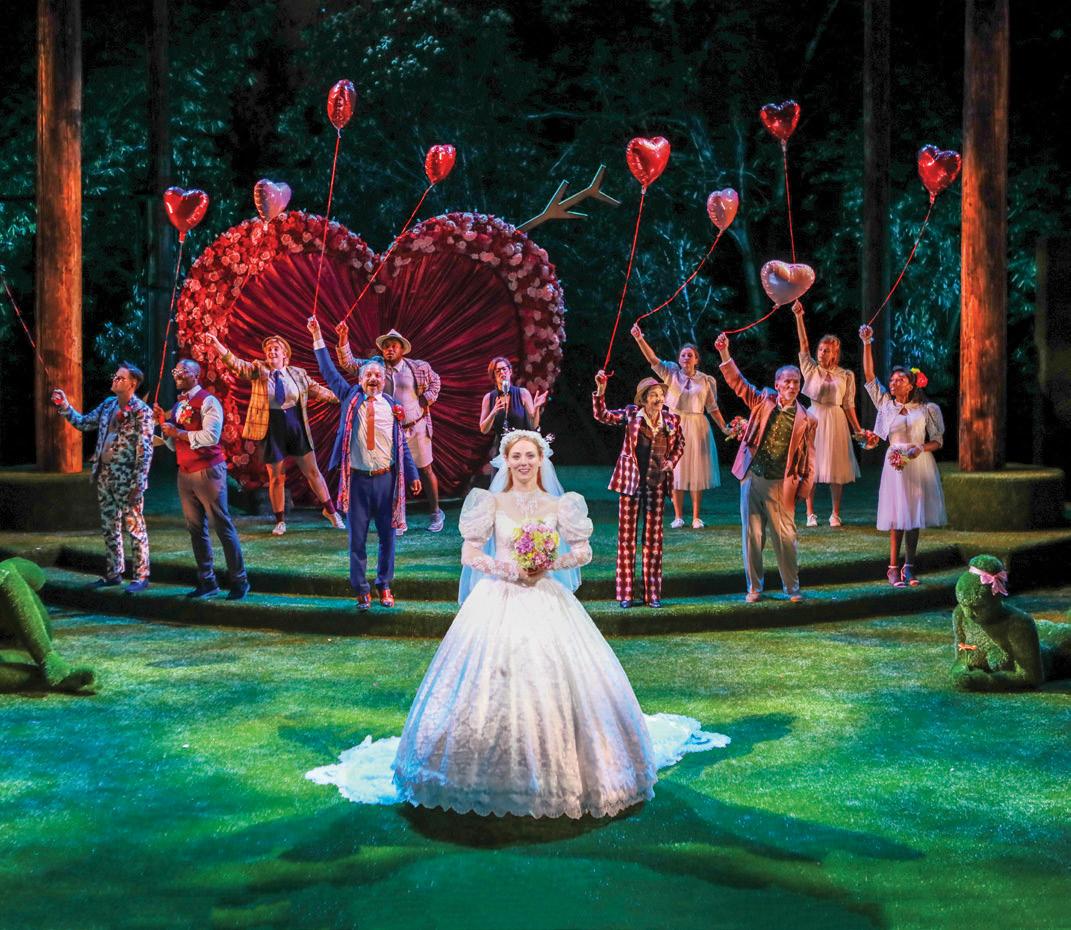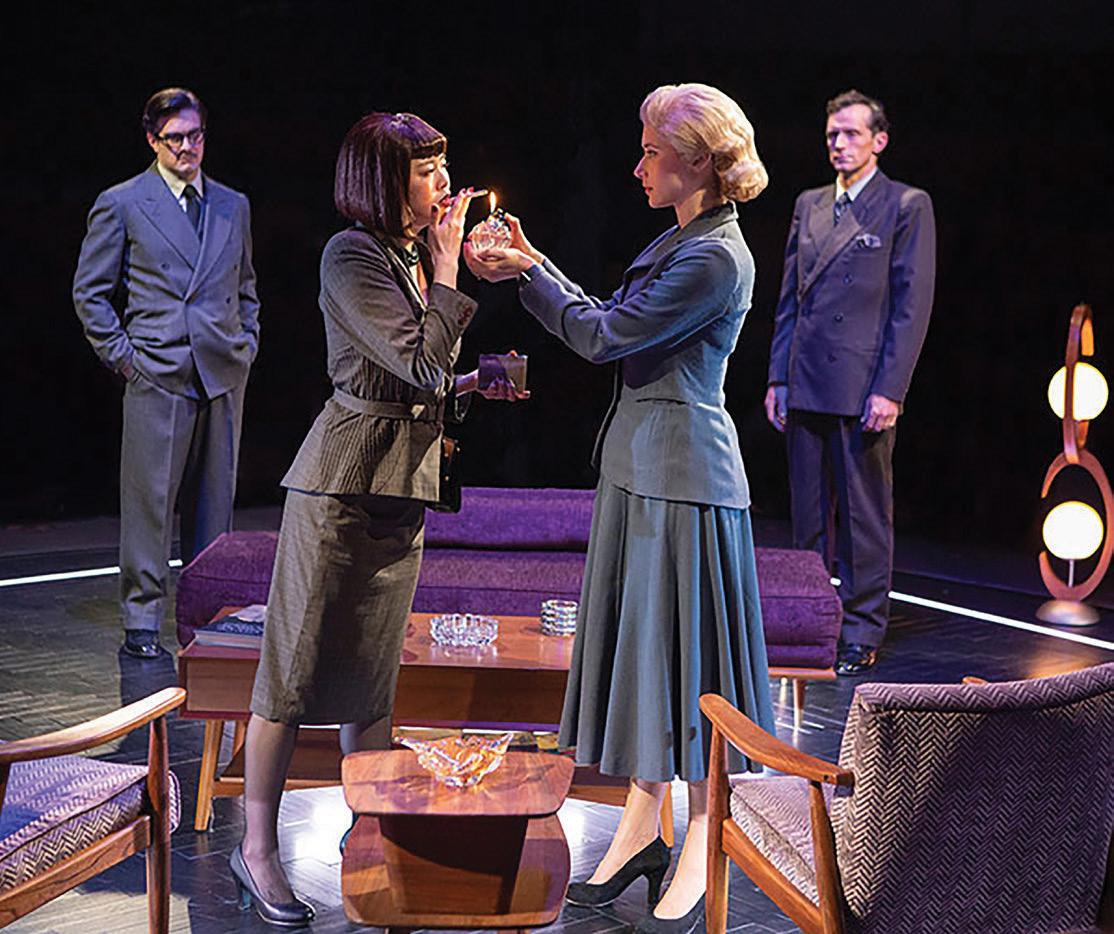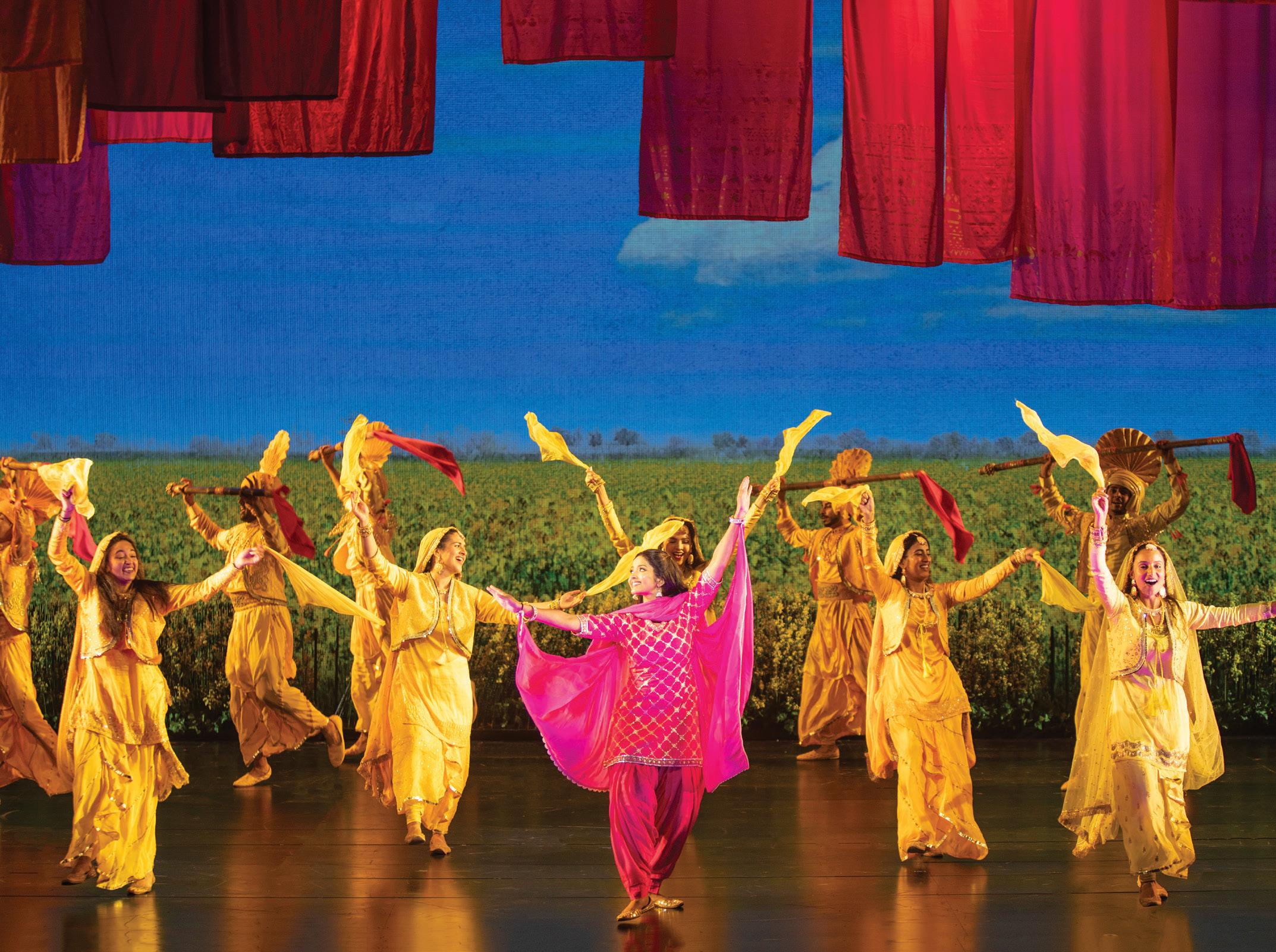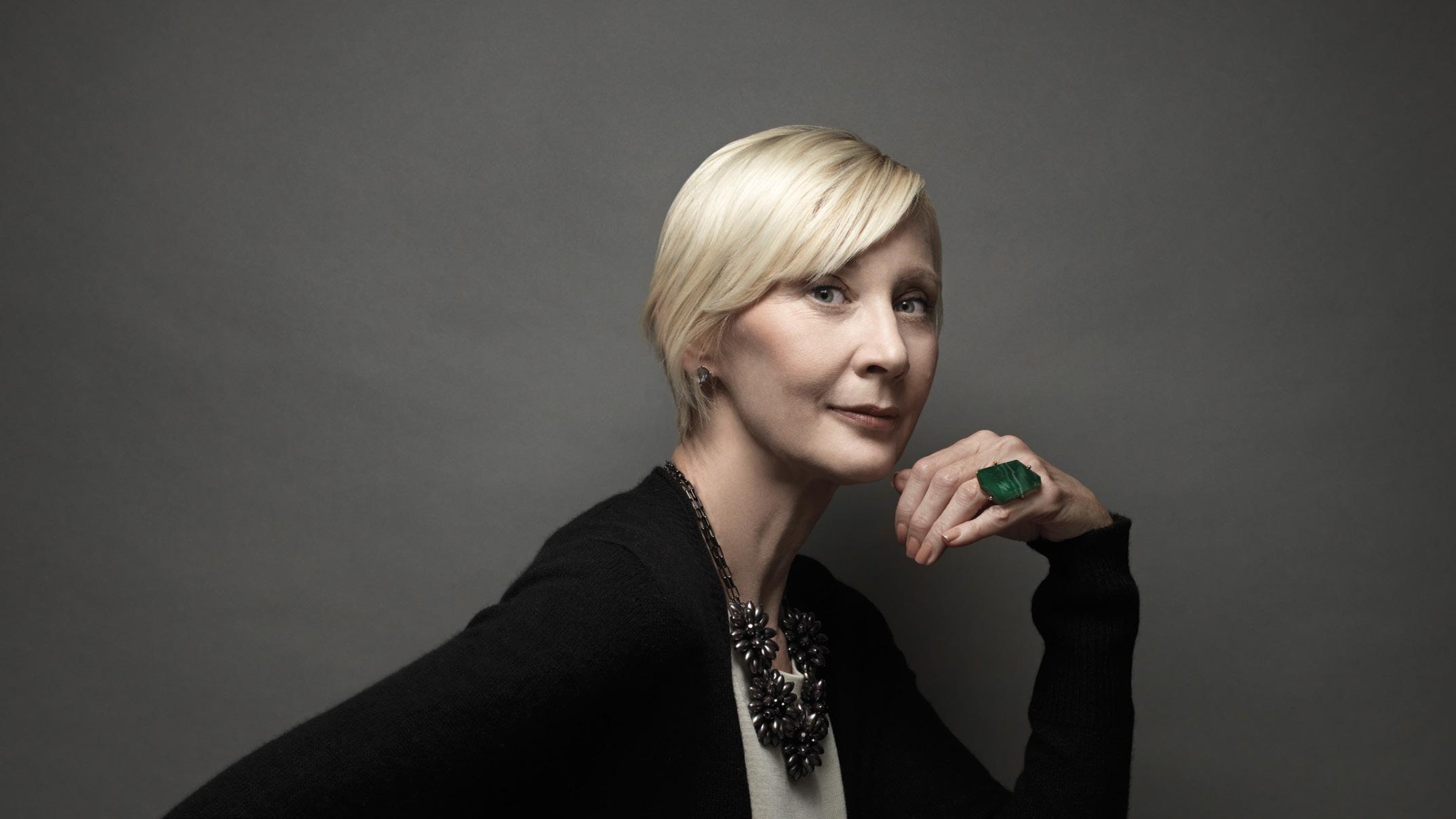






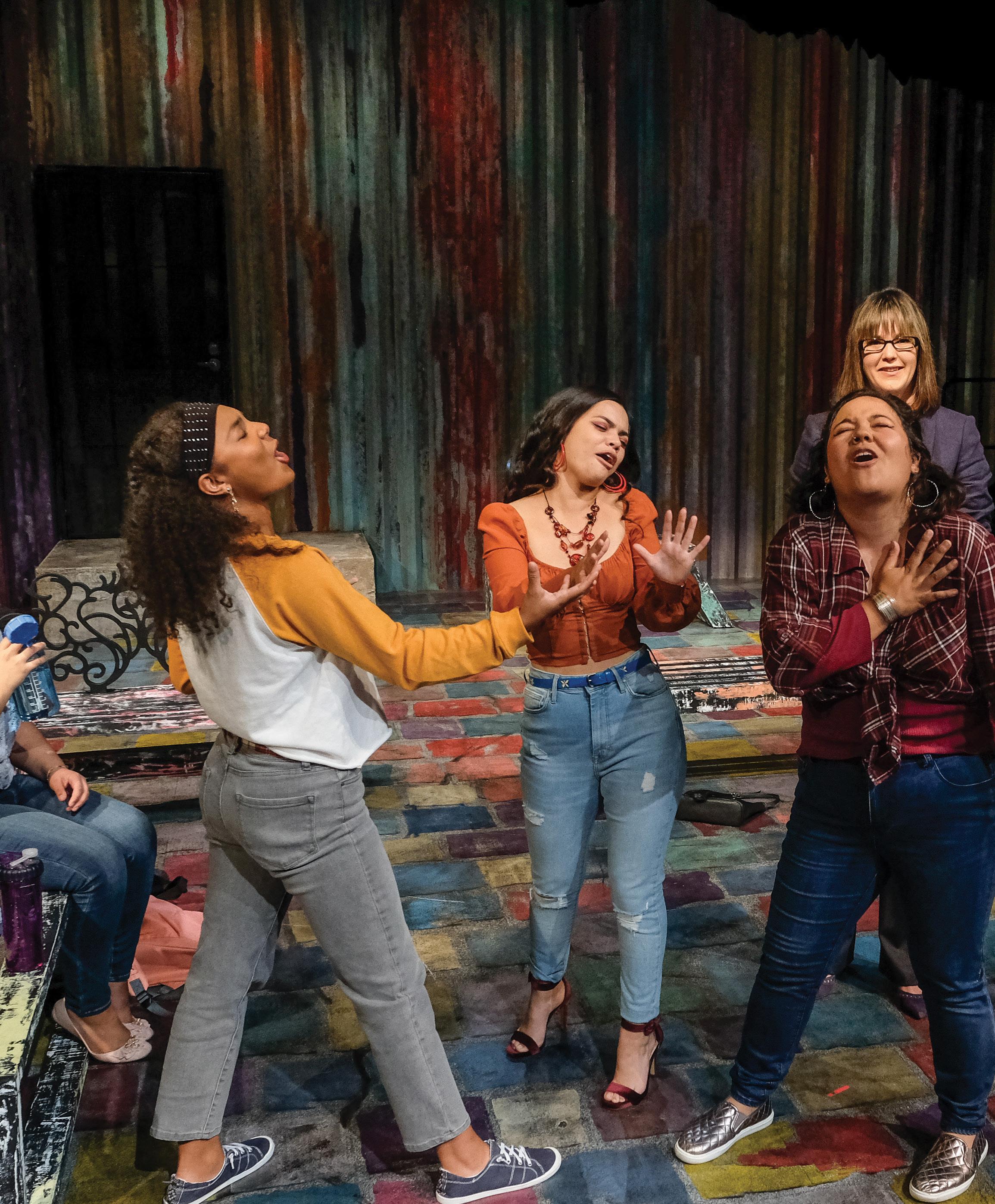
Cast, performances, who’s who, director’s notes, donors and more.
As You Like It at La Jolla Playhouse; San Diego Symphony concerts; local holiday theater; San Diego Jazz Fest & Swing Extravaganza; S.D. Bay Wine & Food Festival; and more.
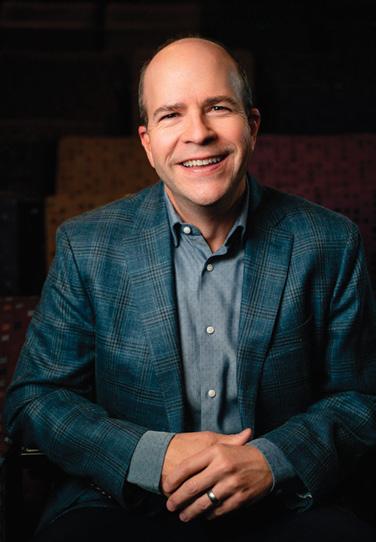
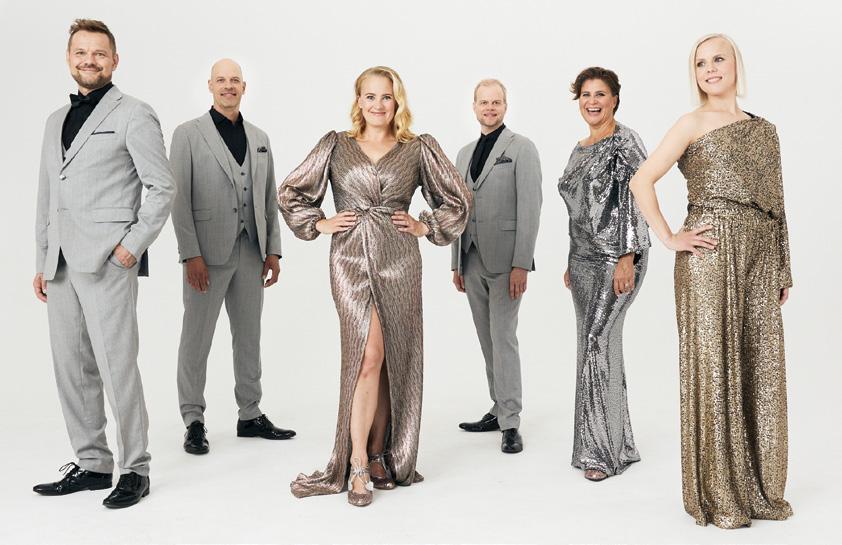
Known locally for Bodhi Tree Concerts’ presentation of it, All Is Calm: The Christmas Truce of 1914 heads to the Big Apple for its New York City Opera premiere.
Notable new San Diego restaurants and watering holes—including Marisi in La Jolla, Sushi Taisho in Carlsbad, and Gordon Ramsay’s Hell’s Kitchen.
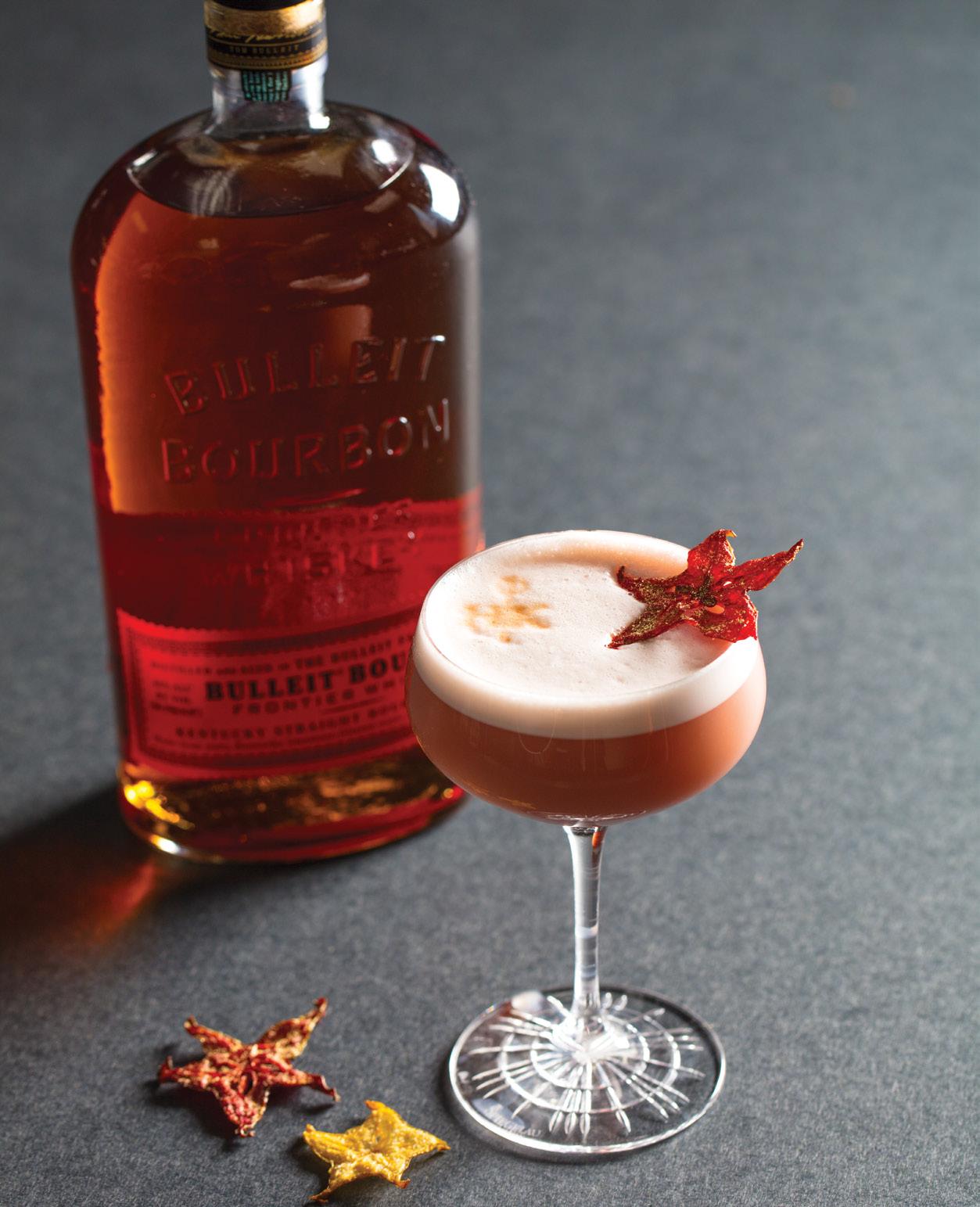
An architecture appreciation moment for the Spreckels Organ Pavilion, designed by Harrison Albright.
PUBLISHER
Jeff Levy
EDITOR Sarah Daoust
ART DIRECTOR Carol Wakano
PRODUCTION MANAGER Glenda Mendez
PRODUCTION ARTIST Diana Gonzalez
CONTRIBUTING WRITER Stephanie Thompson
DIGITAL MANAGER Lorenzo Dela Rama
ADVERTISING DIRECTOR Kerry Baggett
ACCOUNT DIRECTORS Walter Lewis, Jean Greene, Tina Marie Smith
CIRCULATION MANAGER Christine Noriega-Roessler
BUSINESS MANAGER Leanne Killian Riggar
MARKETING/ PRODUCTION MANAGER Dawn Kiko Cheng
Contact Us
ADVERTISING Kerry.Baggett@ CaliforniaMediaGroup.com
WEBSITE Lorenzo.DelaRama@ CaliforniaMediaGroup.com
CIRCULATION Christine.Roessler@ CaliforniaMediaGroup.com
HONORARY PRESIDENT
Ted Levy
For information about advertising and rates contact California Media Group 3679 Motor Ave., Suite 300 Los Angeles, CA 90034 Phone: 310.280.2880 Fax: 310.280.2890
Visit Performances Magazine online at socalpulse.com
Performances Magazine is published by California Media Group to serve performing arts venues throughout the West.
© 2022 California Media Group. All Rights Reserved.
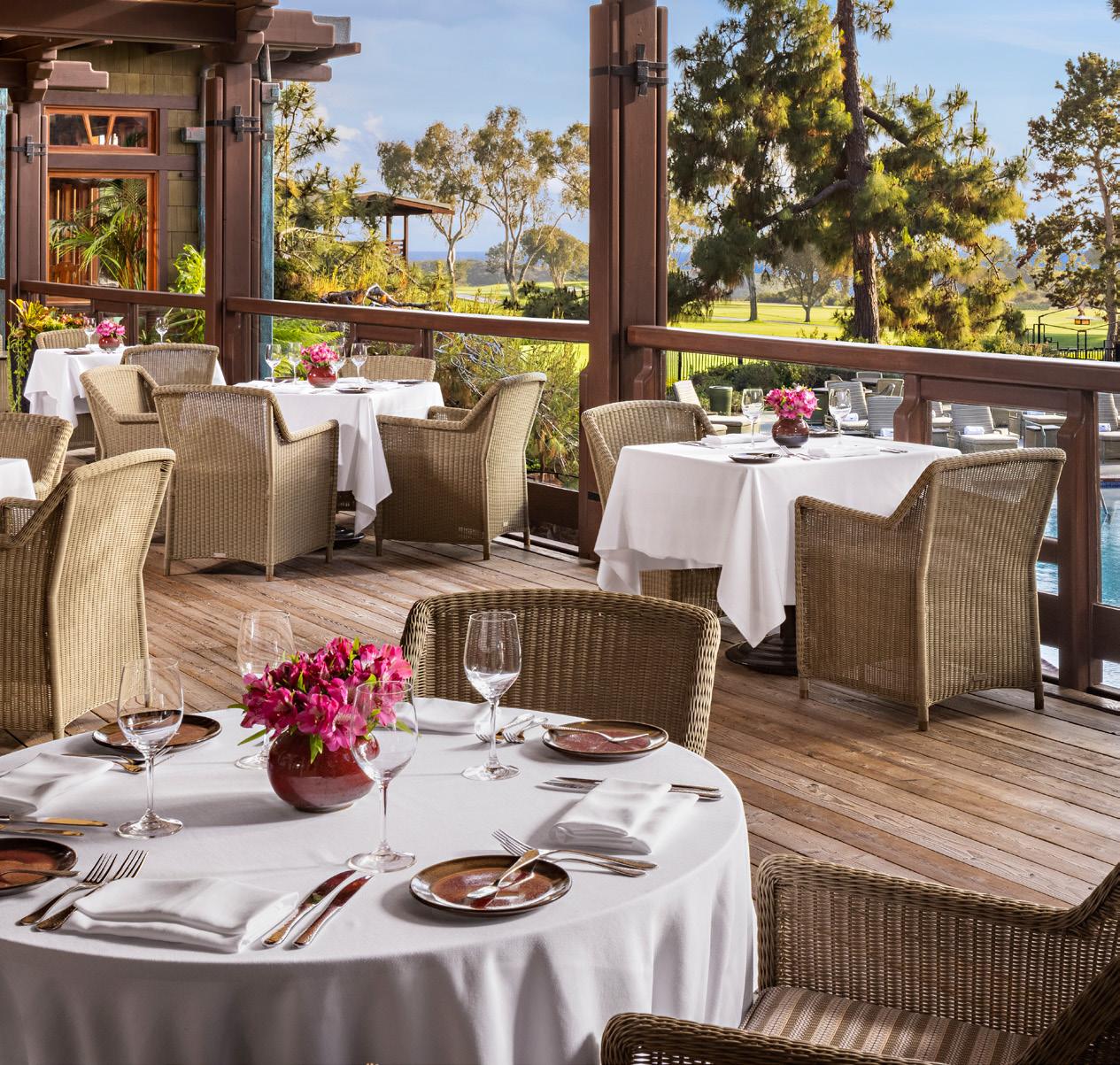

GET INTO THE HOLIDAY spirit with some festive productions this month. The Vienna Boys Choir visits Balboa Theatre on Nov. 19 to perform Christmas in Vienna. The family-friendly concert comprises holiday songs, classical works, Austrian folk songs and more. The Old Globe brings us two favorites: beloved musical Dr. Seuss’ How The Grinch Stole Christmas!, Nov. 9-Dec. 31; and Ebenezer Scrooge’s BIG San Diego Christmas Show, Nov. 18Dec. 24. The latter is a fast-paced, funny reimagining of Charles Dickens’ A Christmas Carol. The usual suspects appear—the ghosts of Christmases Past, Present and Future—but with a comedic twist. (And keep an eye out for some “wintery” San Diego weather.) Cygnet Theatre is also back with its annual holiday production of A Christmas Carol—complete with original music, live sound effects and puppetry—Nov. 22-Dec. 24 at Old Town Theatre.
 RICH SOUBLET
RICH SOUBLET

That time-honored adage, “The Show Must Go On,” takes on new meaning in this endearing and moving comedy set at a small American playhouse in 1942. With the actors and director o at war, a group of passionate women face the daunting challenge of preserving the theatre’s reputation for mounting outstanding Shakespearean productions. Crammed with laughs and an abundance of visual humor, their fierce determination and unbridled enthusiasm will have audiences cheering as they prove that art and community triumph, even in times of peril.
 DIRECTED BY DIANA VAN FOSSEN
DIRECTED BY DIANA VAN FOSSEN
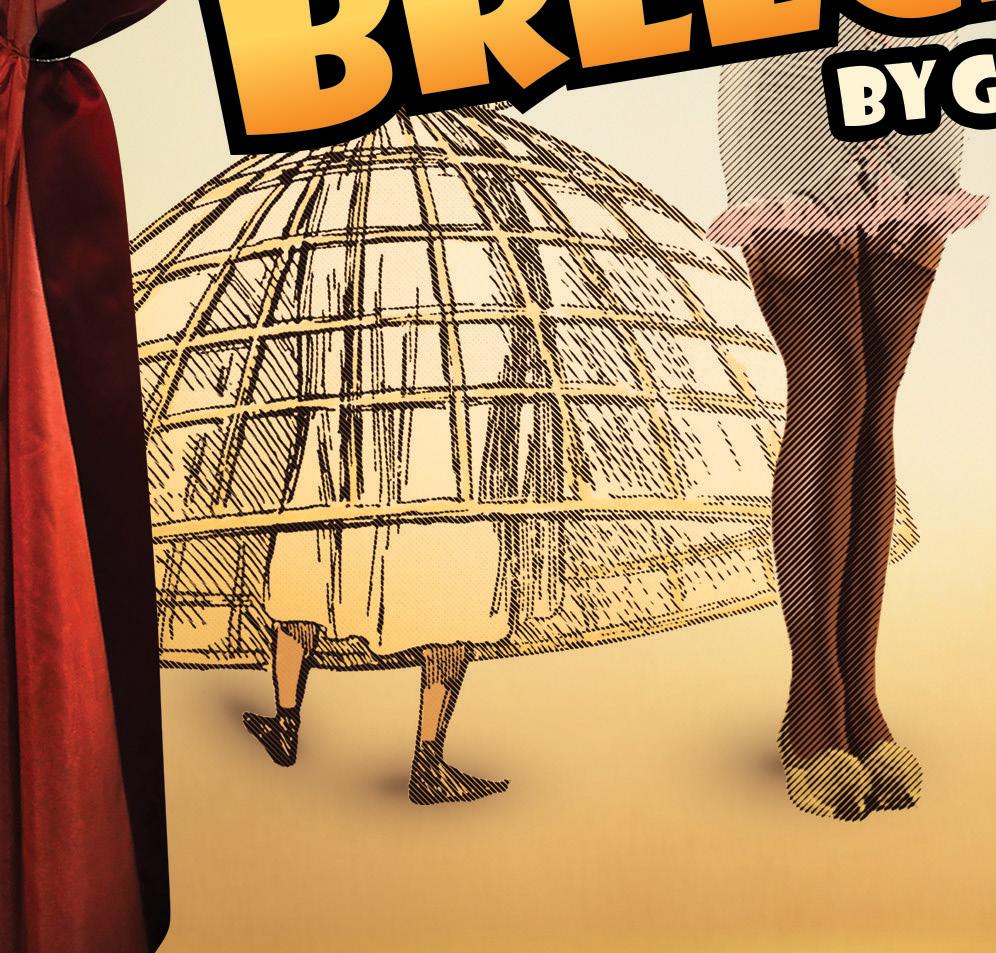
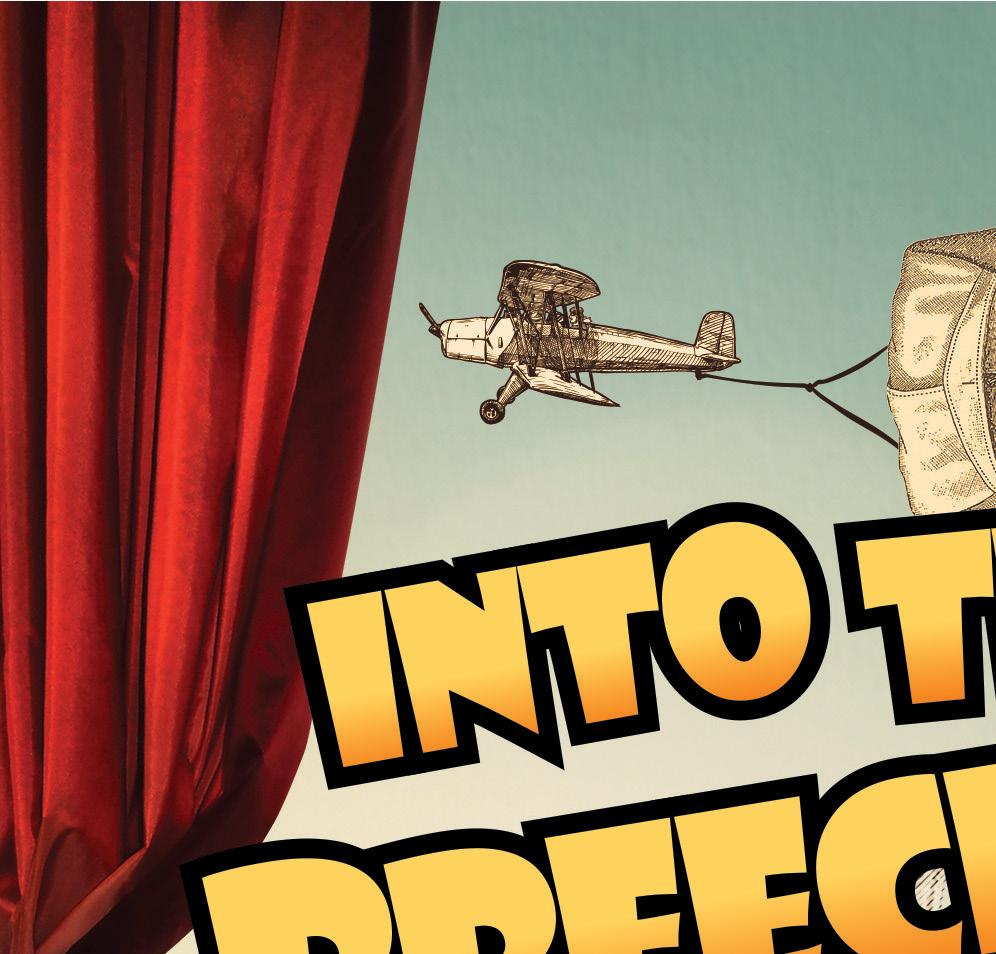 — THE TORONTO STAR
— THE TORONTO STAR
Get ready for an interlude of riotous laughter as Je erson McDonald and Matthew McGloin take us on a musical comedic journey about their would-be careers as concert pianists. The talented duo trade stories about piano lessons, pushy parents, and eccentric teachers while playing everything from Bach to Billy Joel. This wildly popular show not only hits all the right notes, it tickles the ivories and your funny bone too.
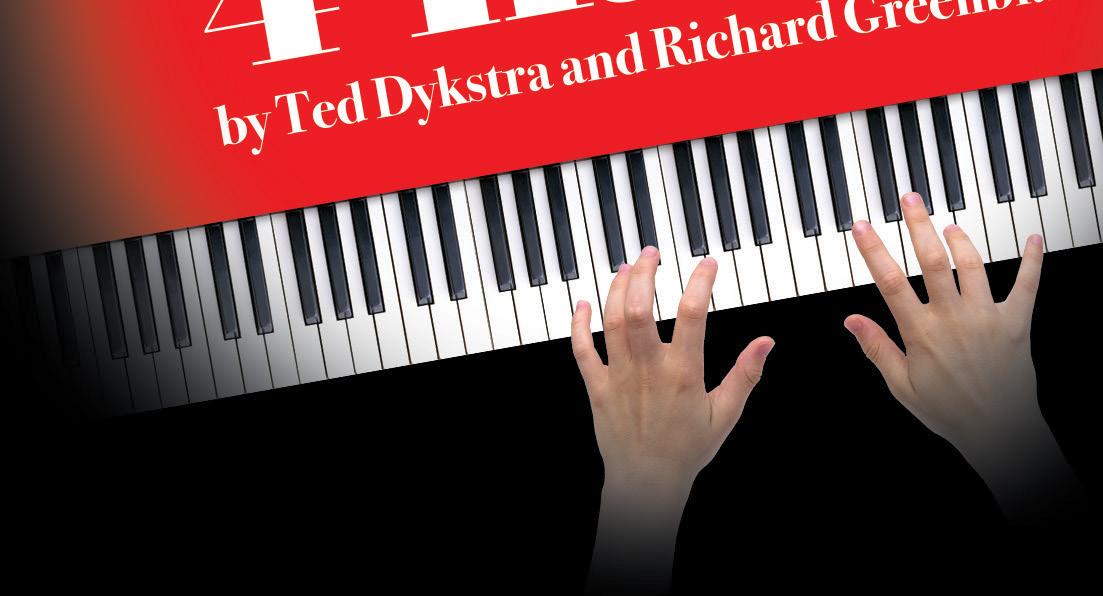
 BY TOM FREY
BY TOM FREY
MUSIC IS IN THE AIR. San Diego Symphony (sandiegosymphony.org) presents myriad concerts this month, beginning with Dancing Queen: A Tribute to ABBA with Rajaton—Nov. 2 at The Rady Shell at Jacobs Park. Pianist Emanuel Ax joins maestro Rafael Payare at The Shell Nov. 12-13. The reper toire includes Beethoven’s Piano Concerto No. 2; and Time by

Thomas Larcher. At The Shell on Nov. 17, Payare conducts Johannes Brahms’ Symphony No. 1 in C Minor, Op. 68; along with Richard Wagner: Prelude & Liebestod from Tristan und Isolde; and Franz Liszt: Concerto No. 2 in A Major. The concert features pianist Marc-André Hamelin; with another performance Nov. 18 at California Center for the Arts, Escondido.
A cappella ensemble Rajaton (top) and pianist Emanuel Ax perform at The Rady Shell at Jacobs Park.
FROM TOP: COURTESY IMAGE; © MARIE MAZZUCCO / SONY CLASSICAL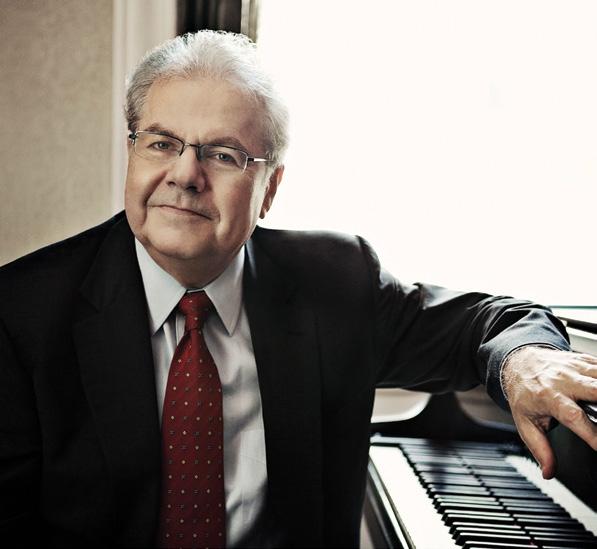
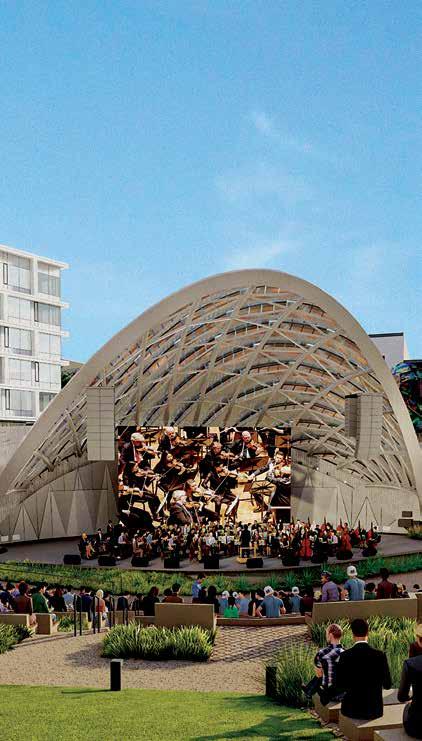

Step right off the UC San Diego Blue Line trolley and into the Epstein Family Amphitheater - your ticket to a new world of art, culture and entertainment. With deep gratitude to Daniel and Phyllis Epstein for facilitating connection, community and a space to gather around a shared love of the arts, this world class performing arts center brings globally-recognized talent to campus and invites a cultural exchange between students, faculty and SoCal residents.
Epstein Family Amphith ea t e r UC San DiegoMOXIE THEATRE PRESENTS the San Diego premiere of The Children, Nov. 6-Dec. 4. Written by Lucy Kirkwood and directed by Kim Strassburger, the “eco thriller” centers on two retired nuclear scientists living in a remote seaside cottage … when an old friend arrives with a terrifying request. Co-directed by Christopher Ashley and Will Davis, Shakespeare’s comedy As You Like It has been reimag ined—playing Nov. 15-Dec. 11 at La Jolla Playhouse. Produced in association with Diversionary Theatre, the timeless tale of the lovestruck Orlando and Rosalind features a cast of trans, non-binary and Queer performers. Based on the famous crime novel, The Hound of the Baskervilles by Sir Arthur Conan Doyle, Lamb’s Players Theatre presents Ken Ludwig’s Baskerville: A Sherlock Holmes Mystery—billed as a “wild, sus penseful and hilarious theatrical adventure,” through Nov. 20.

Born in East Oakland, our Apprentice Lance was a US Marine Corps. Special Teams veteran, a Cordon Bleu graduate, and a budding culinarian, when the unthinkable happened. His family was being threatened and, in a split second, he made the decision to self-sacri ce to protect the lives of his wife and child. Unfortunately, his actions resulted in an 18-year prison sentence.
But no one choice should de ne who you are. “While in prison, I became a certi ed welder, an ordained minister, got my doctorate’s degree in divinity, and saved the lives of ve people (two guards, two sta members and an inmate).” His fortitude compelled a reduction in his sentence from 18 to 12 years. Lance came to Kitchens for Good to pursue his lifelong passion for cooking and take his life forward.
Lance is now working to ful ll his ultimate ambition, “My dream has always been to open a food truck.” Since entering the Kitchens for Good program, he is well on his way. “The program has helped me progress in my skills, my presentation and my speed. I would tell anyone who gets the opportunity to come to Kitchens for Good that you will love it - it’s amazing! You learn a ton and make friends for life.”
Lance found himself in a precarious position that few can fathom the thought of. Yet, he’s made peace with his reality and perseveres towards the path of entrepreneurship with the help of Kitchens for Good. “They continue to give me opportunities and I’m so grateful for that. I just hope I can bring something back to this program and talk to the new class to tell them what [Kitchens for Good] has done for me.”
Lance completed his 10 weeks of skills training and is now working at Hotel del Coronado as a Cook 3.
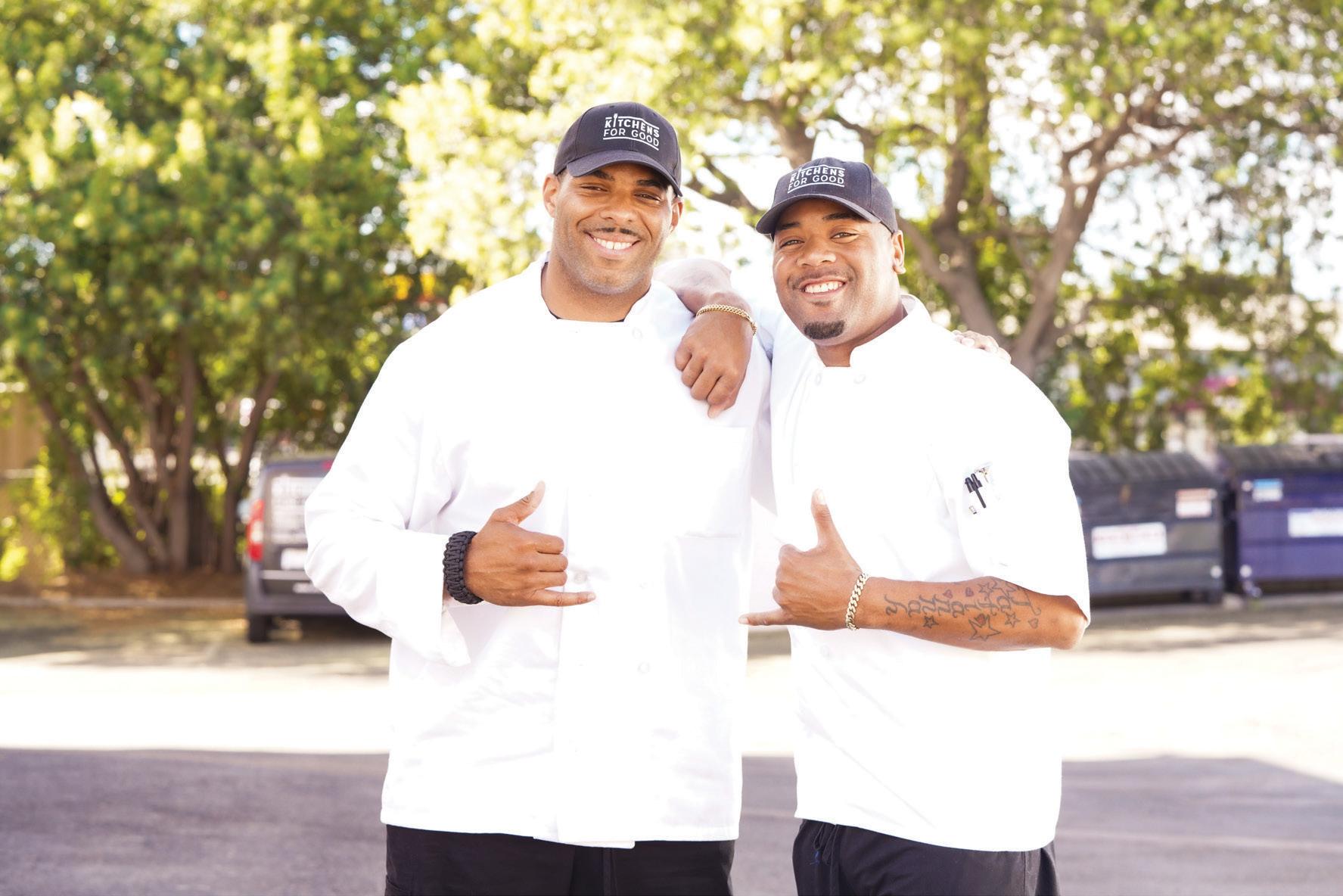
Your support enables us to offer new life opportunities to individuals like Lance. For the 10 weeks of skills training, here’s what your donation can provide for an Apprentice:
for

KITCHENS to 24365 to donate today!
here to

“My dream has always been to open a food truck.”
The High Society Jazz Band, slated to perform at San Diego Jazz Fest; culinary delights at the San Diego Bay Wine & Food Festival.
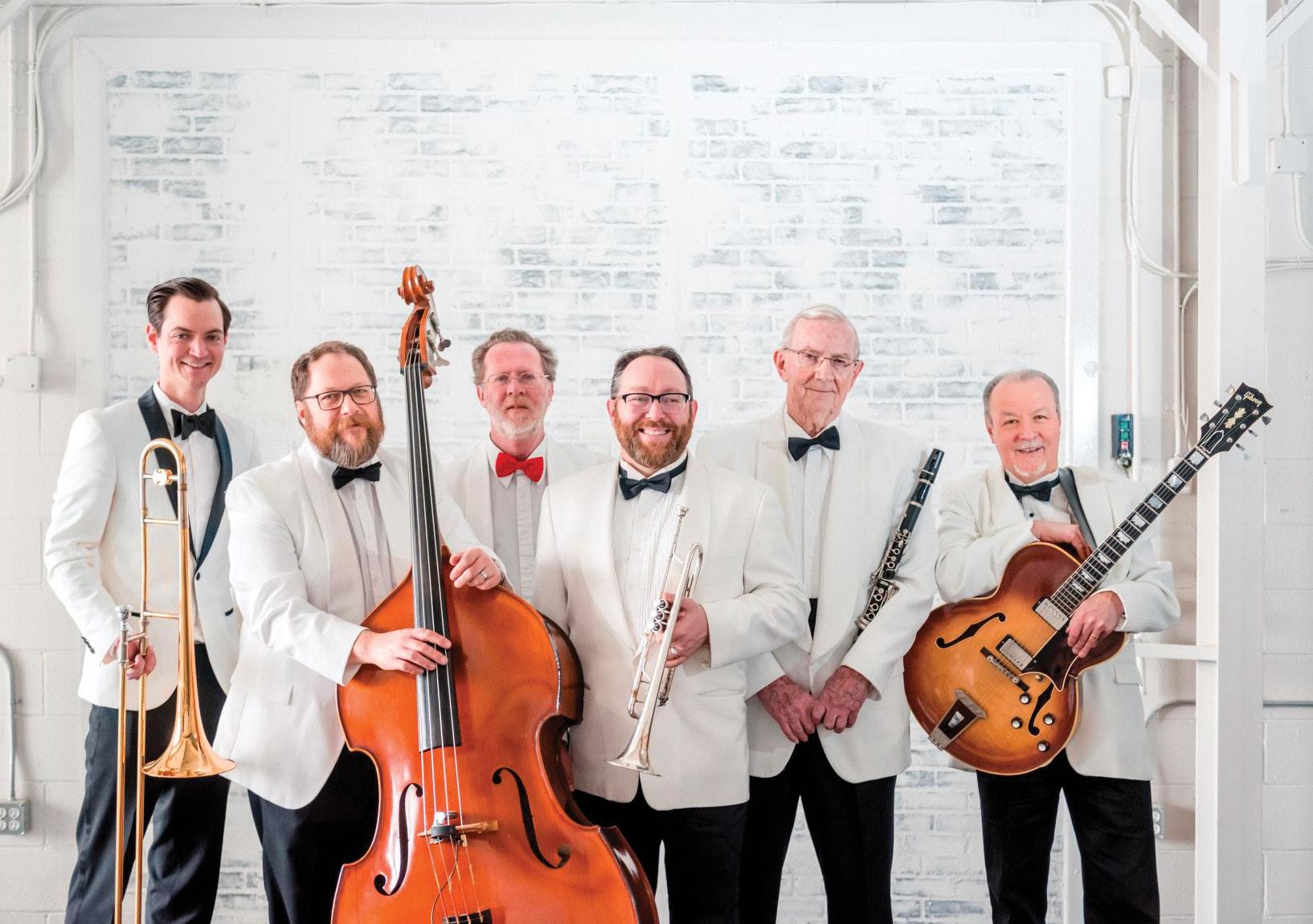

PAYING HOMAGE TO the county’s reign as the craft beer capital, San Diego Beer Week (sdbeer.com) returns for a 10-day festival Nov. 4-13—highlighted by the Guild Fest on Nov. 5 at Surf Sports Park. The San Diego Asian Film Festival (sdaff.org) unfolds Nov. 3-12 at various locations across San Diego County. The 23rd annual event spotlights feature films, shorts and animation from Asian artists worldwide. SoCal’s largest wine and culinary event, the San Diego Bay Wine & Food Festival (sandiegowineclassic.com) runs Nov. 9-13—with dozens of events, hundreds of imbibing purveyors, top area restaurants and celebrity chefs. The 43rd annual San Diego Jazz Fest & Swing Extravaganza (sdjazzfest.org) runs Nov. 23-27 at Town and Country Resort, with nearly 20 bands performing traditional jazz, blues, swing, ragtime, gospel and more.


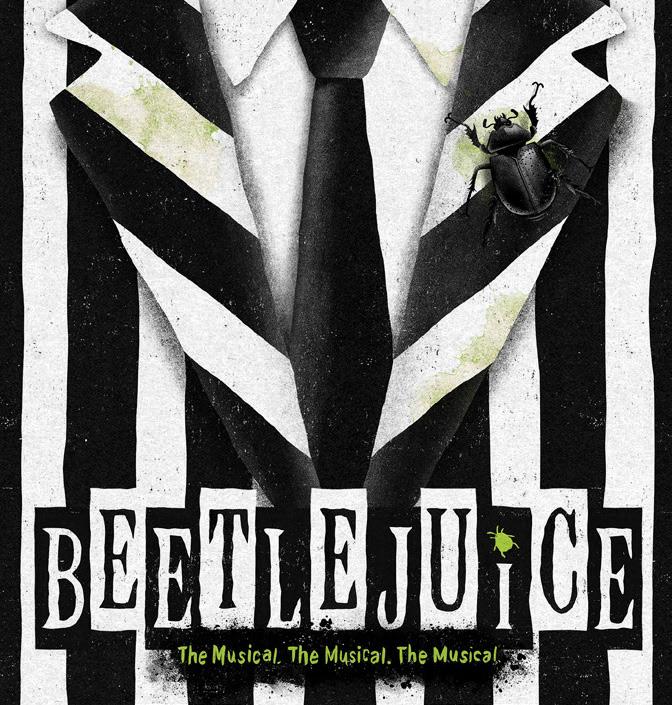
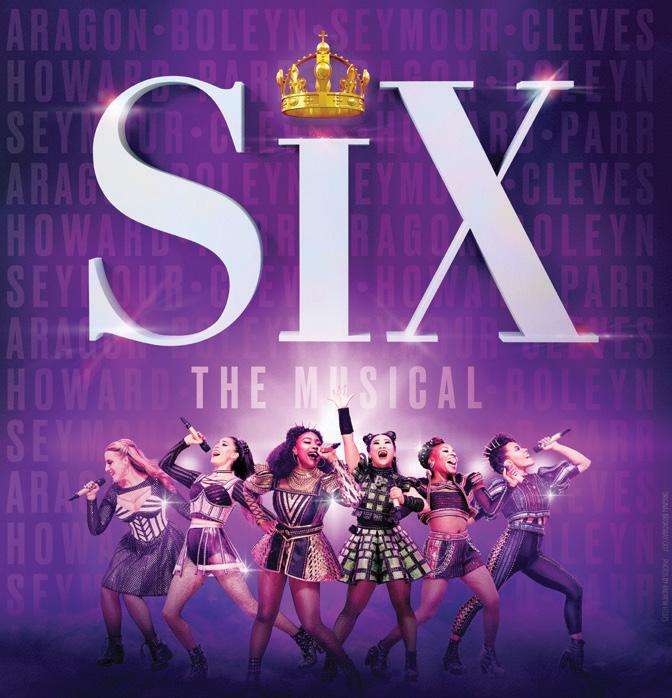
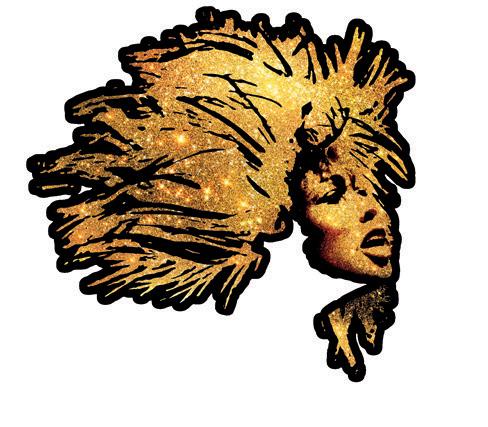


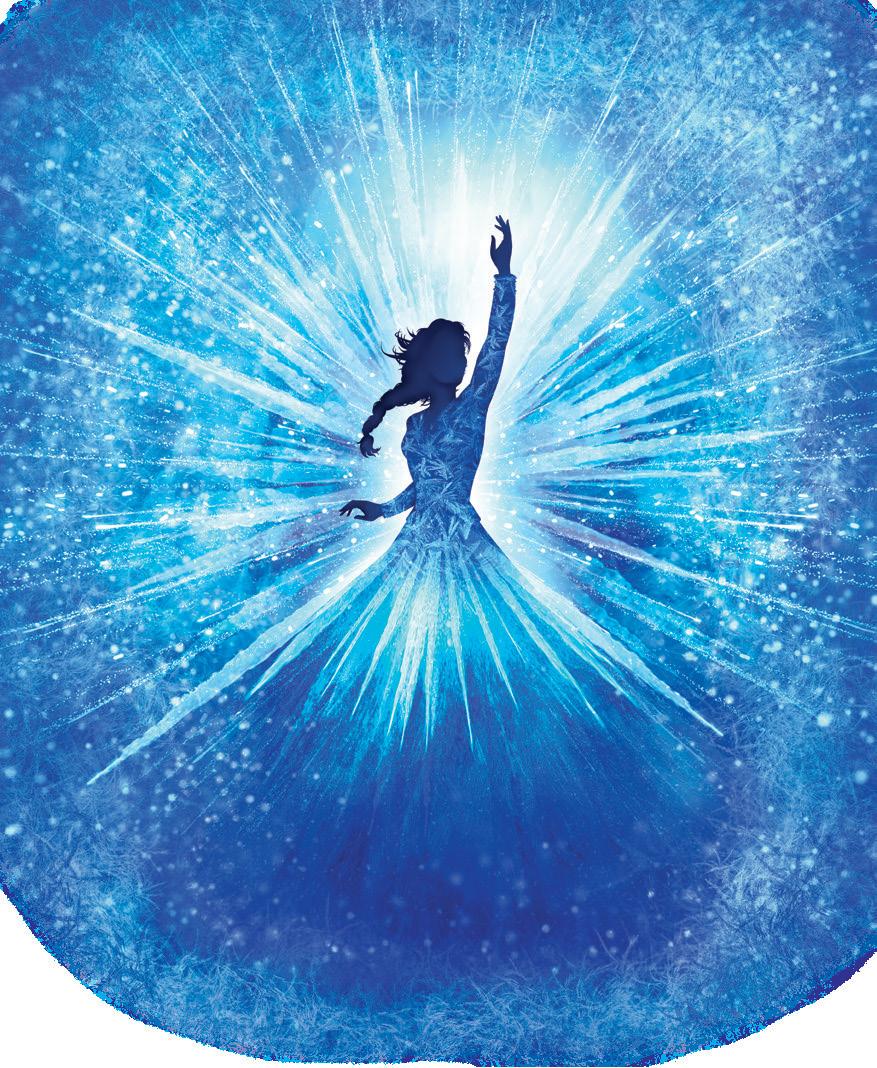

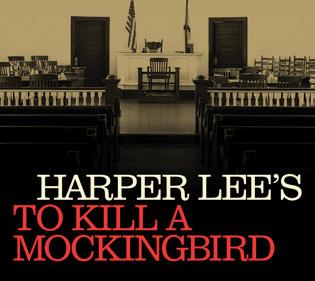

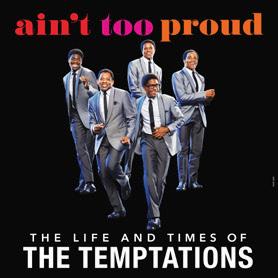

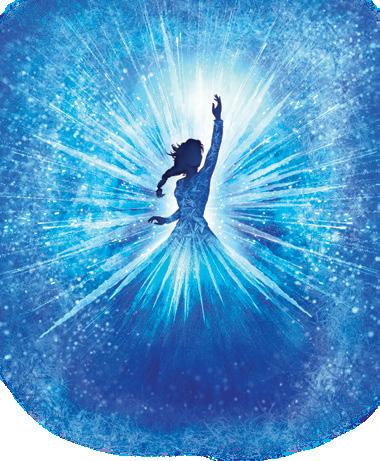

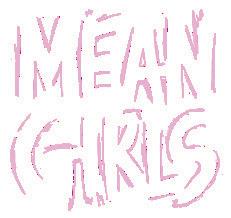
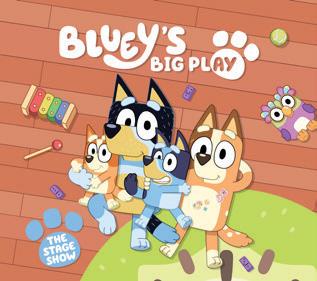

WHEN YOU THINK of beloved holiday classics on the stage, World War I may not be the first setting that comes to mind. “The war to end all wars” didn’t end them, of course, and the images it conjures are hardly pleasant. And yet one true story of shared humanity and the hope for peace survives, inspiring a theatrical choral work that has quietly become one of San Diego audiences’ holiday favorites. This year, its core performers and artistic staff will travel to New York to bring it to new audiences in the greatest theater city in the world.

The show is All Is Calm: The Christmas Truce of 1914, and the company is Bodhi Tree Concerts—whose boldly stated mission is “to per form intentional acts of kindness through music.”
To founders Diana and Walter DuMelle (who also direct the company), this means offering music as a path towards enlightenment and understanding. This is done by programming a diverse slate of concerts each year featuring local artists; and by donating the profits to support charitable organizations. Past beneficiaries include the Immigration Justice Project, Diversionary Theatre, the Seany Foundation, International Rescue Committee, Mama’s Kitchen, Erase Poverty, Knots of Love, Foundation for Women and many more.

All Is Calm: The Christmas Truce of 1914 is an a cappella choral work by Peter Rothstein, with musical arrange ments by Erick Lichte and Timothy C. Takach. It showcases 16 voices (all men) performing choral pieces, solos and spoken



A scene from All Is Calm. Opposite: Peter Rothstein.
word—without instru mental accompaniment. It’s based on real-life events that took place during the Great War along the Western Front. Soldiers from France, England and Germany ventured into no-man’sland on Christmas Eve and Christmas Day to exchange food and gifts and bury their dead. Games of soccer were played, and many encoun ters ended with singing Christmas carols. The truce was unofficial and
unsanctioned, and combat would again resume the next day.
All Is Calm tells the story of this moment of humanity and unity through English, French and German popular songs and Christmas carols of the period; as well as narrated letters written by actual soldiers who served in the war.
Bodhi Tree Concerts’ award-winning production premiered at the Veterans Museum in Balboa Park in 2016, and has become
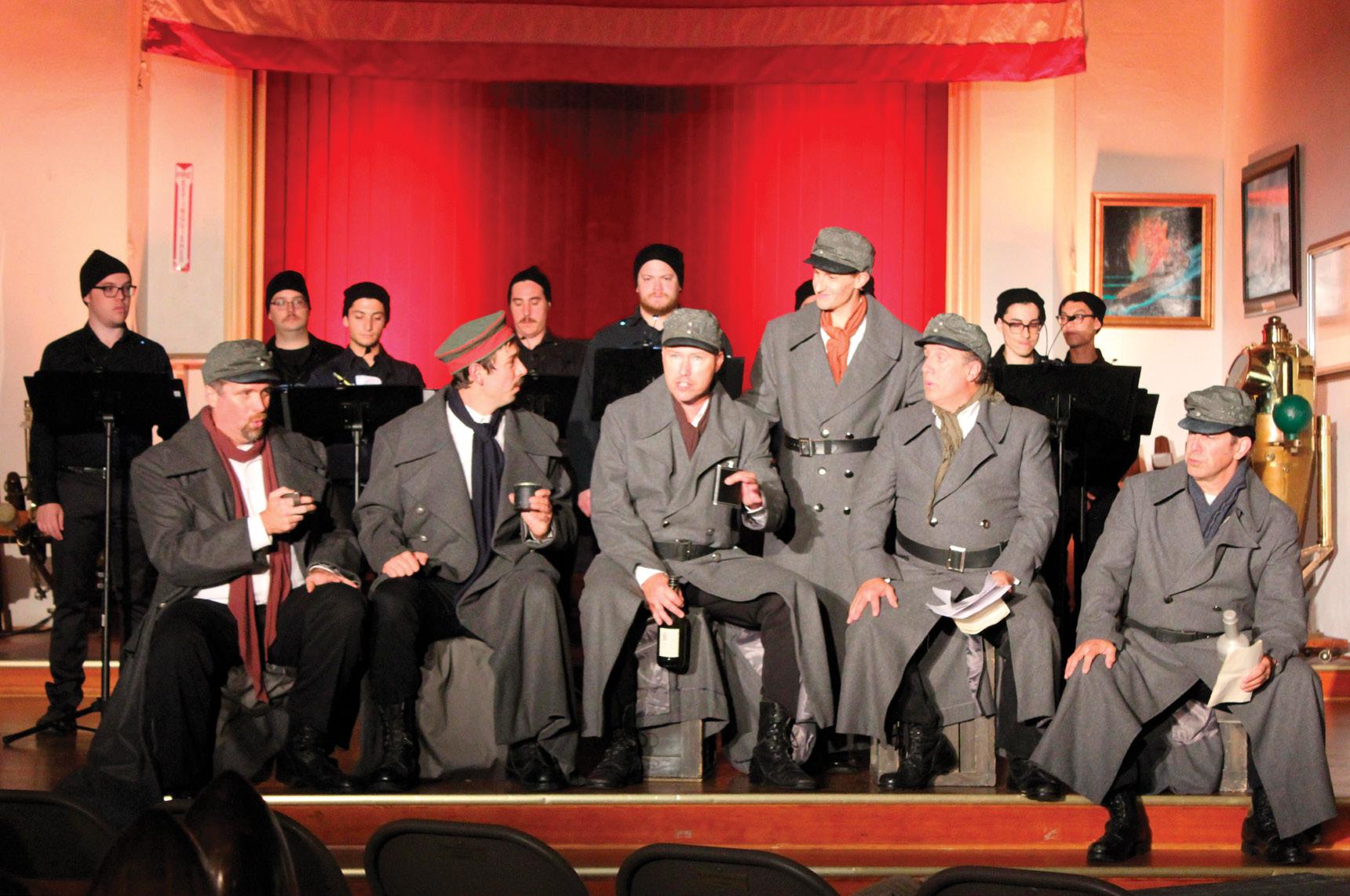
a holiday tradition in San Diego—performed each November since to full houses and beloved by critics and audiences alike. The San Diego UnionTribune has called it “mas terful” and “a powerful tribute to World War I’s forgotten foot soldiers.” Critic Pam Kragen wrote in 2018: “The singing was so serene and hypnotic that the rapt audience barely breathed until the final bows.”
From the plaintive first call of “Will Ye Go
to Flanders?” and the jaunty “It’s a Long Way to Tipperary” and “Pack Up Your Troubles in Your Old Kit Bag;” to the gor geous “O Tannenbaum,” “Silent Night” and “Minuit Chrétien;” All Is Calm paints a vivid picture of the hardships faced by these young men in the trenches. It’s also about the hope that lured them out to greet each other, share food and gifts, kick a soccer ball around, and sing their favorite carols from home. In the end,
it’s estimated that World War I left 20 million dead and 21 million wounded. The Allies lost 5.7 million soldiers; while the Central Powers lost around 4 million. The war’s scars remained gouged into the fields of Belgium and France; as well as the psyches of an entire gen eration of young men.
“I studied World War I in high school and col lege, but I don’t remem ber reading about the Christmas Truce in any of my textbooks,” says Peter Rothstein about conceiving All Is Calm. “If I had, I certainly would have remembered. This extraordinary event took place in 1914, the first year of the war, and it was never repeated. Why did I not learn of it? The propaganda machine of
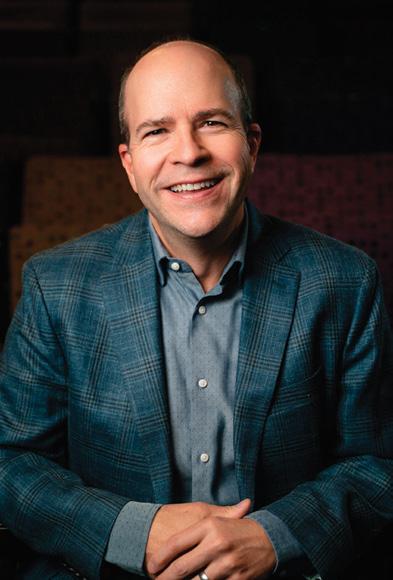
Featuring a cast of trans, non-binary and Queer performers, this re-imagined As You Like It is a celebration of the limitless possibilities of love and humanity.


In Shakespeare’s classic romantic comedy, Rosalind and Orlando meet by chance in court and have an immediate connection. When they are both banished, fate brings them together again in the Forest of Arden. Far from the restrictions of court life, we find ourselves in a vibrant new world, where identities can be fully explored and romance can blossom in multiple forms.
28
 DAVID BENNETT General Director
DAVID BENNETT General Director
Welcome to the world premiere of El último sueño de Frida y Diego. This is only the fourth world premiere in San Diego Opera’s long history. World premieres are very important in defining an opera company’s DNA and San Diego Opera remains at the forefront of expanding the boundaries of opera, while still honoring our art form’s deep traditions.
I hope you have noticed our new logo and tagline: “Every voice tells a story.” This is central to what I’ve been working towards since coming to San Diego Opera – to celebrate the expressive potency of the human voice, and to recognize the responsibility we have to honor and welcome the diverse stories of our community.
I can think of no better way to celebrate this sentiment than with these performances. Frida Kahlo and Diego Rivera are more than artists; they are icons and symbols of Mexican identity and their colorful stories are important to tell. These performances are testament to our commitment in bringing diverse stories, and diverse voices telling these stories, to the San Diego Opera stage.
Presenting a world premiere is a major undertaking. By the time the curtain rises, fifteen years will have passed from the initial meetings between composer Gabriela Lena Frank and librettist Nilo Cruz. During that time, thousands of hours of resources have been poured into creating this opera including support from our cocommissioners San Francisco Opera, Fort Worth Opera, DePauw University School of Music, and The University of Texas at Austin College of Fine Arts as well as generous financial support from our Fall Season Sponsor, The Conrad Prebys Foundation, and our Commission and Production sponsors, Karl and Greet Hostetler.
We’re also incredibly pleased to share all of our stories now with our new bilingual supertitle system. When supertitles were introduced in the 1980s they made opera accessible to greater audiences and with this new development we hope to be able to better serve the community we perform in.
Thank you for being here tonight and sharing this historic moment with us. Enjoy the performance!
David Bennett, General Director
Bienvenidos al estreno mundial de la pera “El último sueño de Frida y Diego”. Durante la larga historia de la compañía de Ópera de San Diego, este es el cuarto estreno mundial que hemos presentado. Los estrenos mundiales son muy importantes para definir la composición de la compañía, es decir su ADN, y la Ópera de San Diego se mantiene a la vanguardia de la expansión de los límites de las obras operísticas de hoy, y al mismo tiempo honra la profunda tradición del arte operístico.
Espero que hayan notado nuestro nuevo logotipo y eslogan: “Cada voz cuenta una historia”. Esto es parte de la columna vertebral de mi trabajo desde que llegué a la Ópera de San Diego, celebrando la potencia expresiva de la voz humana y al reconocer la responsabilidad que tenemos de honrar y dar la bienvenida a las distintas historias de nuestra comunidad.
No puedo pensar en una mejor manera de celebrar este sentimiento ya que con estas presentaciones, Frida Kahlo y Diego Rivera son mucho más que artistas; son íconos y símbolos de la identidad mexicana y es importante contar sus historias coloridas. Estas funciones son testimonio de nuestro compromiso, de compartir historias distintas y voces diversas que cuentan estas historias en el escenario de la Ópera de San Diego.
Presentar un estreno mundial es una empresa importante. Para cuando se levante el telón, habrán pasado quince años desde los encuentros iniciales entre la compositora Gabriela Lena Frank y el libretista Nilo Cruz. Durante ese tiempo, se han invertido miles de horas y de recursos en la creación de esta ópera, incluyendo el apoyo de nuestros socios en la co-comisión: la compañía de Ópera de San Francisco, la Ópera de Fort Worth, la Escuela de Música de la Universidad DePauw y la Facultad de Bellas Artes de la Universidad de Texas en Austin, a su vez damos gracias al generoso apoyo financiero de nuestro patrocinador de la temporada de otoño: la Fundación Conrad Prebys y nuestros patrocinadores en la comisión y la producción, Karl y Greet Hostetler.
Ahora con nuestro nuevo sistema de subtítulos bilingües estamos increíblemente complacidos de compartir todas nuestras historias con este nuevo sistema de subtítulos.
En la década de los ochenta, se empezaron a utilizar los subtítulos e hicieron que la ópera fuera mucho más accesible a un público más amplio, con este nuevo desarrollo esperamos poder servir mejor a la comunidad a la que representamos.
Gracias por estar aquí esta noche y compartir este momento histórico con nosotros. ¡Disfruten de la función!
San Diego Opera is proud to have The Conrad Prebys Foundation as our Fall Season Sponsor. Mr. Prebys was a dear friend, ardent supporter, and distinguished guest at many of our performances over the years.

Conrad Prebys moved from Indiana to California with $500 in his pocket and a dream. Over the following decades, he built a real estate empire as one of the largest private owners of residential multi-family properties in San Diego County. In his later years, he became dedicated to the community through charities, donating over $350 million to organizations devoted to healthcare, medical research, visual and performing arts, higher education, youth development, and more. To ensure that his vision extended beyond his lifetime, Mr. Prebys created The Conrad Prebys Foundation to perpetuate his commitment to philanthropic endeavors in San Diego. Since its inception, The Foundation has made grants totaling more than $145 million.
San Diego Opera’s Fall Season aims to honor the spirit of inspiration that Mr. Prebys sought from the performing arts. We are excited for our partnership as The Conrad Prebys Foundation continues its journey of transformational philanthropy for the San Diego region.
Greet and Karl Hostetler’s love for vocal music has led them to support San Diego Opera’s new co-commission, El último sueño de Frida y Diego. Greet and Karl met in the Netherlands while singing in a choir 50 years ago. At that time, they never imagined they would still be singing and supporting opera together decades later.

Born in the Netherlands, Greet was an elementary school teacher who did choral singing in teachers college. Karl was born in Indiana and attended medical school in Cleveland. He briefly studied voice at the Cleveland Institute of Music, auditioned for the Cleveland Orchestra chorus and got in! He sang under Robert Shaw, Pierre Boulez, and Margaret Hillis, to mention a few.
Karl works at UCSD in antiviral drug discovery and was the founder or cofounder of four biotech companies. His parents were singers, and his brother is a blues singer and composer. While in the Netherlands for postdoctoral research, Karl wanted to continue singing and was admitted by the director of the Amsterdam Concertgebouw choir. Greet and Karl met at the Concertgebouw rehearsals and the spark and magic that led to a longtime marriage and mutual love for vocal music began! During their Concertgebouw years, the chorus recorded Mahler’s 8th Symphony with Deutsche Gramophone under Sir Colin Davis. They also sang J.S. Bach’s St Matthew Passion traditionally sung during Eastertime in the Netherlands.
After moving to California, they joined the Rancho Santa Fe Village Church choir and sang works such as the Fauré Requiem and Vivaldi’s Gloria. In 1980, someone offered Greet a pair of tickets for La Bohème. Surprised that Greet had accepted the invitation, Karl asked her if she liked opera. They laugh as they recall that Greet answered, “Yes, of course.” Karl replied, “I like opera too!” When they attended La Bohème, Pavarotti was singing the role of Rodolfo! They sat way back in the upper balcony. “Those were a couple of Golden tickets!” Karl recalls.
From that moment on, they became San Diego Opera subscribers, their seats gradually moving down like a descending scale, step by step until they sat in the first row. While Karl and Greet like the Verdi and Puccini opera classics, they are supporting El último sueño de Frida y Diego because they feel that commissioning a new work based on the lives of Frida Kahlo and Diego Rivera is a fantastic opportunity, supports important young composers and fosters new audience development. Seeing new operas and encouraging new works gives them hope for advancing the artform for future generations to enjoy.
KARL AND GREET HOSTETLER FROM A COUPLE OF GOLDEN TICKETS IN THE UPPER BALCONY TO SPONSORSHIP OF A NEW OPERAKarl and Greet Hostetler
Mexican-born painters Frida Kahlo and Diego Rivera within a fantastical landscape inspired by Día de los Muertos (Day of the Dead) is the premise of this new opera that I’ve been privileged to compose. In some ways, I’ve been living with these two iconic artists, especially Frida, from my youth growing up in the 1970s in Berkeley, California. Before I could read, I found Frida in the pages of an art book in my mother’s home library, the only woman in a multi-volume set of “great artists.” My mother pointed out how Frida was small, brown and creative like us; moreover, of thick brow, disabled and a daughter of both Europe and Latin America like me. Images of her paintings danced in my dreams for years, both the joyful and the haunting, and as I matured and understood more of Frida’s very human biography, she took on a heroic status for me.
It has also been remarkable for me to watch how Frida’s popularity soared in recent decades, her story and artistic legacy clearly touching a cultural nerve. With this libretto by my long-time collaborator, Nilo Cruz, I’ve been able to lose myself in the imagined story exploring Frida’s tumultuous love affair, even beyond life itself with Diego. In honoring the wonderful narrative, including the surprising appearance of other principal characters such as Catrina, the Keeper of the Souls with immense power over the souls of the underworld, and Leonardo, a young actor in the underworld, my task has been to create colorful and characterful music befitting multiple planes of existence – the world of the living, the world of the dead, and briefly, an especially poignant world of Art.
Through these three planes, we witness how Diego, at the end of his life, and Frida, deceased for several years, gradually move towards reunion, reconciling through a recognition of their shared past and a hoped-for shared future. Throughout their journey, the chorus provides a rich array of underworld spirits and living villagers as participants and commentators; the orchestration ranges from chamber to full ensemble.
Los pintores mexicanos Frida Kahlo y Diego Rivera junto con un fantástico espectáculo inspirado por el Dia de los Muertos son el tema de esta nueva ópera que he tenido el privilegio de componer. De alguna manera he estado viviendo con estos dos emblemáticos artistas, especialmente Frida, desde mi juventud en Berkeley, California en 1970 donde crecí. Antes de que pudiera leer, encontré a Frida en las páginas de un libro de arte en la biblioteca de la casa de mi madre, era la única mujer en unos volúmenes múltiples de “grandes artistas”. Mi madre me hizo ver como Frida era de baja estatura, morena y creativa como nosotros; además tenía la ceja gruesa, era inválida e hija de ambos Europa y Latinoamérica como yo. Las imágenes de sus pinturas danzaron en mis sueños por años, tanto las alegres como los espectros y cuando maduré y entendí más, en gran medida lo humano de la biografía de Frida, ella tomó una condición de heroína para mí.
También ha sido notable para mi ver como la popularidad de Frida se ha incrementado en décadas recientes, su historia y su legado artístico claramente han tocado fibras sensibles culturalmente. Con este libreto de mi colaborador de toda la vida, Nilo Cruz, he podido perderme en esta historia imaginaria que explora la turbulenta aventura amorosa de Frida, aún más allá de la vida misma con Diego. Honrando la maravillosa narrativa, incluyendo la sorprendente aparición de otros personajes principales tales como la Catrina, el Guardián de las Almas, con un tremendo poder sobre las almas del inframundo, y Leonardo, un joven actor del inframundo, mi tarea ha sido el crear música con un colorido y con una gran personalidad apropiada para múltiples planos de existencia – el mundo de los vivos, el mundo de los muertos, y en pocas palabras sobre todo el emotivo mundo del Arte.
A través de estos tres planos, somos testigos de cómo Diego, al final de su vida, y Frida, después de varios años de haber fallecido, poco a poco se van acercando y reuniéndose, reconciliándose a través de reconocer el pasado que compartieron y la esperanza de compartir el futuro. A lo largo del su viaje, el coro nos aporta una rica variedad de espíritus del inframundo y de aldeanos vivientes como participantes y comentaristas; la orquestación va desde música de cámara hasta un ensamble completo.
Frida and Diego are the most prominent artistic icons of Mexican culture. They created some of the most fascinating works of art in the 20th Century. Frida Kahlo is one of very few artists whose work is immediately recognizable. Diego is the father of Mexican Muralism, the first artistic movement the Americas gave to the world. They were extraordinary artists with extraordinary lives and a unique love story. Frida and Diego created a whole universe for themselves: with their art, their passions, their houses, their love affairs, their collections, the way they dressed, their social and political ideals, and their love for each other. Every aspect of their lives was connected and truly represented who they were. Art and life were the same. They shared everything important to them, their love for Mexico and its indigenous past, popular art, political and social activism, and aesthetic tastes. They both painted the Mexican visual identity at its core, and helped us remember who we were and created a vision of how we wanted to be. It all came together in a unique, multidimensional, multicultural universe that translated into a personal, intense, breathtaking, and provocative art. Their art is so personal and unique that it becomes universal. It’s a beautiful paradox. They live on because of that uniqueness. It’s profoundly appealing because we can recognize ourselves in the passion, the pain, and the beauty of what they created.
These two characters exist as icons, as artists, as a couple, and as individual human beings. But they also belong to the imagination. The Last Dream of Frida and Diego allows us to imagine them again, recreate part of that universe, and have a last encounter. This is a perfect story for an opera. It’s about love, pain, art, death, passion, politics, sex, gender, diversity, and disability. It’s multilayered and multidimensional, as its characters, but in the end, it is a love story. It talks about love beyond life, a journey from the underworld and back; it’s about passion for art and finding identity through art, about forgiveness, and surrender. This story is also a dream, Diego’s and Frida’s dream of a last encounter with each other and art. It happens on Día de Muertos, and Diego’s last day on earth. The context is enormous and couldn’t be more dramatic. Our challenge in this production is to create a unique universe that conveys the main symbols, gestures and imagery of their iconography and their lives, in a very symbolic and depurated style, avoiding textual reproductions and the usual interpretation of
Frida y Diego son los íconos artísticos más destacados de la cultura mexicana. Crearon algunas de las obras de arte más fascinantes del siglo XX. Frida Kahlo es una de las pocas artistas cuyo trabajo es inmediatamente reconocible. Diego es uno de los padres del Muralismo Mexicano, el primer movimiento artístico que América dio al mundo. Eran artistas extraordinarios con vidas extraordinarias y una historia de amor única. Frida y Diego crearon todo un universo para ellos: con su arte, sus pasiones, sus casas, sus amores, sus colecciones, su forma de vestir, sus ideales sociales y políticos y el amor que sentían el uno por el otro. Cada aspecto de sus vidas estaba conectado y realmente representaba quiénes eran. El arte y la vida eran lo mismo.
Compartieron todo lo importante para ellos, su amor por México y su pasado indígena, el arte popular, el activismo político y social y los gustos estéticos. Ambos pintaron la identidad visual mexicana en su esencia y nos ayudaron a recordar quiénes éramos y crearon una visión de cómo queríamos ser. Todo se unió en un universo único, multidimensional y multicultural que se tradujo en un arte personal, intenso, impresionante y provocador. Su arte es tan personal y único que se vuelve universal. Es una hermosa paradoja. Viven debido a esa singularidad. Es profundamente seductor porque podemos reconocernos en la pasión, el dolor y la belleza de lo que crearon.
Estos dos personajes existen como íconos, como artistas, como pareja y como seres humanos individuales. Pero también pertenecen a la imaginación. El Último Sueño de Frida y Diego nos permite volver a imaginarlos, recrear parte de ese universo y tener un último encuentro. Esta es una historia perfecta para una ópera. Se trata de amor, dolor, arte, muerte, pasión, política, sexo, género, diversidad y discapacidad. Tiene muchas capas y es multidimensional, como sus personajes, pero al final, es una historia de amor. Habla del amor más allá de la vida, de un viaje de ida y vuelta al inframundo; se trata de la pasión por el arte y de encontrar la propia identidad a través del arte, tambien del perdón y la entrega. Esta historia es también un sueño, el sueño de Diego y Frida de un último encuentro entre ellos y el arte. Sucede en el Día de Muertos, y el último día de Diego en la tierra. El contexto es enorme y no podría ser más dramático. Nuestro reto en esta producción es crear un universo único que transmita los principales símbolos, gestos e imágenes de su iconografía y de sus vidas, en un estilo muy simbólico
Frida Kahlo and Diego Rivera have achieved quasi-god-like status in Mexican culture. I grew up in Mexico City where their artwork, images of their artwork, and references to their involvement in the plight of all Mexicans during their lifetime was ever-present. I must have visited the famous Casa Azul half a dozen times as a teenager; always shocked at the bullet holes on the walls of Trotsky’s lodgings, and his eerie office room (left unchanged) where he was bludgeoned by a pickaxe to the skull by a secret Soviet agent.
Trotsky doesn’t appear in El último sueño de Frida y Diego, nor do the usual suspects of Frida Kahlo plays, movies, stories, and operas. This is a story that exists only partly in this world. Nilo Cruz has written a profound and magical libretto, that begins the story near the end of Diego’s life, once Frida is in the beyond. He has written poetically, yet has also colored the text with timeless, and sometimes comedic Mexican sayings and idioms. Frida and Diego’s journey of re-encountering is a surreal look into limbo, yet, not one we are used to. Pre-Hispanic elements abound in the story, and it blends the folklore of Mexican colonialism with its pre-Hispanic roots.
Gabriela Lena Frank is one of our foremost living composers. She possesses an absolute mastery of orchestration, choral writing, and solo vocal writing. If she had not told me this was her first opera, I would have thought it her tenth. The sound world of the piece is unique: it draws and reminds at times of spectralism, folklore, impressionism, late romanticism, yet she truly possesses a style and sound of her own. The piece flows from explosive choral climaxes, to dulcet duets, swaying marimba clave rhythms, and even an ancient sounding plea to the god Mictlān. Eventually, the souls of Frida and Diego travel together to the underworld, the chiming bells, the softening strings: the last sounds we hear, pulsating through space.
San Diego Opera has gathered a superb cast that will be accompanied by the incredible musicians of the San Diego Symphony, and the San Diego Opera chorus. I feel particularly privileged, not only to lead these fine musicians on a subject that is close to my heart, but also because I believe that this is one of the most exciting world premieres to have graced the opera theater in recent memory. I very much hope you enjoy it. See you at the opera!
Frida Kahlo y Diego Rivera han logrado tener un nivel de cuasi dioses en la cultura mexicana. Yo crecí en la ciudad de México, en donde su arte, las imagines de sus obras, y las referencias de la forma en que se involucraron en los problemas de todos los mexicanos durante su vida estaba siempre presente. Cuando era adolescente debo haber visitado la famosa Casa Azul una media docenas de veces; siempre me impresionaban los hoyos de las balas en las paredes donde se alojaba Trotsky, y su siniestra oficina (la cual está intacta) en donde fue golpeado con una piqueta en la cabeza por un agente secreto de la Unión Soviética.
Trotsky no aparece en El último sueño de Frida y Diego, ni los personajes habituales de las obras de teatro, cine y óperas de Frida Kahlo. Esta es una historia que existe solo de forma parcial en este mundo. Nilo Cruz ha escrito un libreto mágico y profundo, que nos presenta la historia al final de la vida de Diego, cuando Frida ya se encuentra en el más allá. Ha escrito poéticamente, pero sin embargo ha pintado el texto de colores sin tiempo, y a veces con dichos y modismos mexicanos cómicos. El viaje de reencuentro de Frida y Diego es una forma surrealista de mirar hacia el limbo, sin embargo, no en la forma que estamos acostumbrados. Los elementos prehispánicos abundan en la historia y mezcla el folklore mexicano colonialista con sus raíces prehispánicas.
Gabriela Lena Frank es una de nuestras principales compositoras en la actualidad. Ella posee una absoluta maestría para componer música para orquesta, música coral y para solistas vocales. Si ella no me hubiera dicho que esta es su primera ópera, yo hubiera pensado que es su décima obra. El sonido universal de la pieza es único; toma elementos y nos recuerda a veces a la música acústica, folclórica, impresionista, o de la época del romanticismo tardío, pero sin embargo verdaderamente ella posee un estilo y sonido propio. La obra fluye desde un clímax coral explosivo, hasta armoniosos duetos, ritmos bamboleantes de marimba, incluyendo un sonido antiguo de súplica al dios Mictlān. Finalmente, las almas de Frida y Diego viajan juntas al inframundo, el repiquetear de las campanas, el suave sonido de las cuerdas; los últimos sonidos que escuchamos, pulsando a través del espacio.
La Ópera de San Diego ha reunido a un espléndido reparto que serán acompañados por los sensacionales músicos de la Sinfónica de San Diego y el Coro de la Ópera de San Diego. Me siento particularmente privilegiado, no tan sólo al poder dirigir a estos excelentes músicos en un tema que es cercano a mi corazón, sino porque también creo es uno de los más fascinantes estrenos mundiales que han enaltecido a las casas de ópera en tiempos recientes. Es mi deseo que la disfruten. ¡Nos vemos en la ópera!
A chorus of villagers gathers to await their departed loved ones on the day of the dead – they summon them by name and memory. An infirm Diego Rivera appears quietly among them, but stays apart. Villagers notice him and a few, on a dare, speak to him. They joke affectionately about the ritual, explaining that “it’s the faith in your soul” that brings back the dead, and wish him well. Diego summons up the courage to speak to Frida; he sings an aria (“come back to me”) revealing his fears and loneliness, and collapses to the ground. He confesses that he would like to accept God, and begs Frida to come “since you have never returned.” Villagers help Diego up; an old woman tries to sell him flowers. He makes a joke of it, to save his dignity, but disconcerted by her, he exits. She reveals her true identity as Catrina, Keeper of the Dead.
Catrina asks for the Lord’s mercy on Diego Rivera, and summons Frida Kahlo. Frida ascends from below, dressed plainly (not as “Frida Kahlo”), and demands to know what Catrina wants of her. She bristles at the suggestion that Diego is calling her, and tries to send Catrina packing. Catrina charges Frida with accompanying her dying husband on his journey to the underworld. This stops Frida cold.
Frida sings an aria (“The World”) about having found release in death – release from her mercurial relationship with Diego, and blessed release from agonizing pain. “Why go back to the world?” Catrina tries to persuade Frida that Diego is lost without her, but Frida challenges her, preferring her refuge of darkness and silence. Finally, Catrina implores Frida to be “an angel to Diego,” but Frida’s retort: “In my life he was a demon.”
A caravan of Departed Souls enters with bundles of fabric and clothing as they prepare for their return. They try to tempt Frida with their wares, but she declines. Catrina catches a young man trying to sneak back to the world dressed as a woman and chases him off.
Meanwhile, Frida notices a young actor, Leonardo, practicing his impression of Greta Garbo. He wants to go back as Garbo, to please a Garbo fan who waits every year for his idol. “I do it to go back to the world,” Leonardo tells Frida. “To be an actor once again.” Frida wavers for a moment, but stops herself.
Leonardo seduces Frida with the possibility of painting “a new Frida,” one “without pain, without anguish.” He dresses her up in her trademark clothes, adorning her hair with ribbons and flowers, appealing to her vanity and the pleasure she took in her art. Catrina returns, calling out the names of those who have been summoned, and readying them for departure. She calls on Frida, who
continues to demur. Catrina notices Leonardo in his Garbo costume, forbidding his ruse, but Frida pleads for him, and Catrina relents.
As Catrina prepares to usher the departed out, Frida hesitates. Leonardo keeps trying to persuade her, but she says “What’s the use of going back?” At the last minute, Frida calls out to Catrina and says she wants to go back. Catrina allows it, but not before laying out the rules: 24 hours only, and no touching: “A caress can cost you the memory of pain.” As Frida walks toward the path of light, she sings “I’m coming back to you, my art.”
Diego is on a scaffold adjacent to a canvas. The canvas becomes transparent; the painting seems to come to life as the figures sing to Diego, defying his artistic abilities, expressing his decline in life, the world of politics and art. The canvas becomes opaque again, Diego wants his colors to embrace his mortality and take him to the underworld, but Diego senses Frida, and sings “Show me your Face”. As she rises from the ground, Diego says “Frida.” Her response: “Here I am, Diego. I told myself I would never come back but here I am. Diego rushes to embrace her, but she stops him. Diego thinks he is dreaming her. But she goes on to assert that she’s not a dream: “You’re not dreaming me. I am the dead painter.”
The canvas flies out as Frida and Diego find themselves in Alameda Park, among the living and the departed souls strolling together (“To Return”). Diego is focused on Frida, and Frida on the vibrant life around her. He once again tries to embrace her, but “there are rules,” she tells him. They continue to stroll, interacting companionably with vendors. Diego keeps pressing for intimacy with Frida, which she keeps avoiding (partly because of the rules, but partly because she doesn’t want to get caught up again in the vortex of their relationship). Finally, they have this blunt exchange:
Diego: Is it you, Frida?
Frida: What is left of me.
Diego: Much is left.
Frida: Yes, all the hurt that I painted/instead of killing you Diego: You should have killed me.
Frida: Then I would’ve had/to kill myself afterwards.
A beggar woman interrupts them, and her plea brings them out of themselves and reminds them of the wider world – particularly its injustices, which is a deep bond between them. They sing a duet (Tenochtlitán), which is not a love duet, but a hymn to the city and its broken, beautiful past. The beggar woman turns out to be Catrina. Diego notices the presence of death in her, and he is reminded of his own mortality.
CONTINUED ON P8
Frida finds Leonardo among the people strolling in the park. He tells her he has visited Greta Garbo’s fan and has fulfilled his fantasy of meeting the movie star. Diego approaches Frida and says “Let us go home.” Diego and the chorus sing “Close your eyes” as they lead Frida back to her beloved home, which magically assembles around them. Diego invites Frida to sit beside him, but she is drawn to her easel.
Frida sings “Hand me my brush,” about wanting to return to painting, as Diego looks on. He begs her to embrace him, but she tells him she can’t. The two end with, “We made fun of love, to love one another freely.” Frida looks at him, scrutinizes his clothes, his face, his hands. Suddenly she hugs him. Frida is instantly racked by pain, and the moment becomes almost psychedelic, “The Memory of Pain”. Diego invites her to paint with him, and three Fridas appear (like her own painted images), beckoning her into the canvas. Diego and Frida enter the picture frame, creating their own alternate reality.
Frida and Diego try to cling to their impossible dream of staying together inside a painting even as the chorus of departed souls sings of the end of the Day of the Dead and prepares to return to the underworld. Catrina begins marshalling the souls, and Leonardo bids a final farewell to the world. Catrina angrily notices Frida’s absence, but keeps her procession moving.
Left alone, Frida realizes that she and Diego cannot live in a dream of art – that their art was always a response to the world. Diego is ready to die at this moment –is he about to lose Frida to Catrina. He is ready to take his chances of being with Frida in the underworld. He calls out to the God of Mictlān (God of the underworld). Catrina re-appears. “Who calls?” Diego tells her his time has come. Catrina reminds him that it’s not up to him, but Frida begs her to help him.
Catrina and Frida sing Diego toward death (“Close your Eyes”). When she senses that Diego is ready, Catrina calls out to the god of Mictlān, and Diego succumbs to his mortality.
As Frida sings that she and Diego will be united for eternity, the set opens up to reveal an Aztec pyramid and the God of Mictlān. The chorus sings of his deliverance, of the evergreen power of his paintings, and Frida and Diego whisper their names to one another, as they are united in the underworld.
Un coro de aldeanos está reunido el Día de Muertos esperando a sus amados difuntos – los llaman por su nombre y por sus recuerdos. Un Diego Rivera débil aparece silenciosamente entre ellos, pero se mantiene a distancia. Los aldeanos lo ven y algunos se retan a hablarle. Bromean afectuosamente acerca del ritual, explicándole que “es la fe en tu alma” la cual permite que regresen los muertos y le desean que este bien. Diego se arma de valor para hablar con Frida; canta una aria (regresa a mi) revelando sus miedos y su soledad y se desploma al piso. Confiesa que quisiera aceptar a Dios, y le suplica a Frida que venga “ya que jamás has regresado”. Los aldeanos lo ayudan a levantarse; una anciana trata de venderle flores. El hace bromas para salvaguardar su dignidad, pero desconcertado por la mujer, se va. La anciana revela su verdadera identidad como la Catrina, Guardian de Los Muertos.
La Catrina ruega al Señor que tenga piedad de Diego Rivera y llama a Frida Kahlo. Frida asciende desde abajo, vestida sencillamente (no como Frida Kahlo), y le exige a la Catrina que le diga lo que quiere de ella. Ella se enfurece cuando sabe que Diego la está llamado y trata de echar afuera a la Catrina. La Catrina le pide a Frida que acompañe a su moribundo esposo en su viaje hacia el inframundo. Esto deja a Frida helada.
Frida canta una aria (El Mundo) donde ha encontrado la liberación en la muerte – liberación de la volátil relación con Diego, y una bendita liberación del agonizante dolor. ¿“Por qué regresar al mundo”? La Catrina trata de persuadir a Frida diciéndole que Diego está perdido sin ella, pero Frida la desafía, prefiriendo su refugio de obscuridad y silencio. Finalmente, la Catrina le implora a Frida que sea un “ángel para Diego” pero Frida argumenta: “en mi vida él fue un demonio”.
Una caravana de Almas Difuntas entra con bultos de ropa y tela mientras se preparan para regresar. Tratan de seducir a Frida con sus objetos, pero ella los rechaza. La Catrina se da cuenta de que un joven trata de regresar a hurtadillas al mundo vestido de mujer y lo echa.
Mientras tanto, Frida ve a un joven actor, Leonardo, practicando su personificación de Greta Garbo. A él le gustaría regresar como Garbo, para complacer a un fan de Garbo que espera cada año a su ídolo. “Lo hago para regresar al mundo”, Leonardo le dice a Frida. “Para ser un actor una vez más”. Frida duda por un momento, pero se detiene.
Leonardo seduce a Frida con la posibilidad de pintar a “una nueva Frida”, una “sin dolor, sin angustia”. La viste en su ropaje característico, adornando su pelo con listones y flores, recurriendo a su vanidad y el placer que tenía por su arte. La Catrina regresa gritando los nombres
de aquellos que han sido llamados y los prepara para su partida. Le llama a Frida quien continúa objetando. La Catrina ve a Leonardo con su disfraz de Garbo, prohibiéndole su treta, pero Frida aboga por él, y la Catrina cede.
Cuando la Catrina se prepara para encaminar a los difuntos fuera del mundo, Frida duda. Leonardo continúa tratando de persuadirla, pero ella le dice, ¿“de qué sirve que regrese”? En el último momento Frida le habla a la Catrina y le dice que quiere regresar. La Catrina lo permite, pero no sin antes establecer las reglas: solamente por 24 horas, y no puede tocar a nadie. “Una caricia puede costarte el recuerdo del dolor”. Mientras Frida camina hacia el camino de la luz, canta “Regreso a ti, mi arte”.
Diego está en un andamio junto a un lienzo. El lienzo se vuelve transparente; la pintura cobra vida en tanto que las figuras le cantan a Diego, desafiando sus habilidades artísticas, expresando su deterioro en la vida, el mundo de la política y el arte. El lienzo se vuelve opaco de nuevo, Diego quiere que sus colores acojan su inmortalidad y lo lleven al inframundo, pero Diego presiente a Frida, y canta: “muéstrame tu cara”. Cuando ella surge de la tierra, Diego dice “Frida”. Su respuesta es: “Aquí estoy Diego. Me había prometido nunca regresar, pero heme aquí”. Diego corre a abrazarla, pero ella lo detiene. Diego piensa que la está soñando. Pero ella continúa aseverando que no es un sueño: “No me estás soñando. Soy la pintora muerta”.
El lienzo vuela hacia fuera al mismo momento que: Frida y Diego se encuentran en el Parque de la Alameda entre los vivos y las almas de los difuntos todos juntos caminando (“Regresar”). Diego enfoca su atención en Frida y Frida en la dinámica vida a su alrededor. Una vez más trata de abrazarla, pero “hay reglas” ella le dice. Ellos continúan paseándose e interactuando afablemente con los vendedores. Diego continúa presionando para tener un acercamiento intimo con Frida, el cual ella sigue evitando (en parte por las reglas, pero también porque no quiere caer otra vez en el torbellino de su relación). Finalmente, tienen este franco dialogo:
Diego: ¿Eres tú Frida?
Frida: Lo que queda de mí. Diego: Todavía hay mucho.
Frida: Si, todo el dolor que pinté en vez de matarte Diego: Deberías haberme matado.
Frida: Entonces hubiera tenido que matarme después.
Una limosnera los interrumpe y sus suplicas los saca de ellos mismo y les recuerda el extenso mundo –particularmente sus injusticias, lo cual es algo que los une profundamente. Cantan un dueto (Tenochtitlán),
el cual no es un dueto amoroso, pero un himno a la ciudad y su roto y hermoso pasado. La limosnera no es otra que la Catrina. Diego nota la presencia de la muerte en ella, y el recuerda su propia mortalidad.
Frida encuentra a Leonardo entre la gente que se pasea en el parque. Él le dice que ha visitado al fan de Greta Garbo y que ha cumplido con su fantasía de conocer a la artista de cine. Diego se acerca a Frida y le dice: “vámonos a casa”. Diego y el coro cantan “cierra tus ojos” mientras guían a Frida de regreso a su amada casa, la cual mágicamente se arma a su alrededor. Diego invita a Frida a que se siente cerca de él, pero ella es atraída por su caballete.
Frida canta “pásame mi pincel”, queriendo regresar a pintar, mientras Diego la mira. El le suplica que lo abrace, pero ella le dice que no puede. Los dos terminan con, “nos burlamos del amor, amándonos uno a otro libremente”. Frida lo ve escudriñando su ropa, su cara, sus manos. De repente ella lo abraza. Frida inmediatamente se dobla del dolor, y el momento se vuelve casi psicodélico, “el recuerdo del dolor”. Diego la invita a pintar con él y tres Fridas aparecen (como su propia imagen pintada), atrayéndola hacia el lienzo. Diego y Frida penetran en el marco del cuadro, creando su propia realidad alterna.
Frida y Diego tratan de aferrarse a su sueño imposible de quedarse juntos dentro de una pintura al mismo tiempo que el coro de almas de los difuntos canta acerca del final del Dia de los Muertos y se preparan para regresar al inframundo. La Catrina empieza a reunir a las almas, y Leonardo ofrece su último adiós al mundo. La Catrina enfurecida nota la ausencia de Frida, pero continúa avanzando a su procesión.
Ya sola, Frida se da cuenta que ella y Diego no pueden vivir en un sueño de arte – que su arte siempre fue una respuesta al mundo. Diego está listo para morir en este momento – está a punto de perder a Frida con la Catrina. Está listo para probar su suerte y estar con Frida en el inframundo. El apela al Dios Mictlān (El Dios del Inframundo). La Catrina reaparece. “¿Quién llama?” Diego le dice que su momento ha llegado.
La Catrina y Frida van cantándole a Diego hacía la muerte (Cierra tus ojos). Cuando siente que Diego está listo, La Catrina le habla al Dios Mictlān y Diego sucumbe a su mortalidad.
Mientras Frida canta que Diego y ella estarán unidos hasta la eternidad, el escenario se abre para mostrar una pirámide azteca y al Dios Mictlān. El coro canta su salvación, por el perenne poder de sus pinturas, y Frida y Diego murmuran el uno a otro sus nombres, a la vez que se encuentran unidos en el inframundo.
In 1921, after ten months of discussions, the modern thought of Mexico was created. The fundamental ideas were presented to the public on January 1st. Manuel Maples Arce unveiled The Stridentist Manifesto, writing in capital letters “QUE VIVA EL MOLE DE GUAJOLOTE” (LONG LIVE TURKEY MOLE). In March, Diego Rivera signed the sketches for his work The Creation, his first mural. In April, Ramón López Velarde unveiled Suave Patria, the poem that inaugurated a new way of embracing words. In July, the drawing method invented by Adolfo Best Maugard, who had an American period, was instituted in all Elementary schools throughout the country. On September 19th, the first exhibition of Mexican Popular Art opened, curated by plastic artists Dr. Atl, Jorge Enciso, and Roberto Montenegro. During that same month, Carlos Chávez composed a symphonic work incorporating indigenous instruments into so-called “cultured music” in his ballet El Fuego nuevo (The New Fire). What we understand today as Mexican Art had just been consolidated.
Within the electric storm of this revolutionary and intellectual thought, an unprecedented historical event arose on the American Continent, giving birth to the first Visual Art movement, Mexican Muralism. This phenomenon was discussed on the five continents, resulting in artists from all over America, Europe, and Asia coming to observe the Mexican murals. In the United States, the social and proletarian content of the murals had a resounding echo in the context of the Great Depression of 1929. Diego Rivera and Frida Kahlo arrived in California that very year. In 1927 José Clemente Orozco was the first muralist to arrive, and David Alfaro Siqueiros lived twice in the US, in 1932 and 1936, founding on this last visit the Siqueiros Experimental Workshop, nurturing students such as Jackson Pollock. “Rivera-Kahlo” were the talk of the town, arriving in San Francisco on November 10, 1930.
Rivera-Kahlo were newlyweds; they had been married for nine months. Frida had only painted three significant works in her career (1929). Self-Portrait with an Airplane stands out from the other two. Rivera, for his part, was preparing a major retrospective for the Museum of Modern Art in New York, only the second to be presented in that space, the first being an exhibition of Henri Matisse. Rivera, Matisse, and Picasso were the most famous painters in the world at that time. The fact that Mexican artists collectively were working in the US had a significant social influence since it introduced an unfamiliar and artistic creative work unknown to the Americans. The feedback in the United States was fundamental in the artistic development of both artists.
In his mural at the Detroit Institute of Arts, Diego depicted and paid tribute to the labor movement. This mural earned him the sympathy of all the unions in the country. Diego became the hero of the proletariat. At the same time, Frida was growing and building her career as a painter in a fantastic way. She went from being an average painter to an extraordinary artist with works that established the high stature that she has in the Art world today. Kahlo began to work on a series of exceptional paintings such as Portrait of Luther Burbank, Henry Ford Hospital, My Birth, Self-Portrait Standing on the US-Mexico Border, and My Dress Hangs There; all masterpieces of modern 20th century art.
On the other hand, politics in the United States radicalized, and Congressman John Calvin Box (Texas Democrat) proposed an initiative called the Undesirable Aliens Act 5094, which he promoted between 1924 and 1930. He claimed that aliens and Mexican workers were an economic and social threat to the United States and openly declared that we were inferior beings because of our “mestizo origin.” This affirmation was what paved the way for the social battles and struggles of the Chicano movement during the decades of the 60s and 70s.
How interesting that these current disruptive controversies were discussed in the 1930s. We are still struggling with discrimination and racial issues towards Mexicans or “aliens.” Nothing has changed.
Personally, I choose to stay with the image of Frida and Diego’s second wedding day on December 8, 1940, in San Francisco, California. That afternoon, after signing their marriage certificate under US law, Diego takes a stroll hand in hand with his girlfriend, Paulette Goddard, while Frida retires to her hotel room to pen a sensual love letter to Georgia O’Keeffe.
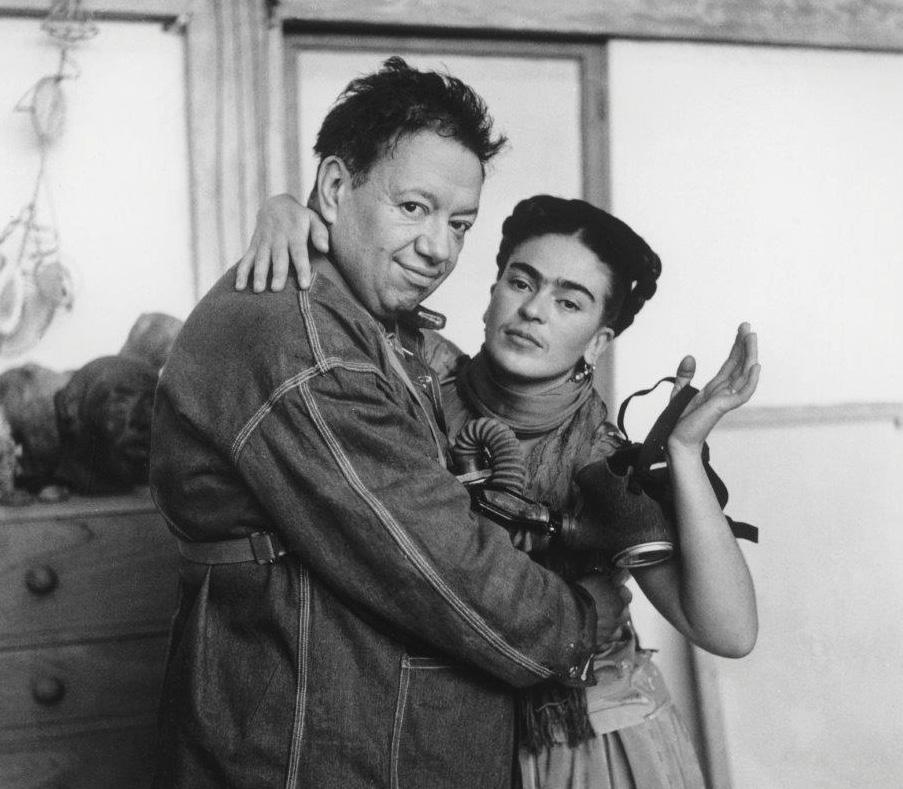
En el año de 1921 se construyó el pensamiento moderno de México, en un periodo de diez meses se presentaron al público las ideas fundamentales del periodo. El 1° de Enero Manuel Maples Arce da a conocer el Manifiesto Estridentista, ahí en mayúsculas se sentencia “VIVA EL MOLE DE GUAJOLOTE”. En marzo, Diego Rivera fecha los bocetos para su obra La Creación, su primer mural. En abril, Ramón López Velarde da a conocer Suave Patria, el poema que inaugura una nueva manera de abrazar a las palabras. En Julio, se instituye en todas las primarias del país el método de dibujo inventado por Adolfo Best Maugard, que tuvo un periodo estadounidense. El 19 de septiembre se abre la primera muestra de arte popular mexicano, curada por los artistas plásticos Dr. Atl, Jorge Enciso y Roberto Montenegro. Y ese mes Carlos Chávez compone la obra sinfónica que apertura la incorporación de instrumentos autóctonos a la música llamada culta, en su ballet El fuego Nuevo. Lo que entendemos en la actualidad como arte mexicano, se acababa de consolidar.
Al interior de esta tormenta eléctrica del pensamiento intelectual, acaba de suceder un hecho histórico sin precedentes en el Continente Americano, se crea el primer movimiento plástico que esta región le da al mundo: el Muralismo mexicano. En los cinco continentes se está hablando de este hecho, vienen a ver los muros mexicanos artistas de todo América, Europa y Asia. En los Estados Unidos el contenido social y proletario de los murales tiene un eco fundacional en el marco de la Gran Depresión de 1929, momento en el que Diego Rivera y Frida Kahlo llegan a California. Si bien José Clemente Orozco arribó primero en 1927 y David Alfaro Siqueiros se estableció en la Unión Americana en dos ocasiones, en 1932 y 1936 y en esta última visita funda el Siqueiros Experimental Workshop, donde Jackson Pollock es su alumno, el suceso del momento fue el desembarco de la pareja Rivera-Kahlo en la Bahía de San Francisco el 10 de noviembre de 1930.
Cuando la pareja Rivera-Kahlo llega a los Estados Unidos tenían 9 meses de casados y Frida solamente había pintado tres obras significativas en su trayectoria, todas en 1929, donde destaca Autorretrato con aeroplano Rivera por su parte estaba preparando una gran retrospectiva para el Museo de Arte Moderno de Nueva York, la segunda que se presentaba en ese espacio, la primera fue una muestra de Herni Matisse. En ese momento Rivera, Matisse y Picasso eran los pintores más populares del mundo. El hecho de que los artistas mexicanos en su conjunto estuvieran trabajando en la Unión Americana tenía un alcance social muy importante, ya que se presentaba un perfil cultural que los
estadounidenses no reconocían. La retroalimentación en los Estados Unidos fue fundamental en el desarrollo plástico de ambos autores. Diego hace una apología obrera en su mural del Detroit Insitute of Arts, que le gana la simpatía de todos los sindicatos del país: se erige como el héroe del proletariado. Pero Frida se construye de manera asombrosa y pasa de ser una pintora irregular a una extraordinaria artista con obras que le dan el lugar que hoy tiene en el mundo. Kahlo comienza a trabajar en una seria de sorprendentes pinturas como el Retrato de Luther Burbank, Hospital Henry Ford, Mi nacimiento, Autorretrato de pie en la frontera entre México y los Estados Unidos y Mi vestido cuelga ahí; todas obras maestras del arte moderno del siglo XX. Por otro lado la política de los Estados Unidos se radicalizaba y el congresista John Calvin Box (demócrata por el estado de Texas) propone una iniciativa llamada Undesirable Aliens Act 5094, la cual impulsa entre los años de 1924 a 1930, en donde sentencia que los trabajadores mexicanos eran una amenaza económica y social para los Estados Unidos y declara abiertamente que nosotros somos seres inferiores por su origen mestizo. Esta afirmación fue lo que dio paso a las luchas sociales que tienen en su mejor periodo las luchas chicanas de las décadas de los años 60 y 70.
Lo interesante de lo anterior es que a pesar de ser historia son temas del momento, todo sigue igual.
Personalmente me quedo con el día de las segundas nupcias de Frida y Diego que tienen lugar el 8 de diciembre de 1940 en San Francisco, California. Esa tarde, tras firmar el acta de matrimonio bajo las leyes estadounidenses, Diego se va de paseo tomado de la mano de su novia Paulette Goddard, mientras Frida se retira a su hotel, para escribirle una sensual carta de amor a Georgia O’Keeffe.
Villager 1 Søren Pederson* Villager 2 Felipe Prado
Villager 3 Shelby Condray Diego Rivera Alfredo Daza* Catrina Maria Katzarava* Frida Kahlo Guadalupe Paz Young Man Dongwhi Tony Beck* Leonardo Key’mon W. Murrah* Guadalupe Ponti Kaitlin Barron* Frida 1 Tasha Koontz
Frida 2 Sarah-Nicole Carter
Frida 3 Leslie Leytham*
Conductor Roberto Kalb* Director Lorena Maza* Choreographer Ruby Tagle*
Scenery Jorge Ballina* Costumes Eloise Kazan* Lighting Designer Victor Zapatero*
Assistant Director Alan E. Hicks Chorus Master/ Bruce Stasyna Cover Conductor/ Musical Preparation Stage Manager Nathan Brady* Music Staff Oxana Bulgakova Supertitle Coordinator Evangelina Woo*
WORLD
time
DIEGO’S MURAL:
SUNDAY AFTERNOON
Adelante,
House
tiempo
Vuelve
MUNDO DEL ARTE
of the Day of the Dead / El fin del día de
/ MUNDO DE LOS MUERTOS
muertos
for the god of Mictlān / Buscando al dios de Mictlān
/ Levitación
This performance is approximately 2 hours and 20 minutes in duration, including one intermission. Libretto by Nilo Cruz.
Scenery and costumes for the production were constructed at the San Diego Opera Scenic Studio and Costume Shop. Co-commission with San Francisco Opera, Fort Worth Opera, DePauw University School of Music, and with support from The University of Texas at Austin College of Fine Arts. Published by G. Schirmer, Inc. New York, NY
Company appearances: Kate, The Pirates of Penzance (2018); Giovanna, Rigoletto (2019); soloist, All is Calm: The Christmas Truce of 1914 Holiday Sing Along concert (2022), mezzo-soprano soloist, Ascension (2022). Notable performances: La Ciesca and The Mistress of Novices, Il trittico, Mrs. Darling, Peter Pan, Marthe, Faust, Mrs. Pearce, My Fair Lady, Olga, The Merry Widow, Mrs. Bedwin, Oliver!, Sister Sophia, The Sound of Music (Utah Festival Opera and Musical Theater); Marthe, Faust (Opera Modo); Bianca, The Rape of Lucretia, Mama McCourt, The Ballad of Baby Doe (Spotlight on Opera); Orlofsky, Die Fledermaus (Capitol Opera Raleigh); Mama Rosa, Il campanello di notte (Capitol Opera Albany); Jade Boucher, Dead Man Walking (Opera Fayetteville); Little Buttercup, H.M.S. Pinafore (Loveland Opera); Celeste #2 / Elaine, Sunday in the Park with George (Schenectady Civic Players); 3rd Street Sweeper, Solidarity (San Francisco Cabaret Opera). snrcarter.com
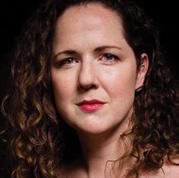
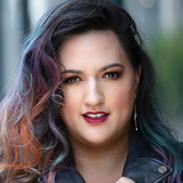
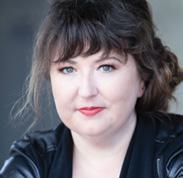
Company appearances: soloist, When I See Your Face Again (2021); Count Ceprano, Rigoletto (2019), soloist, All is Calm: The Christmas Truce of 1914 (2018). Notable appearances: Ben Benny, Paul Bunyan (Central City Opera); Colline, La bohème (Lyrique en mer, Belle Ile, France, Boston University); Don Alfonso, Cosi Fan Tutte (Holders House Opera, Barbados).
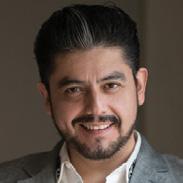
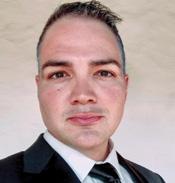
Company debut. Notable: Stankar, Stiffelio, Francesco Moor, I masnadieri (Konzerthaus Berlin); Rodrigo, Don Carlo, Renato, A Masked Ball (Staatsoper Berlin); Ford, Falstaff (Staatsoper Berlin, Staatsoper Hamburg, Teatro Communale di Bologna); Giorgio Germont, La traviata, (unter den Linden, Staatsoper Hamburg, Tokyo National Theatre); Scarpia, Tosca (Theater St Gallen); Schaunard, La bohème (San Francisco Opera, Theatre de la Monnaie, Canadian Opera Company); Valentin, Faust (Teatro Carlo Felice); Dandini, La Cenerentola (Teatro dell’Opera di Roma); Marcello, La bohème, Figaro, The Barber of Seville (Washington National Opera); Marcello (New York City Opera); Almaviva, The Marriage of Figaro, Guglielmo, Cosí fan tutte, Belcore, The Elixir of Love, Figaro, The Barber of Seville, Prosdocimo, Il turco in Italia, Yeletzki, Pique Dame, the title role, Chief Joseph (world premiere), Marcello, Sharpless, Madama Butterfly, Ping, Turandot, Lescaut, Manon, Valentin, Ford, Germont, and Conte di Luna, Il trovatore (Staatsoper Berlin). Recordings: La bohéme DVD (Marcello) with New York City Opera, The Elixir of Love DVD (Belcore) with Glyndebourne Festival for OPUS ARTE; Stolen Notes Verdi Arias (album) and Angel & Demon (album); Manon DVD (Lescaut) with the Staatsoper Berlin. alfredodaza.com
MARIA KATZARAVA, Catrina (Soprano) Company debut. Notable: winner, Operalia (Opera and Zarzuela, 2008), Oscar della Lirica (Arena di Verona, 2010), Miami Life Award. Notable appearances with: Royal Opera House Covent Garden, Teatro alla Scala, Opéra de Lausanne, Florida Grand Opera, Teatro Filarmonico, Grand Théâtre de Genève, Teatro San Carlo di Napoli, Teatro Petruzzelli di Bari, Teatro Liceu in Barcelona, and Teatro Regio di Parma; Juliette, Roméo et Juliette (Royal Opera House Covent Gardens, Teatro alla Scala, Opéra de Lausanne, Florida Grand Opera, Teatro Filarmonico, St. Étienne, Moscow); Gilda, Rigoletto (Japan tour with Teatro alla Scala); Desdemona, Otello (Liceu de Barcelona); La traviata (Grand Théâtre de Genève, Florida Grand Opera); La Muette de Portici, I pagliacci (Teatro Petruzzelli); Amelia d’Egmont, Le Duc d’Albe (Opera de Oviedo); Leonore, Fidelio (Opera Carolina); Antonia, Stella, Giulietta, The Tales of Hoffmann (Piacenza, Modena, Reggio Emilia); Micaëla, Carmen (Teatro Carlo Felice di Genova); Liù, Turandot (Teatro Lirico di Cagliari, Terme di Caracalla with Opera di Roma); Madama Butterfly, Carmen (Massimo in Palermo); Carmen (Teatro Comunale di Bologna); Stiffelio (Festival Verdi in Parma); Elisabetta, Don Carlo (Palau de les Arts de Valencia); Amelia, Simon Boccanegra (Opéra de Lausanne); Aida (Royal Opera Stockholm). mariakatzarava.com
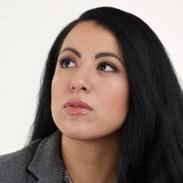
Company appearances: Annina, La traviata (2017); Frasquita, Carmen (2019); The High Priestess, Aida (2019); soloist, Ascension (2022). Notable appearances: Mimì, La bohemè, Violetta, La traviata (Opera on the Avalon); Alice Ford, Falstaff (IU Opera Theater); Donna Anna, Don Giovanni (Bay View Music Festival); The Countess, The Marriage of Figaro (Northwestern University). tashakoontz.com
Company debut. Notable appearances: CityWater Ensemble (San Francisco), The Industry Opera Company (Los Angeles), WildUp (L.A.), Noon 2 Midnight concert marathon (the Los Angeles Philharmonic), Monday Evening Concert Series (L.A.), La Jolla Symphony (San Diego), wasteLAnd concert series (L.A.), Bach Collegium (SD), City Opera of San Diego, Guerilla Opera (Boston), NOWY Teatr (Warsaw), the Mengi (Reykjavik), Space4Art (SD), Bread and Salt (SD). Leslie is founder and Co-Artistic Director of Project [BLANK] (founder, Co-Artistic Director). leslieleytham.com
Company debut. Notable appearances: Die Fledermaus, The Magic Flute, Tales of Hoffmann, La bohéme (University of Kentucky Opera Theatre and Bluegrass Opera); Mingo, Porgy and Bess, Spiritual Man, A Tree on the Plains (world premiere), Tolomeo, Giulio Cesare (Red River Lyric Opera); Asprano, Montezuma (America Baroque Opera Company); Second Place Undergraduate Award (The Alltech Vocal Competition); Second Place Award (National Association of Negro Musicians and Bellarmine’s University’s “Traditional Negro Spiritual” Voice Competition, 2010); finalist, Juanita Peterson Vocal Competition (2014); Second Place Award (Emerging Soloists Competition); finalist (Opera MODO Opera Competition); soloist, American Spiritual Ensemble tour; Young Artist Program, Glimmerglass Opera Festival. keymonmurrahcountertenor.com
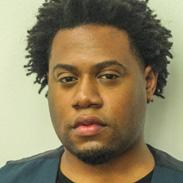
Company appearances: Mercedes, Carmen (2019)
Notable appearances: Melibea, Il Viaggio a Reims, Hansel, Hansel and Gretel (Bellas Artes National Opera); Rosina, The Barber of Seville, Angelina, Cinderella (Teatro del Bicentenario, Bellas Artes National Opera); Isolier, Le Comte Ory (Philharmonic Orchestra of Jalisco); Maddalena, Il Viaggio a Reims (Rossini Opera Festival); soloist, Glagolitic Mass (International Cervantino Festival); soloist, Ode to Common Things (La Jolla Symphony and Chorus); soloist, Tres Canciones para Orquestra y Mezzosoprano (International Festival Instrumenta); soloist, Seven Deadly Sins (Aspen Music Festival). glfcam.com/guadalupe-paz
Company debut. Notable: Marcello, La bohéme (PLNU); Don Giovanni, Don Giovanni (Italy); Gianni Schicci, Gianni Schicci (International Opera Performing Experience); soloist, Schubert’s Mass in G, Bach’s Gottes Zeit ist die allerbeste Zeit (BWV 106), Handel’s Messiah, Mendelssohn’s Elijah; first place, Upper College Classical Division (National Association of Teachers of Singing), encouragement award, Colorado-Wyoming Division of the Metropolitan Opera National Council competition.
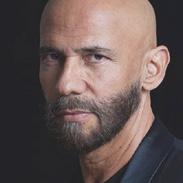
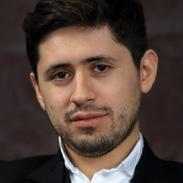
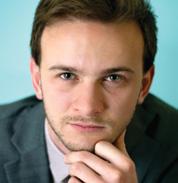
Company appearances: Remendado, Carmen (2019) Notable appearances: Spoletta, Tosca (Guild Opera); Borsa, Rigoletto, Gastone/ Giuseppe, La traviata (Antelope Valley Symphony Orchestra and Master Chorale); Tamino, The Magic Flute (Ridgecrest Opera Guild); Alfredo, La traviata (Pacific Lyric Association); soloist (California Philharmonic Orchestra and Chorale). felipeprado.weebly.com

Company debut. Notable work: The Magic Flute, Macbeth, Don Giovanni, The Marriage of Figaro (also National theatre in Zagreb), Cosí fan tutte, L’italiana in Algeri, Fidelio, Rusalka (also Teatro Colon in Buenos Aires), The Tales of Hoffmann, L’amour de Loin, Cavalleria Rusticana/Pagliacci, Carmen and Wagner’s Ring Cycle, Death in Venice (also stage director); Beyond, Copenhagen, Phaedra and other Greek Women, End of Circus Erotica, The Shape of Things, Touché, All About my Mother, Sleuth, Cock, Dervish, The Curious Incident of the Dog in the Nighttime, Red, The Illusion, Glengarry Glen Ross, Salome, Constellations, Let the Right One In, Gruesome Playground Injuries, Privacy, Richard III, As You Like It, The Glass Menagerie, Egmont, Coriolanus, No Exit, Blue Room, and A Soldier in Every Son (Royal Shakespeare Company), Joseph and the Amazing Technicolor Dreamcoat, Si nos dejan, Man of la Mancha, Rent, Next to Normal, Seven Times Goodbye, Mentiras; THR3E, Evening in Mogador, 3.1416, The Glance of the Deaf, Romeo & Juliet, The Rite of Spring, Snow White, King and King, Omphalos (also Kampnagel, Hamburg), Filling the Emptiness, and Giselle-she’s el (also stage director).
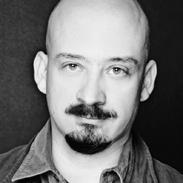 jorgeballina.com
jorgeballina.com
Company debut. Notable: 2003 Pulitzer Prize (Anna in the Tropics); Tony Award nomination (Anna in the Tropics); Kennedy Center Fund Award, American Theatre Critics and the Humana Festival for New American Plays Award; National Endowment of the Arts and the Rockefeller Foundation grant recipient; Dancing on Her Knees, A Park in Our House, Two Sisters and a Piano, A Bicycle Country, Hortensia and the Museum of Dreams, Lorca in a Green Dress, Beauty of the Father, Hurricane, A Very Old Man with Enormous Wings (author); Doña Rosita the Spinster, The House of Bernarda Alba, Life Is a Dream, ¡Ay, Carmela! (translator). Appearances at: South Coast Rep, the Mark Taper Forum, the Oregon Shakespeare Festival, Washington D.C.’s Studio Theatre, New York’s Public Theater; worldwide; Canada, England, France, Australia, Germany, Belarus, Costa Rica, Colombia, Japan, Spain; The Conquest Requiem, The Santos Oratorio, La Centinela y la paloma (librettist, to music by Gabriela Lena Frank); Bel Canto (librettist, Lyric Opera of Chicago), Dreamers (librettist, to music by Jimmy López); M.F.A., Brown University, honorary doctorate degree, Whittier College; playwright-in-residence, McCarter Theatre and New Theatre in Coral Gables, Florida, which commissioned Anna in the Tropics; instructor, Yale, Brown, University of Iowa; Hearst Theater Lab Initiative Distinguished Visiting Playwright-inResidence at the UCLA School of Theater, Film and Television.
GABRIELA LENA FRANK, Composer Company debut. Notable: Composer-inResidence with Philadelphia Orchestra; 35 Most Significant Women Composers in History (Washington Post); 25th anniversary Heinz Award in the Arts and Humanity category with an unrestricted cash prize of $250,000 (2020); Winner (Latin Grammy Awards); nominated for Grammy Award (composer and pianist); Guggenheim Fellowship recipient; USA Artist Fellowship recipient; composerin-residence with the Detroit Symphony; residency, Houston Symphony; visiting Artist-in-Residence at the Blair School of Music with Vanderbilt University, Composer-in-Residence at the Caines School of Music at Utah State University. Notable commissions: Yo Yo Ma, Dawn Upshaw, King’s Singers, Cuarteto Latinoamericano with guitarist Manuel Barrueco, Brooklyn Rider, conductors Marin Alsop and Yannick Nézet-Séguin, Chicago Symphony, the Boston Symphony, the Atlanta Symphony, the Cleveland Orchestra, the Philadelphia Orchestra, Carnegie Hall, and San Francisco Symphony. Notable compositions: Chronicles of the Picaflor (Hummingbird), Walkabout: Concerto for Orchestra, Conquest Requiem, Apu: Tone Poem for Orchestra and Suite Mestiza glfcam.com/people/gabriela
ROBERTO KALB, Conductor Company debut. Notable: San Francisco Opera, Compañía Nacional de Ópera, Palacio de Bellas Artes in Mexico City, Opéra Orchestre National Montpellier, Wolf Trap Opera, National Symphony Orchestra (La Traviata), Opera Theatre of Saint Louis (Awakenings, world premiere); head of music at Opera Theatre of Saint Louis (2104-2019); Michigan Opera Theatre, Florida Grand Opera, Tulsa Opera, Kentucky Opera, Opera Maine, Orquesta Carlos Chavez in Mexico City, Orquestra Sinfonica da USP in São Paulo; Cover / Assistant Conductor: Detroit Symphony Orchestra, Canadian Opera Company; recipient, 2021 Solti Foundation U.S. Career Assistance Awards; degrees from the University of Michigan, San Francisco Conservatory of Music. robertokalb.com
Company debut. Notable: A Soldier in Every Son (Royal Shakespeare Company, directed by Roxana Silbert); (2012), The Good Canary (directed by John Malkovich); Split (feature film); Opera design: Macbeth (Ópera de Bellas Artes), Rusalka (Teatro Colòn, Ópera de Bellas Artes), The Marriage of Figaro (Croatian National Opera), The Barber of Seville (Teatro del Bicentenario), Madama Butterfly (Festival de Mayo), Bastien and Bastienne (CC Salamanca), Jenufa (Ópera de Bellas Artes, Festival de México), Winterreise (The Universal Forum of Cultures), Lucio Anneo Seneca (CCU, México D.F), Cosí fan tutte (Festival Mozart), El Cimarrón (FME, Mexico City); top prize, costume design (Prague Quadrennial); interna tionally jury member for Prague Quadrennial; internationally jury member World Stage Design (2017 and 2022). eloisekazan.myportfolio.com/about
LORENA MAZA, Director Company debut. Notable: director, Mexico’s National Theater Company; director, Teatro Helenico; director, Teatro UNAM, (3 venues, 35 plays a year); faculty of Philosophy and Letters at the National University of Mexico; faculty at CUT – UNAM; 11 awards for Best Direction and Best Play of the Year; translator, National Theater LIVE; founder and director, Ocesa theater department of Grupo CIE; producer, Disney’s Beauty and the Beast; author, director, and producer Bésame Mucho; founder, 19TEATRO. lorenamaza.myportfolio.com/lorena-maza-1
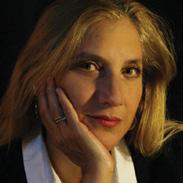
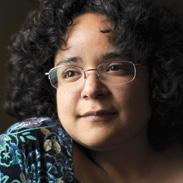
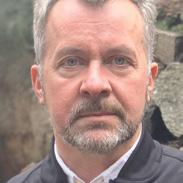
Company appearances: Così fan tutte (2022); The Barber of Seville (2021); One Amazing Night: When I See Your Face Again (2021); All is Calm Holiday Concert (2020); One Amazing Night with Stephen Costello and Stephen Powell (2019); Maria de Buenos Aires (2018); As One (2017). Notable work: chorus master, San Diego Opera, New York City Opera, Minnesota Opera, Washington Concert Opera, Wolf Trap Opera and Des Moines Opera; conductor, New York City Opera, Boston Lyric Opera, Amalfi Coast Music Festival; Artistic Director, Principal Conductor, Green Mountain Opera Festival; Head of Music, Director of the Young Artist Program, Palm Beach Opera; Music Director, Vero Beach Opera; Premieres: Anna Nicole, The Handmaid’s Tale, Orazi e Curiazi, Joseph Merrick dit Elephant Man
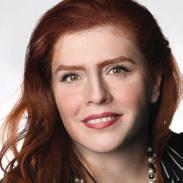
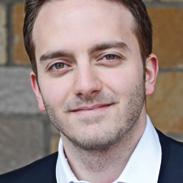
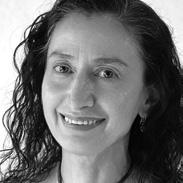
Company debut. Notable work: Edinburgh Festival, Sao Pedro Theater, Opera Sao Paulo, XVII Amazon Opera Festival, Mercosul Biennial, Theater Der Welt, National Theater Company of Mexico, Theater of Certain Inhabitants, International Cervantino Festival, Real Theater, Festival of the Historic Center of Mexico City Bicentennial, Theater Roberto Plasencia Saldana, Fine Arts Opera of Mexico, National Dance Ensemble of Ecuador, 3-LEGGED DOG NYC, Edinburgh Festival Fringe, Shadow Line Theater, Nemian Dance Company, Contemporary Dance Company of Oaxaca, Contemporary Dance Production Center, Impulse Festival of National Autonomous University of Mexico, Nezahualcoyotl Room.
Company debut. Notable work: Bicentennial Celebration Noche del Grito (Night of the Scream) (Plaza Zócalo, Mexico City); Einstein on the Beach (Palacio de Bellas Artes/Palace of Fine Arts, with Robert Wilson); The Magic Flute, Death in Venice, Rigoletto, Don Giovanni, Rusalka, L’amour de loin (Palacio de Bellas Artes/Palace of Fine Arts, México City); For theatre, Macbeth, Man of La Mancha (best lighting design in a musical work, Metropolitan Theater Awards); Omphalos (by Belgian choreographer Damien Jalet); solo work: The Forest (El Bosque), The Tree of Life victorzapatero.com
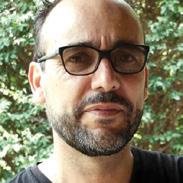
Music Director
EDO DE WAART
Principal Guest Conductor
JAHJA LING
Conductor Laureate
Jeff Thayer
Concertmaster
DEBORAH PATE AND JOHN FORREST CHAIR Wesley Precourt
Associate Concertmaster
Jisun Yang
Assistant Concertmaster Alexander Palamidis
Principal Second Violin Nick Grant
Principal Associate Concertmaster Emeritus Cherry Choi Tung Yeung Associate Principal Second Violin Ai Nihira Awata Jing Yan Bowcott Yumi Cho
Hernan Constantino Alicia Engley Kathryn Hatmaker Kenneth Liao Igor Pandurski
Evan Pasternak Julia Pautz Yeh Shen Xiaoxuan Shi
Edmund Stein Hanah Stuart
John Stubbs
Pei-Chun Tsai
Zou Yu
Thomas Dougherty* Benjamin Hoffman* Nicole Sauder* Sarah Schwartz*
Chi-Yuan Chen
Principal
KAREN AND WARREN KESSLER CHAIR
Nancy Lochner Associate Principal Wanda Law Qing Liang Abraham Martin Johanna Nowik Ethan Pernela Carrie Dennis* Jason Karlyn* Michael Molnau*
Yao Zhao Principal Chia-Ling Chien Associate Principal Marcia Bookstein
Andrew Hayhurst
John Lee Richard Levine Mary Oda Szanto Nathan Walhout Xian Zhuo
BASS Jeremy Kurtz-Harris Principal
SOPHIE AND ARTHUR BRODY FOUNDATION CHAIR
Susan Wulff
Associate Principal Aaron Blick P.J. Cinque Kaelan Decman Kevin Gobetz
Samuel Hager Michael Wais Margaret Johnston+
Rose Lombardo Principal Sarah Tuck Lily Josefsberg
PICCOLO Lily Josefsberg
OBOE Sarah Skuster Principal Rodion Belousov Andrea Overturf
ENGLISH HORN
Andrea Overturf DR. WILLIAM AND EVELYN LAMDEN ENGLISH HORN CHAIR
CLARINET Sheryl Renk Principal Max Opferkuch Frank Renk
BASS CLARINET
Frank Renk
BASSOON Valentin Martchev Principal Ryan Simmons Leyla Zamora
CONTRABASSOON Leyla Zamora
Benjamin Jaber Principal Darby Hinshaw Assistant Principal & Utility Elyse Lauzon Tricia Skye Douglas Hall
Christopher Smith Principal John MacFerran Wilds Ray Nowak
Kyle R. Covington Principal Logan Chopyk Kyle Mendiguchia
BASS TROMBONE
Kyle Mendiguchia
TUBA Aaron McCalla Principal HARP Julie Smith Phillips Principal
Ryan J. DiLisi Principal Andrew Watkins Assistant Principal
PERCUSSION
Gregory Cohen Principal Erin Douglas Dowrey Andrew Watkins
Courtney Secoy Cohen
Rachel Fields
* Long Term Substitute Musician
+ Staff Opera Musician
The musicians of the San Diego Symphony are members of San Diego County, Local 325, American Federation of Musicians, AFL-CIO.
Carly Cummings
Michelle Gallardo-Arias
Abla Hamza Maria Janus Tasha Koontz
Amy Mein Lisa Parente Katie Polit Laynee Woodward
Kaitlin Barron Mary Boles Laura Bueno Sarah-Nicole Carter Maria Caughey Leslie Leytham Karin Wilcox Anna Yelizarova
Dongwhi Tony Baek Bernardo Bermudez
James Malereich
Frank Napolitano
Felipe Prado
Timmy Simpson Cole Tornberg Dennis Williams
Shelby Condray Walter DuMelle
Andrew Konopak
David Marshman
Kevin Martin Jonathan Nussman
Søren Pedersen
William Sales Michael Segura Michael Sokol
Artists and Production Staff are members of the American Guild of Musical Artists, AFL-CIO, the labor union that represents musical artists in opera, concert, and dance in the United States.

One of the main characters in our new opera, The Last Dream of Frida and Diego, is La Catrina.
Catrina symbolizes El Día de los Muertos (Day of the Dead) and the Mexican way of laughing at death itself. Catrina reminds us that we are all equal when our time comes to go. She is the beloved grand dame of Mexico’s dance with death 365 days a year.
The printmaker and illustrator José Guadalupe Posada created a black and white image of a skeleton lady, which was published in 1910 during the Mexican Revolution as a satirical attack on the privileged class. Catrina was an elegant, very well-dressed, and obviously rich woman. She is represented from head to skeletal shoulder wearing a large, fashionable hat with feathers. Diego Rivera said of Posada: “He is as great as Goya. None will imitate him; none will define him. His work is the quintessential work of art.”
Catrina is closely related to Mictecacihuatl, the Aztec goddess of death and lady of the underworld. She was married to Miclantecuhtli, ruler of the afterlife. Catrina was the keeper of the bones in the underworld, presiding over the month-long Aztec festivals honoring the dead.
Rivera transformed Posada’s skeleton lady into a full-bodied character, and Catrina became the central figure in one of his most famous murals, “Sueño de una tarde dominical en la Alameda” [“Dream of a Sunday Afternoon at Alameda Central Park.”]. Painted in 1946-47, it survived Mexico City’s 1985 earthquake and is now housed in its own museum adjacent to the Alameda Park in Mexico City.
Four hundred years of historical characters are depicted in this mural: the Spanish conquest, the 1810 war of independence, a succession of wars, the Hapsburg archduke Maximilian, the 1910 bloody Mexican Revolution, and on into the mid-twentieth century. Rivera paints Catrina full size. She is wearing a white skirt made from Oaxaca indigenous textiles. Her skirt reminds us of Frido Kahlo’s fashionable, indigenous way of dressing. Rivera also honors the Aztec god Quetzalcoatl, whose name means “feathered serpent,” by painting a rattlesnake boa around her neck. Catrina looks you straight in your eye with a smile and the posture of a grand dame taking you out for a stroll. One is never sure. Is she walking in the park or taking Diego as a child to the realm of the dead? Catrina is holding the child’s hand firmly, and it seems that he will not escape human fate. She is probably laughing at life and death.
Catrina’s posture toward death is more benevolent than fearsome. She adorns herself and becomes closer and more familiar. Catrina has been assimilated as the representation of what we understand as death.
Let us then celebrate life, death, and art!
Uno de los personajes principales en nuestra nueva ópera, El último sueño de Frida y Diego, es La Catrina. Catrina simboliza El Día de los Muertos y representa la forma mexicana de reírse de la muerte. Catrina nos recuerda que todos somos iguales a la hora de morir. Ella es la gran dama del baile con la muerte en México, los 365 días del año.
El grabador e ilustrador José Guadalupe Posada creó una imagen en blanco y negro de una dama esquelética, misma que fue publicada en 1910 durante la Revolución Mexicana como un ataque satírico a la clase privilegiada. Catrina era una mujer elegante, muy bien vestida y obviamente rica. Se le representa desde la cabeza hasta la clavícula esquelética con un gran sombrero de moda con grandes plumas. Diego Rivera dijo de Posada: “Es tan grande como Goya. Nadie lo imitará, nadie lo definirá. Su obra es la obra de arte por excelencia”.
Catrina está estrechamente relacionada con Mictecacihuatl, la diosa azteca de la muerte y señora del inframundo. Ella estaba casada con Miclantecuhtli, gobernante del más allá. Catrina era la guardiana de los huesos en el inframundo y presidía los festivales aztecas de un mes de duración en honor a los muertos.
Rivera transformó a la dama esquelética de Posada en un personaje de cuerpo entero, y Catrina se convirtió en la figura central de uno de sus murales más famosos, “Sueño de una tarde dominical en la Alameda”. Pintado en 1946-47, el mural sobrevivió al terremoto de 1985 en la Ciudad de México y ahora se encuentra en su propio museo adyacente al Parque Alameda en la Ciudad de México. Cuatrocientos años de personajes históricos están representados en este mural: la conquista española, la guerra de independencia de 1810, una sucesión de guerras, el archiduque Maximiliano de los Habsburgo, la sangrienta Revolución Mexicana de 1910 y representa ciones hasta mediados del siglo XX. Rivera pinta a Catrina de tamaño natural. Lleva una falda blanca hecha con textiles indígenas de Oaxaca. Su falda nos recuerda la forma de vestir indígena y de moda de Frida Kahlo. Rivera también honra a Quetzalcóatl, el dios azteca cuyo nombre significa “serpiente emplumada”, y está representado en la Catrina como una boa de serpiente de cascabel alrededor de su cuello. Catrina te mira a los ojos con una sonrisa y la postura de esta gran dama invitándote a pasear. Uno nunca está seguro si te invita o simplemente te quiere llevar con ella. ¿Pasea por el parque o lleva a Diego de niño al reino de los muertos? Catrina sostiene firmemente la mano del niño y parece que este no escapará al destino humano. Muy probablemente Catrina se está riendo de la vida y la muerte.
La postura de Catrina ante la muerte es más benévola que temible. Se adorna y se vuelve más cercana y familiar. Catrina ha sido asimilada como la representación de lo que entendemos por muerte.
¡Celebremos entonces la vida, la muerte y el arte!
¡Que viva la vida!
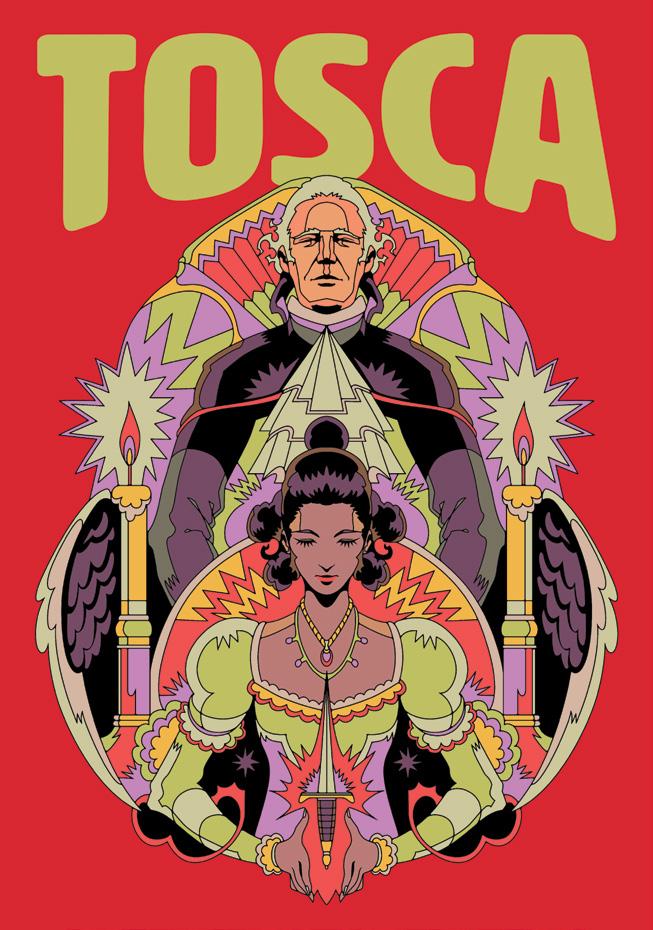
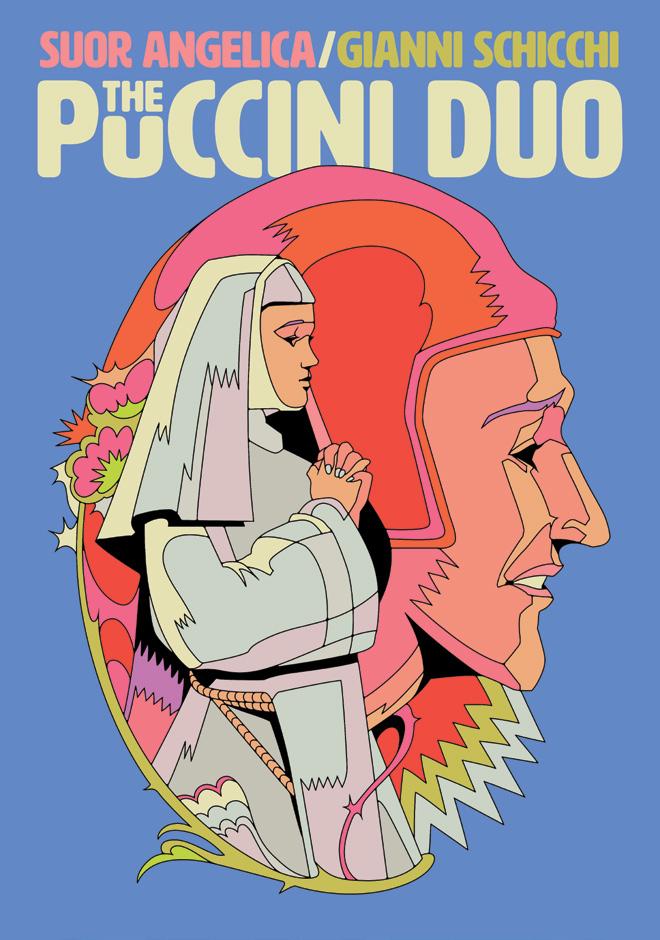
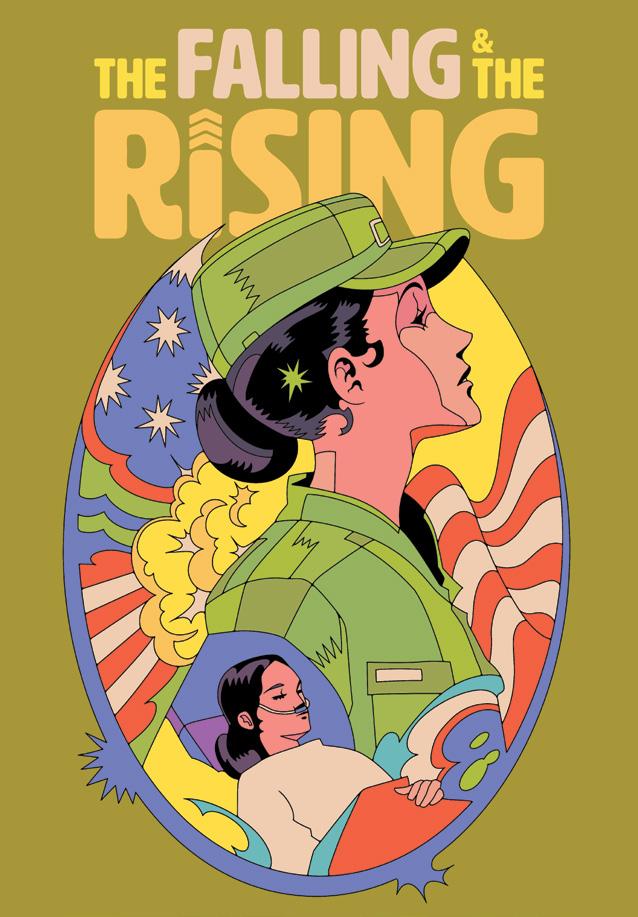
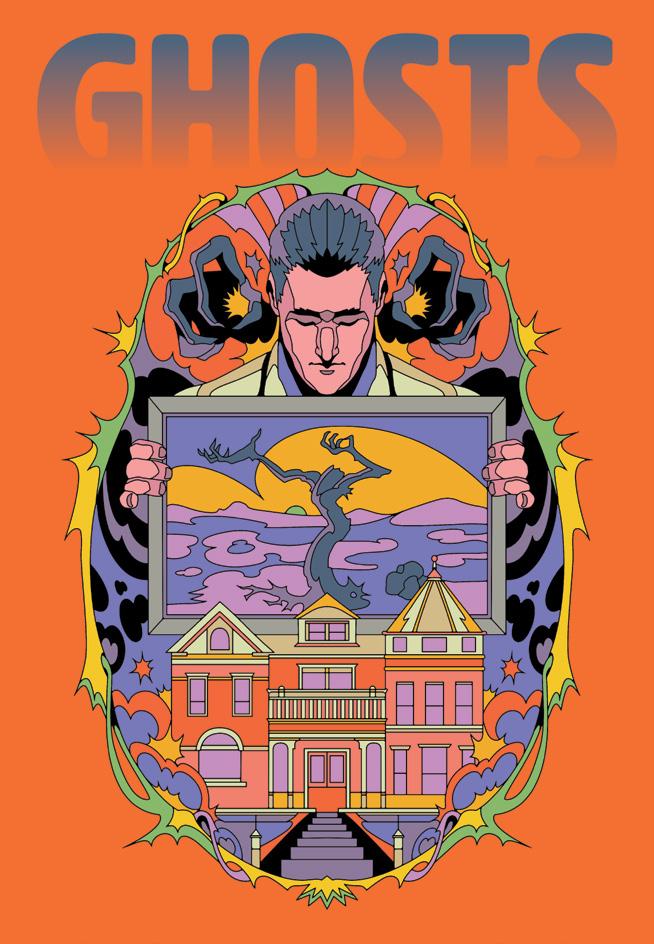
Ticket sales cover less than a third of the cost of producing opera. Every performance and education program we provide is made possible by the generosity of opera lovers like you.
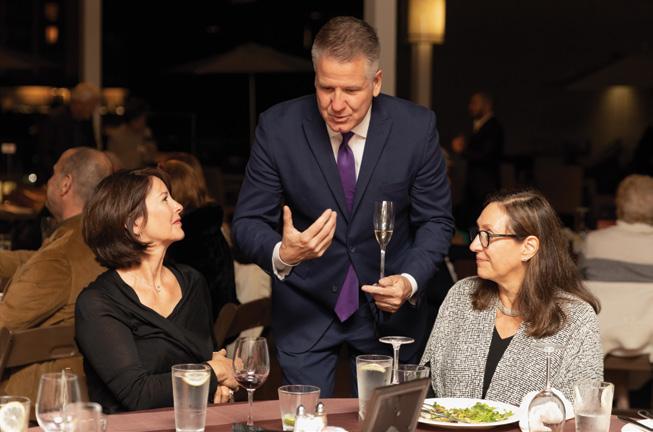
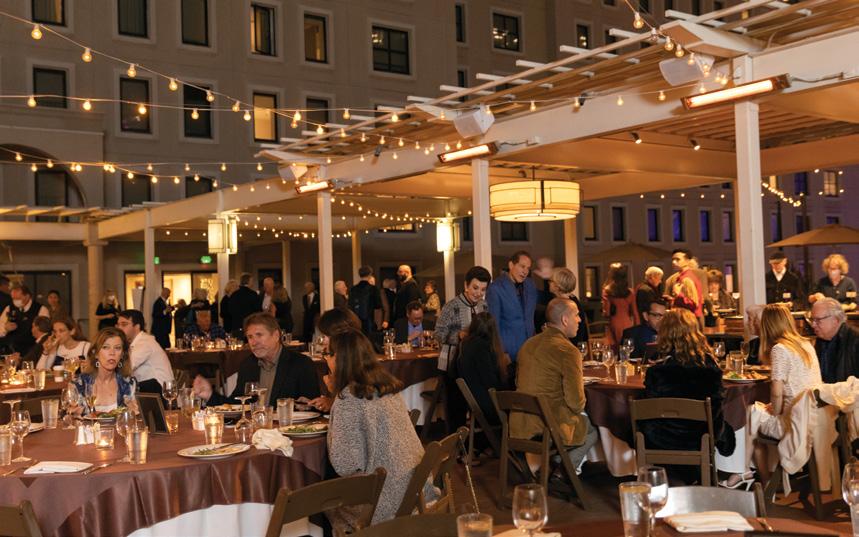
Your gifts provide opportunities to enhance your own enjoyment of the opera through special programs that are open only to our donors.
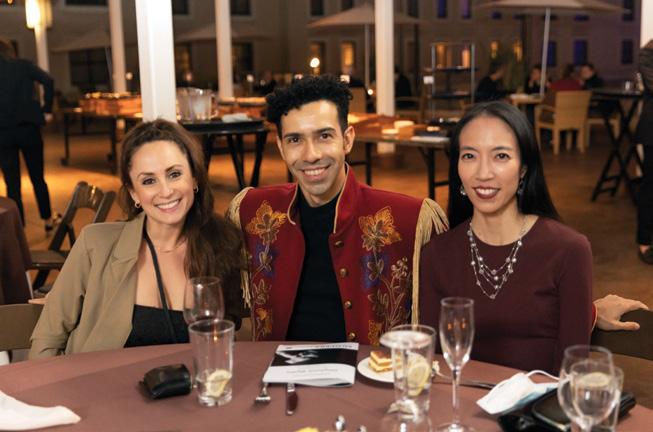
When you become a member of San Diego Opera, you provide the vital support needed to deliver world class vocal performances and exciting, accessible programs to our diverse audiences. Your support continues our legacy of bringing operatic arts to all of San Diego County, reaching groups of all ages and backgrounds ensuring there will be an audience for this amazing, multidisciplinary art form for generations to come.
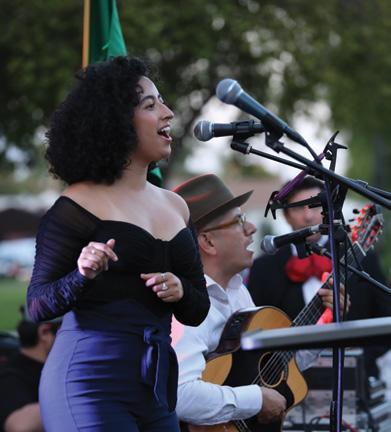
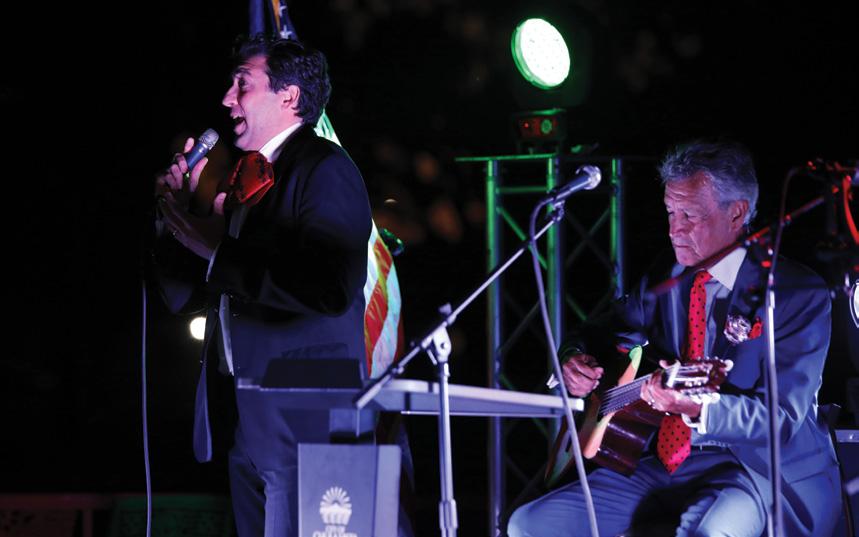
To make a donation now, use your phone’s camera to scan this QR code.

Join Bruce Stasyna, San Diego Opera’s Chorus Master, as he examines various aspects of our Main Stage operas, including history, influences, important performances, and musical themes. Always a favorite of the San Diego community, Bruce keeps these discussions lively and fresh while you enjoy lunch and a beverage!
Join your host, SD Opera’s General Director David Bennett, for a champagne reception. Then on to an exclusive backstage tour with David Bennett and Production Director Joan Foster to become intimately acquainted with opera’s magic behind the scenes!
Meet San Diego Opera’s Chorus Master Bruce Stasyna and surround yourself with the many voices of one of the most highly acclaimed opera choruses in the country as they prepare for a Main Stage production.
Enjoy a unique opportunity to meet your favorite opera stars as David Bennett leads a digital panel discussion.
Join a vocal master class taught by a SD Opera professional or visiting artist! Truly a unique experience to see how vocalists achieve the exceptional ability to perform at the high levels demanded by the opera repertoire.
Fine dining with fellow opera lovers amid the set of a Main Stage opera production at the Civic Theatre. There is no better way to spend an evening than on the very stage where the magic happens!
For more information, use your phone’s camera to scan this QR code.


For 70 years, the University of San Diego has cultivated an appreciation for the arts and prepared generations of students to be artists, innovators and Changemakers. USD has made an art of changing the lives that change the world.
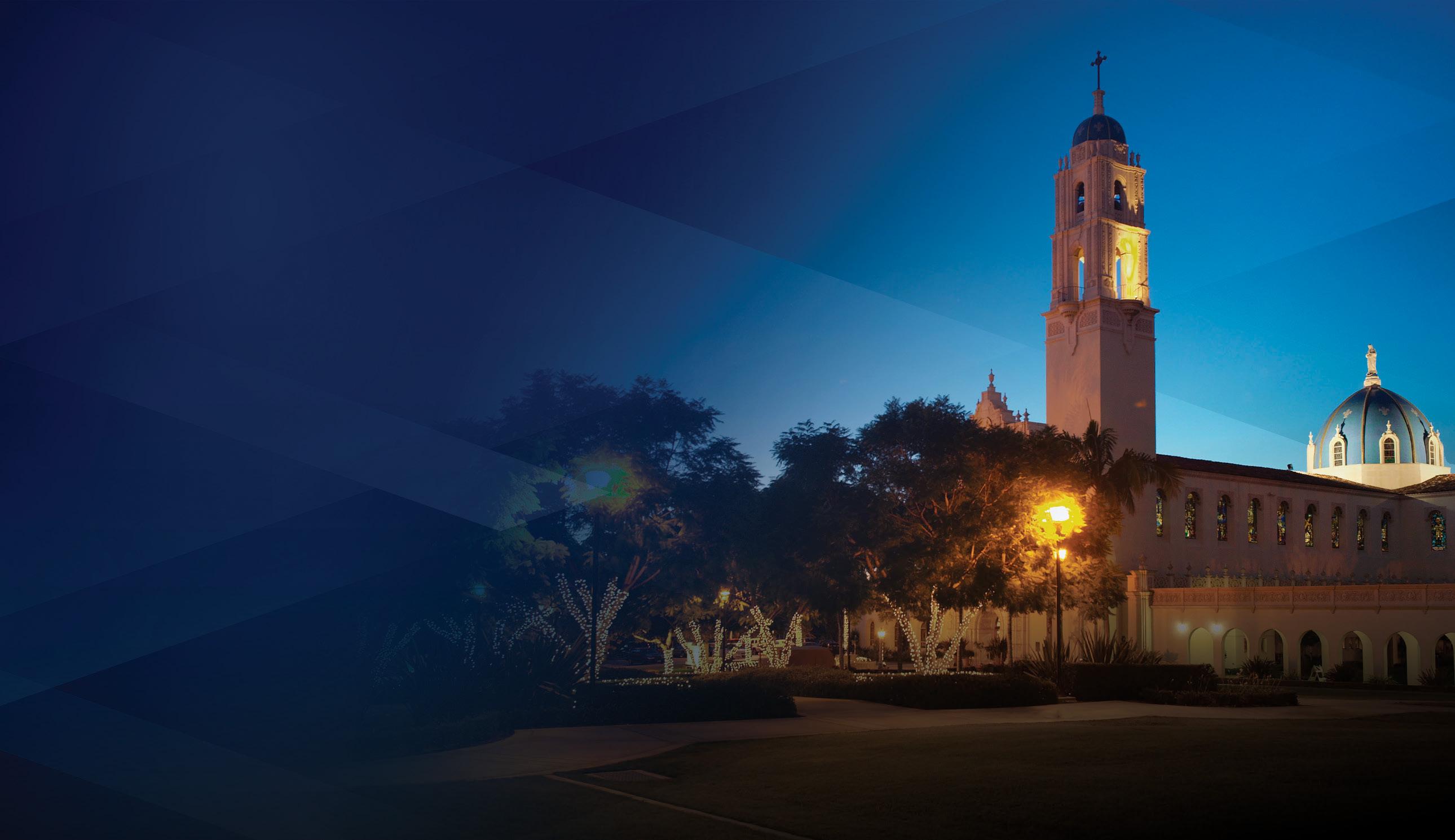
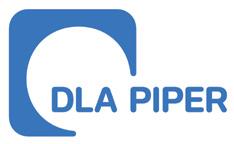






THANK YOU CITY OF ENCINITAS and the ECKE FAMILY FOUNDATION for their support through the Community Grant Program
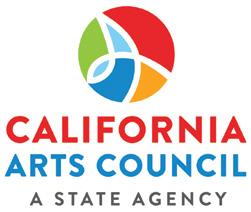





Carol Franc Buck Foundation

Clare Rose Foundation
The Conrad Prebys Foundation
David C. Copley Foundation Fundación Coppel




Ann and Gordon Getty Foundation
Mandell Weiss Charitable Trust





The Parker Foundation Pratt Memorial Fund
Price Philanthropies

Ramona Community Foundation
Samuel I. and John Henry Fox Foundation
The San Diego Foundation

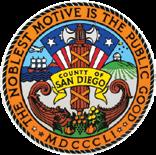




As inventors of breakthrough technologies, we believe in offering big thinkers and bright minds the opportunity to make their mark on the world. That’s why we’re pleased to support the San Diego Opera in delivering exceptional vocal performances and exciting, accessible programs to diverse audiences.
Proud
San Diego Opera is deeply grateful to the following individuals who have helped to ensure the future of opera in San Diego by including SDO in their estate plan.
Anonymous (12)
Robert & Meredith Alcock
Jim Algert*
Robin L. Allgren
Irene Ruth Allis
Dr. & Mrs. Lazlo Ambrus*
Murray* & Anne-Marie Anker Alfred* & Sara Antonicelli
Bobbie Ball-Bradley Hans Beck*
Mr. & Mrs.* Doug Bekkedahl
Maurice & Olga Bernard
Eleanor* & Robert Bottomley
Joan E. Bowes in memory of Evelyn Raff Roth
Margaret L. Boyce*
Edna E. Brennan*
Michael O. Lynch & Cheri B. Briccio
Mr.* & Mrs. Marlin Brossart
Sarah Blakely Brown Esther J. Burnham*
Robert O. Burton in Memory of Dorene M. Burton
Robert & Linda Cain Mrs. Ruth Heinz Carpenter Kent Chapin*
David A. Chierichetti*
Mr.* & Mrs.* Nathaniel L. Cohen
Richard & Stephanie Coutts
Roselle Coviello*
Elisabeth H. Crouch
Mary Yee DeBrunner*
George Demetre*
Gwyn Enright*
Sandra Erbetta
Estate of Richard Stern
Hester Evans
Elsa Feher
Daryl E. Ferguson
Teresa Fischlowitz
Mr.* & Mrs. David C. Fletcher
Mr. & Mrs.* John Patrick Ford Kay O’Cullane & Steven B. Frank Dr. William & Judith Friedel
Litzie H. Friedman*
Audrey Geisel*
Dr. Michael & Barbara Gerber Clifford Geweke*
Lee & Frank* Goldberg
Connie Golden in memory of Robert M. Golden
Bruce* & Barbara Goldreyer
Reba Graney*
David & Claire Guggenheim
Dr. Howard F. Guidry in memory of Dr. William F. Piles
M. Antoniette Harris
Kathryn Hattox*
Dr. & Mrs. Jerome Heard
Dr.* & Mrs. P. Kahler Hench
Joan Henkelmann
John Hermann*
Mr.* & Mrs. Joseph W. Hibben Mildred Hinkle* in memory of Edward Hinkle Teresa & Harry Hixson
Dr. & Mrs. Thomas G. Hoffman Shirley & Gene* Hoggatt
Dr.* & Mrs.* Samuel Hon Karl & Greet Hostetler
Dr. Steve & Nancy Howard
Beverly J. Hymes
George & Marlene Imbsen Bill* & Becky Ivans*
Mr. & Mrs. Norman W. Jaffe Charmaine* & Maurice* Kaplan Philip M.* & Detty June* Klauber Marilyn* & Bill* Kneeland Miriam & Peter* Krippl
Dr. Seth Krosner
Regina Kurtz
Mr.* & Mrs. Jack Landale Mrs. Charlotte Laverents* Carol Lazier
Belina L.* & Paul L.* Lazzar Ruth I. Ledermann Lester Lefkowitz Inge Lehman* Ruth Leonardi C. Stanley Mahan Sara & Dennis Manyak Sarah B. Marsh-Rebelo, G.G. & John G. Rebelo
Mr. & Mrs.* William H. Marten Muriel Gluck*
Dr. Marjorie Ann McBride Kenneth C. McMillen Merikay & Ron McQuoid Elinor & Charles Merideth James A. Merritt Elizabeth B. Meyer* Diana M. Miller Judith A. Moore Sam & Mona Morebello
Barbara & Maury Mortensen William H. Murphy* & Robert H. Heath* Rik Nelson & Joe Gorst
Ms. Deloris S. Neumiller Jerome & Jacqueline Niederman*
Maria Gladys Nockin Mary Elizabeth North & Mary Gaylord North Barbara Taylor Ockenfels Elizabeth A. Otten
Gayle Tejada Pate
Mr. Bernard Paul Dr. & Mrs. Douglas K. Pay John* & Ernie Peak John Pendleton
Mr. & Mrs. Robert A. Plachta* William Purves Mrs. Paul A. Quaintance Daniel & Feliza Reed
Nancy Riley
Mary B. Rose Mr. & Mrs.* Robert J. Rose
Bruce S. Ross & Eileen F. Gallo-Ross
M. Elaine Ross
Jukka Saukkonen & Velva Wood
Forrest C. Schafer
Schleder/Heineman Trust Mr. & Mrs. Christof E. Schwab
Abraham Shrekenhamer
Mr.* & Mrs. John Shumaker Joseph & Gloria Shurman John S. Sieh
Sandra Silvers*
Paul Slysh*
Sherman & Lady Smith Sylvia M. Smith
Carol Jean Spicer Linda P. Spuck
Mildred Stiverson Joseph Sundstrom & Rosemary Lyttleton Bill Stensrud
Marlene Roedde Swall C. Everly* & Madeline E.* Terry Robert* & Aysegul Underhill
Karen Valentino
Dr.* & Mrs.* George H. Walker
Eleanor Ward*
Arlene & Peter Way
Janet & Jonathan White Mary Ann White Jean Winslow*
Raymond* & Erika Wright Robert L. Zarbock*
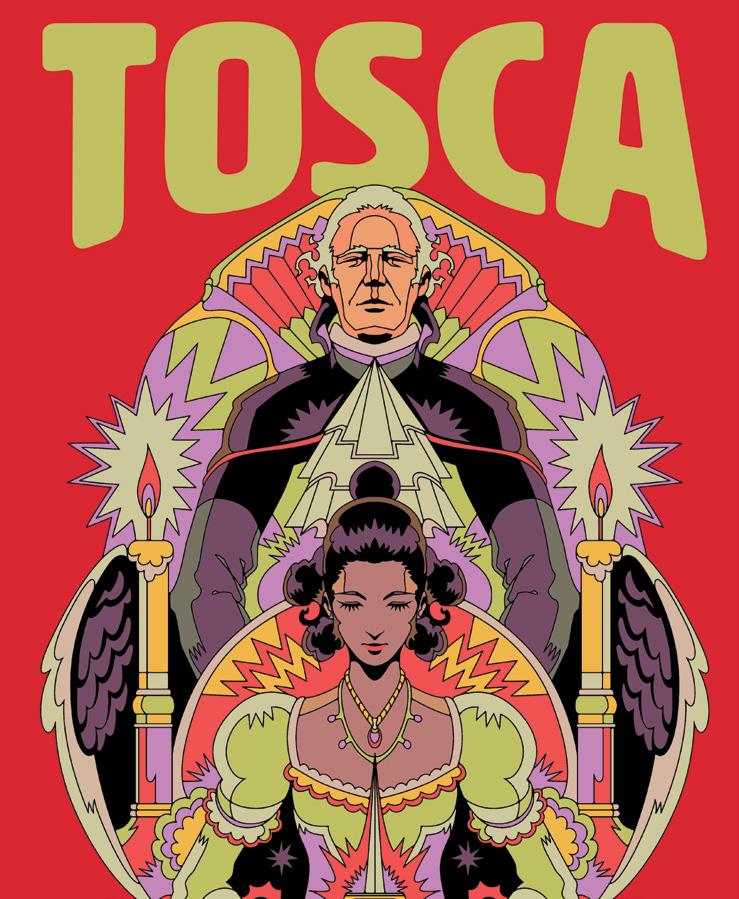
Night is an elegant event that brings together the leaders of San Diego’s Life Sciences community to enjoy world-class opera and high-level networking.
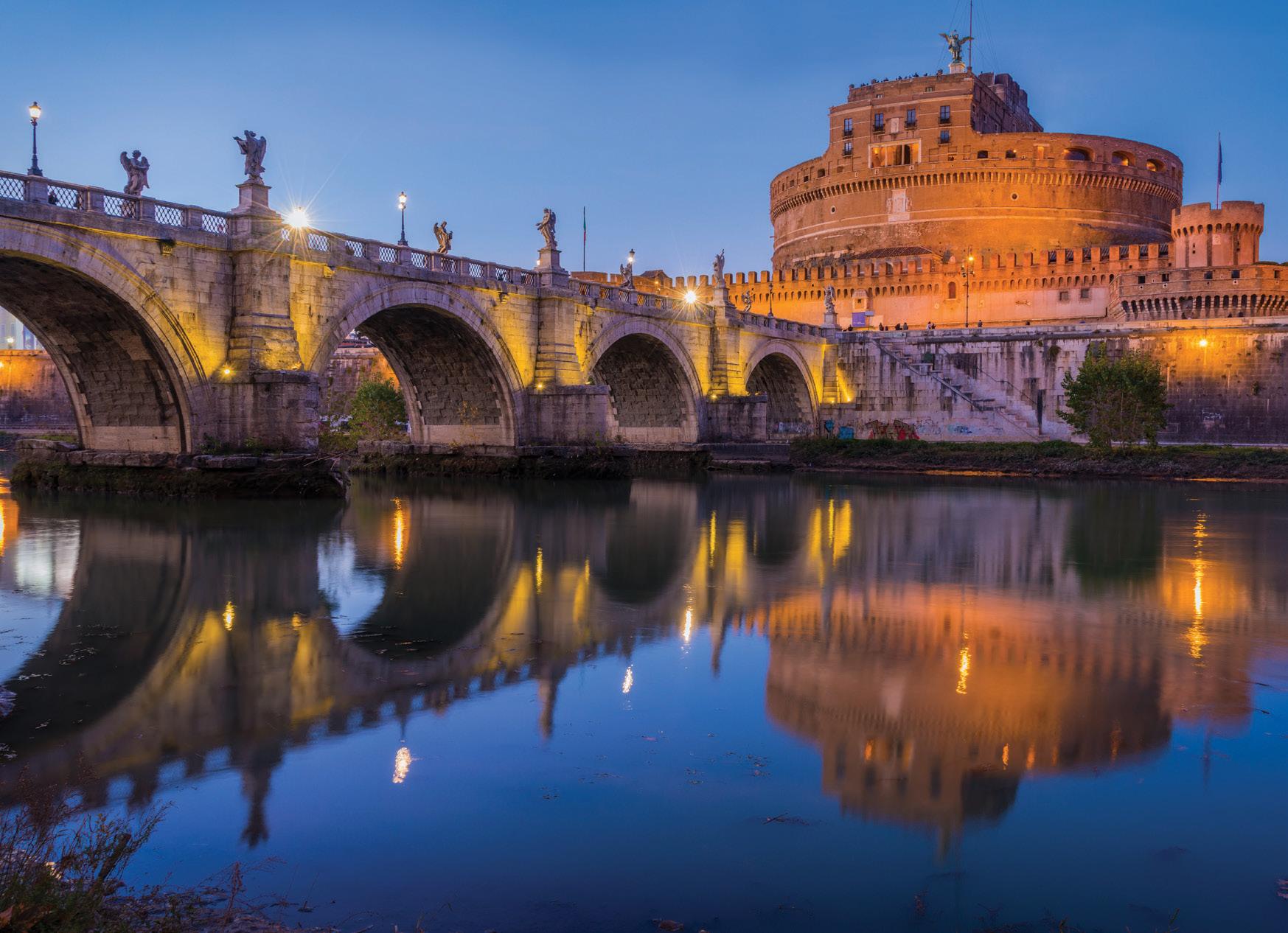
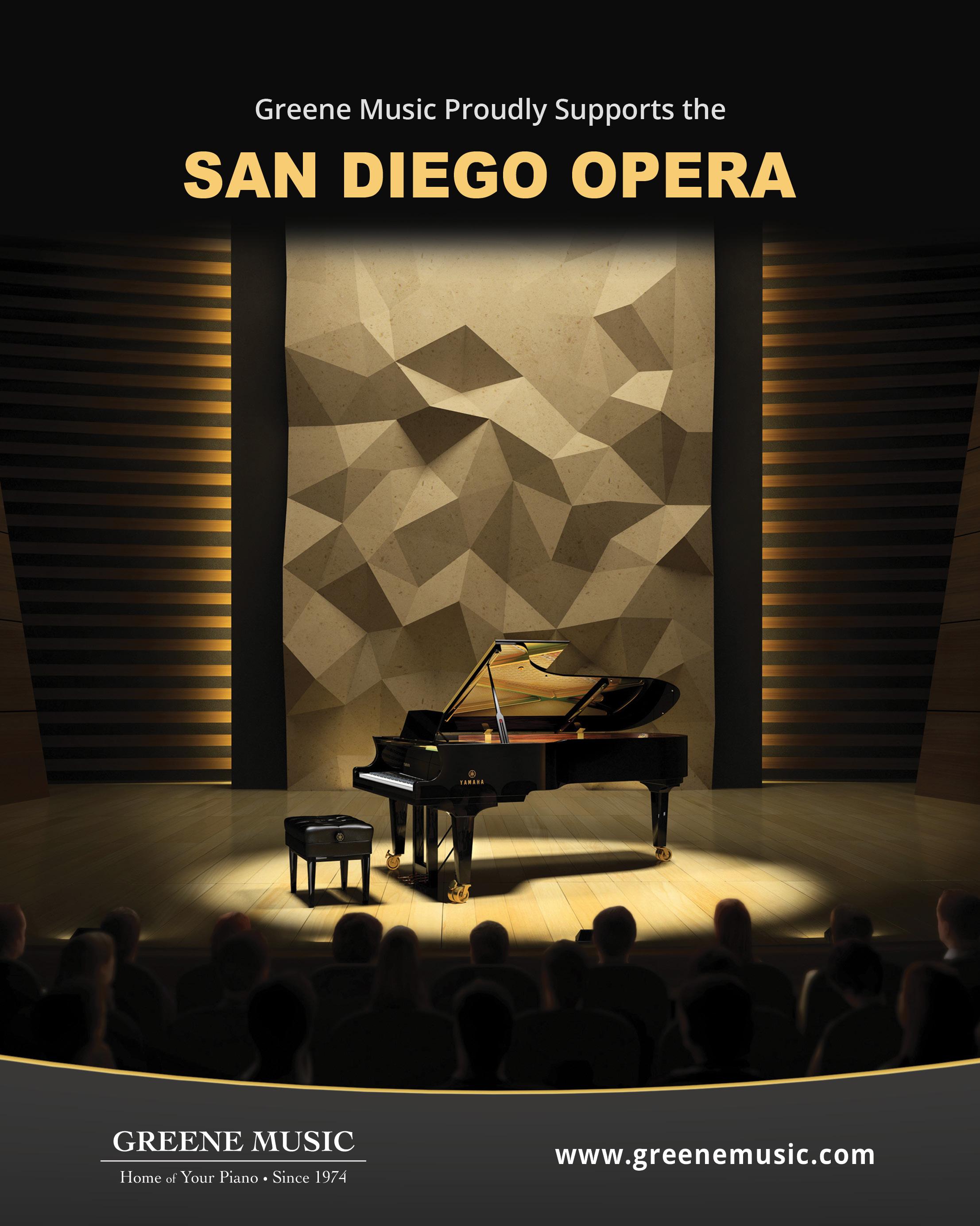










Sign up to get arts and culture news, events, profiles and insights delivered to you weekly in the KPBS Arts newsletter written by the KPBS Arts Calendar Editor. Visit and sign up for our newsletter at kpbs.org/arts




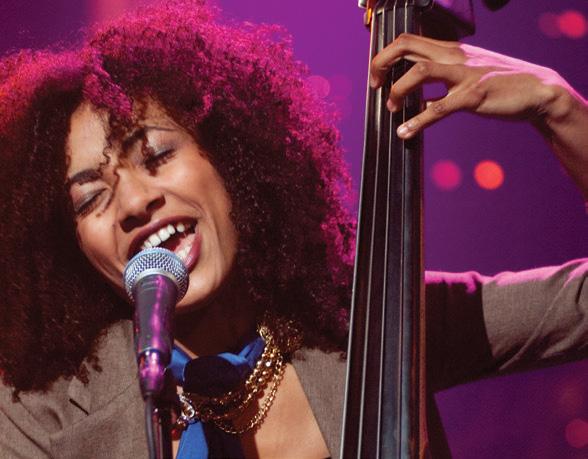

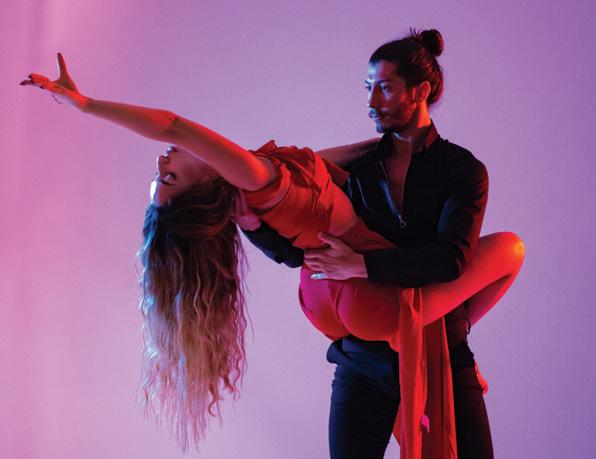
PROUDLY HELPING THE SAN DIEGO OPERA FILL THE HOUSE THROUGH THE POWER OF OUT-OF-HOME
Mexican folklore cliché or massive media exploitation of Frida’s and Diego’s life and image. We wanted to create our own vision of this particular and beautiful story.
The whole creative team of The Last Dream of Frida and Diego represents eight or nine different cultures, nationalities and artistic sensibilities. I am a Mexican stage director directing the opera of a Peruvian American composer with a Cuban American librettist, depicting two cultural icons that represent so many different communities. Well, this is what the world looks like now. Not only do we live in a globalized world, but we live in a multicultural one; all the American Continent is a melting pot. We are a mixture of races and cultures, migrations and indigenous people, from Alaska to Patagonia. We are all mestizos in a sense.
I believe projects like this can help advance diversity and inclusion, helping us understand our different cultures and shared humanity. We can genuinely connect through art, discovering and celebrating our differences with respect, and recognizing ourselves in others. We must embrace diversity and inclusion to live peacefully and prosper. I hope this opera can help bring San Diego‘s communities closer and welcome new audiences to the opera. I hope that Mexicans and Americans feel proud of such a rich and distinctive heritage that belongs to all of us.
y depurado, evitando reproducciones textuales y la habitual interpretación del cliché del folklore mexicano o la explotación masiva de los medios de la vida e imagen de Frida y Diego. Queríamos crear nuestra propia visión de esta particular y hermosa historia.
Todo el equipo creativo de El Último Sueño de Frida y Diego representa ocho o nueve culturas, nacionalidades y sensibilidades artísticas diferentes. Soy una directora de escena mexicana, que dirige la ópera de una compositora peruana estadounidense con el texto de un libretista cubano estadounidense, contando la historia dos íconos culturales que representan a tantas comunidades diferentes. Pues así es como se ve el mundo ahora. No solo vivimos en un mundo globalizado, sino que vivimos en uno multicultural; todo el Continente Americano es un crisol. Somos una mezcla de razas y culturas, migraciones e indígenas, desde Alaska hasta la Patagonia. Todos somos mestizos en cierto sentido.
Creo que proyectos como este pueden ayudar a promover la diversidad y la inclusión, ayudándonos a comprender nuestras diferentes culturas y nuestra humanidad compartida. Podemos conectarnos genuinamente a través del arte, descubriendo y celebrando nuestras diferencias con respeto y recono ciéndonos en los demás. Debemos abrazar la diversidad y la inclusión para vivir en paz y prosperar. Espero que esta ópera pueda ayudar a acercar a las comunidades de San Diego y dar la bienvenida a nuevas audiencias a la ópera. Espero que los mexicanos y los estadoun idenses nos sintamos orgullosos de tan rica y distintiva herencia que nos pertenece a todos.
Where to begin with Diego Rivera and Frida Kahlo? Where to take the first step into the dazzling universe that is the work and life of these two profoundly complex, contra dictory, multifaceted figures? Figures whose work is, moreover, inseparable from their lives so many times. The best thing to do is, to begin with, the here and now. Let us begin with the dream, that state that is time outside of time.
Frida and Diego are, at some level, the material of myth in its purest sense, their limitless existences represent, from their roots to their vital sap, a breathing, living symbol. A symbol to which we turn our gaze in amazement. After all the stories, after all the tales told and retold, after all the films and all the reflections, there remain a woman and a man, two artists who, in the center of a world in violent historical transformation, raised a free imaginative universe, with its form, color, and languages.
At the very beginning of the creation of that universe, art was a central piece. It all begins when a young Frida dared to approach Diego to show him her work, he was already a consecrated and recognized artist, 21 years older than her. This was the starting point of a stormy vital and artistic adventure that united two such opposite personalities, who passionately and thoroughly explored all the labyrinths of the heart, even the darkest ones.
Perhaps the point of union between the two artists is found in the profound difference in their visions and artistic temperaments and reflecting a contrast in a dialogue between a very personal surrealism on the one hand, and muralism on the other. In such conversation, surrealism digs and finds its gold in the deepest interior of the psyche, and muralism projects on a large scale on the most visible walls a vision and a call for radical political and social change. Despite all their differences, surrealism and muralism are both revolutionary movements. Above all, they seek the destruction of the structures that oppress humanity to achieve life’s integral and complete transformation.
Moreover, beyond the framework provided by artistic movements and schools of thought, Frida and Diego are artists with unique and personal visions who also knew how to transcend and transgress classifications and pigeonholing when they limited their vision and creative passion.
Frida and Diego developed their art at a crucial moment in Mexican culture. After the triumph of the Mexican Revolution, Mexican artists and thinkers sought through their intellectual activity an identity of their own as people and a nation, observing themselves in the mirror of history and the present. It was a great moment of Mexican muralism as a movement, with three significant figures Diego Rivera, José Clemente Orozco, and David Alfaro Siqueiros. It was also the time of José Vasconcelos, Alfonso Reyes, Miguel Covarrubias, the literary group Los Contemporáneos. A moment of renewal in which Mexico and what is Mexican found its definition. Thanks to its intellectuals, a more precise, vigorous, richer, and complex definition of what the Mexican is, was reached. The work of the creators and thinkers of that intense period is profoundly national, and at the same time, profoundly universal, connected to the searches and concerns of humanity.
Today San Diego Opera offers us “El último sueño de Frida y Diego,” with music by renowned composer Gabriela Lena Frank and libretto by Pulitzer Prize winner Nilo Cruz. Special mention in a production of this nature centered on two visual artists, Frida, and Diego, deserves the scenery, illumination, and costume design created by a talented Mexican creative team that recreates the visual universe of Frida and Diego. At this point, it is crucial to recognize the efforts of San Diego Opera, under the leadership of its General Director David Bennett and the Hispanic initiatives Director Andrea Puente-Catán, building ties and bridges of artistic cooperation with Mexico through numerous successful initiatives and projects. This cultural organization has developed a necessary model of cooperation at the international level, worthy of being replicated in other latitudes. Opera is a privileged instrument of cultural diplomacy and dialogue between peoples. Through its work, San Diego Opera has provided us with an excellent example, at the binational and cross-border level, of what can be achieved in this regard.
The double brilliance Frida Kahlo and Diego Rivera discovered in their art and lives continue to reach us.
A brilliance by destiny united them, and from then on, they kept nurturing each other. Today Diego and Frida return, although their light has never left us. The place and time to see and hear Frida and Diego are here and now: In the dream that is about to begin.
¿Por dónde empezar con Diego Rivera y Frida Kahlo? ¿En dónde dar el primer paso para internarse en el universo fulgurante que es la obra y la vida de estas dos figuras, profundamente complejas, contradictorias, multifacéticas? Figuras cuyo trabajo resulta, además, inseparable de sus vidas, tantas veces. Lo mejor entonces será comenzar por el aquí y el ahora. O sea, comenzar por el sueño, ese estado que es tiempo fuera del tiempo.
Frida y Diego son, en algún nivel, materia de mito en su sentido más puro, es decir, sus vidas inagotables representan en su raíz y savia un símbolo vivo. Símbolo al que volvemos la mirada con asombro. Después de todas las historias, después de todos los relatos contados y vueltos a contar, después de todas las películas y todos los reflejos, quedan una mujer y un hombre, dos artistas que en el centro de un mundo en violenta transformación histórica, levantaron un universo imaginativo libre, de forma, color y lenguajes propios.
Y en el inicio mismo de la creación de ese universo, estuvo el arte, en el momento en que la joven Frida se atreve a acercarse a Diego, el admirado artista ya consagrado, 21 años mayor que ella, para mostrarle su trabajo. Ese fue el punto de inicio de una tormentosa aventura vital y artística que unió a dos personalidades tan aparen temente opuestas, que exploraron con pasión y a fondo todos los laberintos del corazón, aún los más oscuros.
Es tal vez en la profunda diferencia de sus visiones y temperamentos artísticos que se encuentra el punto de unión entre ambos artistas. En la contraposición y diálogo de un personalísimo surrealismo -que excava y encuentra su oro en el interior más profundo de la psique- y en el muralismo -que se proyecta a gran escala en las paredes más visibles una visión y un llamado al cambio político y social radical-. Porque surrealismo y muralismo, pese a todas sus diferencias, son movimientos revolucionarios que, ante todo, buscan la destrucción de las estructuras que oprimen al género humano, para lograr la transformación integral y completa de la vida.
Y claro está, más allá del marco que nos proporcionan los movimientos artísticos y las escuelas de pensamiento, Frida y Diego son artistas con visiones únicas y personales que también supieron trascender y trasgredir las clasificaciones y los encasillamientos cuando estos limitaban su visión y su pasión creativa.
Frida y Diego desarrollaron su arte en un momento crucial de la cultura en México. Tras el triunfo de la revolución mexicana, los artistas y pensadores mexicanos buscaron a través de su actividad intelectual una identidad propia como pueblo y nación, observándose en el espejo de la historia y el presente. Fue el gran momento del muralismo mexicano como movimiento, con las tres grandes figuras de Diego Rivera. José Clemente Orozco y David Alfaro Siqueiros. Pero también, fue el momento de José Vasconcelos, de Alfonso Reyes, de Miguel Covarrubias, del grupo literario Los Contemporáneos, etc. Un momento de renovación en el que México y lo mexicano encontraron, gracias a sus intelectuales, una definición más precisa y rica, más vigorosa y compleja. La obra de los creadores y pensadores de aquel intenso período es profundamente mexicana, y al mismo tiempo, profundamente universal, conectada a las búsquedas e inquietudes de la humanidad.
Hoy la Ópera de San Diego nos ofrece “El Ultimo Sueño de Diego y Frida”, con música de la renombrada compositora Gabriela Lena Frank y libreto de Nilo Cruz, ganador de un Pulitzer. Mención especial en una obra como ésta, centrada en dos artistas visuales, merece la escenografía, realizada por un talentoso equipo creativo mexicano que recrea el universo visual de Diego y Frida. Y en este punto, es importante reconocer los esfuerzos que la ópera de San Diego, bajo el liderazgo de su director David Bennett y de la directora para iniciativas hispánas Andrea Puente-Catán, han llevado a cabo al tender lazos de cooperación artística con México, a través de numerosas iniciativas y proyectos exitosos. Así, esta organización cultural ha desarrollado un necesario e importante modelo de cooperación a nivel internacional, digno de ser replicado en otras latitudes. La ópera es un instrumento privilegiado de diplomacia cultural y diálogo entre los pueblos y, a través de su trabajo, la Opera de San Diego nos ha brindado un excelente ejemplo, a nivel binacional y transfronterizo, de lo que puede lograrse en este sentido.
Nos sigue alcanzando el doble fulgor que descubrieron en su arte y en su vida Frida Kahlo y Diego Rivera. Fulgor que por destino, en algún momento unieron y a partir de ahí, mantuvieron paralelo, nutriéndose uno del otro. Hoy Diego y Frida vuelven, aunque en realidad, su luz nunca se ha ido. El lugar y el momento de ver y escuchar a Frida y a Diego es aquí y es ahora. En el sueño que está por comenzar frente a nosotros.
Candace Carroll Esq. and Len Simon Esq.†
Eleanor Hutchinson Parker Foundation†
Kathryn Hattox Charitable Trust Willis Jerry Larkin* Carol Anne Lazier†
OPERA America: Innovation Grants and Ann and Gordon Getty Foundation
Allison and Robert Price Family Foundation†
Qualcomm Inc.
Stacy and Don Rosenberg†
The San Diego Foundation
Darlene Marcos Shiley†
$50,000 – $99,999
Sherry and Kevin Ahern†
Fundación Coppel
Agustin Coppel
Lee and Frank* Goldberg†
Karl and Greet Hostetler†
The Joan and Irwin Jacobs Fund of the Jewish Community Foundation†
Paula Landale†
Sarah B. Marsh-Rebelo, G.G. and John G. Rebelo†
James A. Merritt † Claire Reiss†
Sempra Energy
Maureen and Thomas Shiftan, M.D.†
Lou Alpinieri in loving memory of Brenda Alpinieri †
American Endowment Foundation
Sigrid Pate Butler†
Joann Clark†
Dr. and Mrs. Richard Claytor†
James and Kathryn Colachis Fund at The San Diego Foundation†
Anna M. Curren†
Gwyn Enright*
Joan Henkelmann, in memory of Dr. Charles Henkelmann†
Ann and Andy Irwin†
Robert H. Kaplan, Ph. D. and Marina Baroff † Marilyn Kneeland*
Veronica and Miguel Leff † Dr. and Mrs. Ronald G. Leonardi †
Jacqueline B. Mars†
Drs. Roger and Linda Mills†
Paul, Weiss, Rifkind, Wharton, & Garrison
William and Clarice Perkins†
Nicolas Reveles†
Drs. Gloria and Joseph Shurman† Karen Valentino†
Cynthia Walk† Janet and Jonathan White†
$15,000 – $24,999
Dan Cameron Family Foundation† Teresa Fischlowitz†
Barbara Hench*
Lachman Family Foundation†
Joseph Martinez
Anne and Andy McCammon† Swanna and Alan Saltiel from the Dan Cameron Family Foundation†
William D. Smith and Carol A. Harter†
Linda P. Spuck†
U.S. Bank
Mary L. Walshok, Ph.D.† Ms. Mona Wolpe
Sara Zaknoen, M.D.†
Anonymous (2)†
Jim Algert* and Maurine Beinbrink† Robin L. Allgren†
Bobbie Ball-Bradley† Bank of America
Leslie Bassett†
Ingrid Benirschke and Gordon Perkins
Margaret L. Boyce*
Judith V. Brucker†
DLA Piper
Donna Van Eekeren
Gertrude Fletcher †
Sally and Einar Gall †
Barbara Kjos†
Mrs. Charlotte Laverents* Ruth I. Ledermann†
Eli and Diana Lombrozo†
Elizabeth Wohlford MacLeod†
David Michael
Haydee and Carlos* Mollura†
John and Dianne Moores
Jane Polgar in memory of Peter Polgar†
Peter and Peggy Preuss†
Dr. Benjamin Ramirez and Ross Russell †
Ruth Reznikoff*
Elyssa Rosenberg and Dr. Lucian Iancovici
Sue Sesnon Salt†
Seltzer Caplan McMahon Vitek Susan and Fred Smith†
Sopranos Investment Group, in memory of James Forbes† Stainrook Foundation†
Marc and Eva Stern
Susan and Richard Ulevitch† Mary Urquhart
Patrick Abbott † Richard R. Abello† Lisa and Ben Arnold Warren and Eloise Batts†
Doug Bekkedahl †
David Bennett †
Carolyn and Giovanni Bertussi † Paul L. Black and Evelyn Truitt †
Mary Ellen Clark
James M. and Lynn B. Caughey†
CBR International
Susan H. and Stephen Childs†
Congregation Beth El Sally Cuff†
Martha and Edward Dennis† Michael Dessert †
Alberta Feurzeig†
Joyce M. Gattas, Ph.D.†
Peter C. Gernold and Brian J. McGoldrick †
Lee and Linda Gillard †
Ginger E. & Robert D. Wallace Foundation
T. George and Jeannie Harris†
Charles T. Hendrix†
Harry and Teresa Hixson† Dr. Steve and Nancy Howard †
James Idell and Deborah Streett-Idell†
David S. Johnson†
David K. Jordan†
Matthew and Angela Kilman†
Lynn Kirkhofer†
Aline and Gert* Koppel †
Gale M. Krause†
Linda Levy and Edward McGrath†
Carl B. and Janet Lind †
Jeannette and Warren Martin†
Eugene and Rebecca Mitchell †
Jerome J. Morrow in memory of Ethel Morrow†
James and Melanie Nickel † Michael Novak Joseph and Karen Panetta Bev Papas
John and Diane W. Parks† Carolyn and Ed Parrish† James Robbins†
The Sack-Meniktos Family Foundation
The Sandler Group
Leland and Debbie Sandler Sharp HealthCare
Geri Sherman*
Sylvia M. Smith†
Jeannette R. Stevens†
Sycuan Casino
Robert and Tamara Thibodeau†
Shirli, Damien, and Justin Weiss†
Robert and Jean Will †
Armi and Al Williams†
WuXi AppTec
Carmen Figueroa Young Leo and Emma Zuckerman†
Wallace Brithinee and Bernadette Belleci †
Mrs. Marlin W. Brossart† Bill Carrick†
Richard and Stephanie Coutts†
Jon and Karen Dien Stephen and Roberta Edelstein†
Drs. Milton & Susan Erman
Donald and Mary Ellen Fleischli † Steven Hadfield †
Cherie Tirschwell Halladay
Mrs. Shirley F. Hoggatt † Terry Lynn Holland Gary Jacobson and Martha Blake Jacobson† Lynn Kirkpatrick
Nancy E. Kossan, Ph.D. and Deborah Macdonald† Grace E. Larsen†
Juan* and Alexis Lasheras† Edward and Nancy Lyon Neil Malmquist and Scott Crispell
Ilene Mittman in memory of Dr. Charles Mittman† Toni Jean Monise
John Newsam and Sharon Wampler
William and Jensine Nolan† Dr. Rebecca Papendick and Jay Savage† Coreen Petti †
Jeannie Posner & Nancy Muller Bruce S. Ross and Eileen F. Gallo-Ross†
Carol and Jack Sanders† Debra Shannon† Susan and Dr. Gary Spoto† Annalisa Storchi †
Margaret C. Tessier and Robert J. Griffin†
Karin Winner
Anonymous†
Irene Abraham and Gabriel Vogeli †
Patrick Anderson and Lester Olson†
Brenda Baker and Steve Baum
Jane and Bob Bell †
Jack and Sue Ellen Benson†
Dr. Fred and Mrs. Donna Berger†
Cindy Bruecks†
Stephen Burgdorf †
Constance Carroll, Ph.D.† Keith Chen†
Ann Craig†
Ron and Elizabeth Davidson Karen DeLaurier and Oliver McElroy†
In memory of Joseph and Vivian Doering†
Dr. Leroy M. Dorman†
Margot and Dennis Doucette
Drs. Brent and Sarita Eastman†
Mrs. Phyllis Epstein
Dr. Barbara Favorito and Ms. Judith Hairston†
M. Carr and Marian N. Ferguson†
Socorro Fimbres†
Forsyth Leonard Fund at Rancho Santa Fe Foundation
Ronald Franzese
Joyce Glazer†
Jose Luis Gonzalez
Matthew and Jodie Graber
Josh Gruenberg
Joleen Guckian
Mr. and Mrs. Hale Megan Heine
Sachiko Kohatsu and Tom Held
Herbert B. Hoffman†
Joanne C. Hutchinson and David Cooper*†
Ronald Ignelzi
Mrs. Phyllis Ingram†
Johnson & Johnson PRD, L.L.C.†
Dr. Natasha Josefowitz†
Mel and Linda Katz
Mr. and Mrs. John Kesser†
contributions over last
years
Richard and Carol Kornfeld
Stephanie Kourie
Irene Kuster McCann†
Paul Laikind and Lisa Stennes-Laikind
Belina L.* & Paul L.* Lazzar
Kathleen Loftman†
Elaine B. Marteeny†
Beverly and Harold Martyn†
In memory of Elizabeth B. Meyer Mauricio Monroy
Chandra Mukerji †
Brian Munden
Arman Oruc and Dagmar Smek
Bob Palmer†
Bernard Paul †
Congressman Scott Peters and Lynn Gorguze
Keith I. Polakoff †
William Purves and Donald Schmidt Jay Rains
Red Door Interactive
Ms. Kathleen Roche-Tansey† Eberhard and Jessica Röhm
Ted Roth
Dr. Ross and Nancy T. Rudolph Jukka Saukkonen and Velva Wood †
Margaret R. and Neal Schmale
Alan J. Schuyler †
Barbara Bry and Neil Senturia David and Miriam Smotrich
Carol Jean Spicer †
Robert J. Stall, Jr. & Katherine Nutting†
Tregar & Rob Strasberg
Kathleen Sullivan
Dr. Fred and Erika Torri †
Sotirios Tsimikas
Christopher Wahl
Captain & Mrs. Don Watkins, USN (Ret.) †
David Winkler
Ann L. Zahner†
Xinhua Zheng and Richard Studer Philip and Phyllis Ziring†
K. Andrew Achterkirchen†
Ashley and Brendan Ahern Brianna Ahern
John and Sophia Alessio Soraya and Hank Alexander June and Daniel T. Allen† Sandra and Earl Altshuler
Patricia R. Alvarez
Amber Anderson
Barbara G. Anderson Mireille Anderson†
Raedel Calori and Backman Family
Carolyn Balkwell†
Melora Balson
Mr. and Mrs. Michael Bardin† Scott Warren Barnard † David Bevilaqua and Craig P. Caldwell † Bill & Melinda Gates Foundation Nancy Laturno Rocky and Alicia Booth† Michael and Jane Burke† Mary-Kay Butler†
Amy and Reid Carr Ned and Anne Chambers Neal Chazin
Judy Churchill †
Madeleine Cranfill
Ginger Csizmadi Mike and Anne Dessert
Wally and Linda Dieckmann† Richard G. Dooley
RayMonda Duvall†
John* and Barbara Edgington†
Alfred F. and Karin Esser
The Etess Family Fund of the Jewish Community Foundation†
Dr. Connie J. Evashwick
Elsa Feher †
Elissa and Richard Finerman† Carol Ann Flanagan†
Jean Fort †
Paul and Gayle Ganster
Richard Ghalie†
Jeannie Gleeson
Michael and Brenda Goldbaum†
Dr. Laurie Greenberg
Carrie and Jim Greenstein†
Michael and Margaret Grossman Michael B. Harris
Alberto and Martha Hayek
Karen and John Hayes†
Jay Henslee
Don and Celeste Hillman
Michael Homan†
Jim and Carmen Hughes
Valentin Isacescu, MD
Christie Iverson
Adrian Jaffer and Ann Laddon† Mr. Jay Jeffcoat
Jeannette S. and R. Douglas Johnson
Pamela Kaires†
Gina and Charles Kakos† John R. Kim
Carmela and Miguel Koenig Amy B. Kronick†
Lucy Labruzzo
Dr. William & Evelyn Lamden and Randolph & Dr. Carol Lamden Corby†
Lance Barbone†
Dennis C. and Kathleen Lees†
Ellen Lehman and Charles Kennel †
Anthony W. Leonard and Jin-Soo Kim†
Ae Soo Lerche†
Dr. Stuart and Anne Marshall
David Marshman
Eileen Mason
Tina L. McArthur †
Brett McClain
Douglas M. and Paula A. McGraime Charitable Foundation†
Jack McGrory
Edward and Elizabeth McIntyre
Judge M. Margaret McKeown and Dr. Peter F. Cowhey
Mark Mead †
Sandra Miner†
Rena Minisi and Rich Paul †
Rev. Christopher Moore
David Morris
Gregory and Jennylee Nesbitt† Chuck and Ann Nickel †
James Niebling
Rev. Raymond G. O’Donnell †
Rachel Peniche
Michael Perkins and Anne Turhollow† Dr. Sandra Petersen and Tuba Jim† Darren and Bella Pfefferman
William R. Pond † Ms. Barbara Rabiner† Patrick and Marti Ritto
Lynn Rockwell † Julie and Bill Ruehle
Patricia A. Rutledge† Carol Saikhon
Hermeen Scharaga†
Doreen and Myron Schonbrun†
John Seal
Georgina Bien and Lu Sham†
Susan Shirk
Heidi Munzinger and John Shott
Portia Shumaker
Anne and Ronald Simon† Drs. Eleanor Smith and John Malone† Stephanie Stolarz-Fantino†
Gail and John Tauscher Justin and Leslie Tipp-Rebelo Anne S. Vafis
Nancy Walters
Nathan and Evette Weiss†
Barry Wellins
Mary Ann White and Lee Margot Carole Wilson and Robert Brandt †
Adam Winter Joseph and Mary Witztum†
William Wong
The Helene and Allan Ziman Fund of the Jewish Community Foundation†
Anonymous
Kathleen and Charles Ables†
Susan Barbey-Booth
Gaylyn N. Boone and James R. Dorcy† Corey J. Braun†
Barbara Campbell †
Jui-Yuan Chang† Karl and Joanna Cikste† Steve and Cathy Constable† Tracy Cooke†
Barbara Corcega
Linda Dawson†
Robert Dotson
Daryl E. Ferguson†
Catherine R. Friedman†
Alison and George Gildred † Frank L. and Katherine Greco
Edward S. Hand and Stanley C. Harazim† Bonifacio G. and Suzanne M. Hernandez†
Suzanne and Lawrence Hess† Sabrina Johnson
Kirby Kendrick and Robert McLeod† Helen and Webster Kinnaird† Frances and Jack Kyte Maria-Cristina Leon Joseph and Eva Leonard † Rosemary and Scott Leonard † Bruce Ramet†
Michael J. Rensink†
Todd Schultz Bruce E. Shirer, M.D.†
Debbie Sigal
Rebecca Smith and Tom Tseng† Elizabeth and Lester Stiel† Alamanita Ellis Stjerne and James Stjerne†
Jennifer Thomas
Jeff and Cathy Tipton Nick Ennis and Erin Trenda
Robert* and Aysegul Underhill
Gretchen Vik and Larry Clapper† Helen Wagner† Carol Wallace Suhaila White†
$300 – $599
Anonymous (5)†
Sarah Agler†
Dixie Albright and David Wells
Robert and Meredith Alcock† Sibille Alexander and Gisela Seidensticker†
Gary Allard
Mr. Ronald G. Allen and Mr. Lindsay R. Fong†
Andrea Alpinieri-Glover and Adam Glover
Elizabeth Andersen†
J. David Archibald and Gloria E. Bader†
Sharon Barton†
Dr. Liliana Binner† Paul L. Bishop†
Lois Bloom†
Dallas Boggs and Susan Fellows† George Boomer and Caroline Chen Katie M. Boyer†
Justin Brent and Gordon L. Myers† Dr. Mary Ann Calcott †
Jeffrey & Katherine Calkins† Kathleen Camac
Barbara Carlton
Margarita I Carmona Lillie Chuck Cattran† Janet Caulk†
Danielle Cervantes and Michelle Gilchrist †
John and Becky Chamberlain
Lynne M. Champagne and Wilfred S. Kearse†
June Chocheles
John Cochran and Sue Lasbury
Patricia Coffey† Anne Colburn†
Donald Coleman Judith H. Collier
Robin and William Comer ConocoPhillips†
Rilla and Denis M. Crane†
Robert Croke†
Richard Crosland †
Patricia A. Crowley†
Loyal contributions over last 5 years | *deceased
Diane and Norman Cullen†
Susan Davis
Douglas P. Doucette†
Dr. and Mrs. Edward J. Doyle
John C. and Deborah Dunbar Serina Durand
Patricia and Jack Eldon† Christopher Elser Roswitha Enright † David J. Erikson†
Jeffrey Esko†
Hester Evans Kevin Faulconer
Dieter Fischers’ Mercedes Srv. Inc.
Julia Foster Francis Gabbai † Elizabeth Giammona†
Steve Gildred
Marcia and David M. Gill †
Wayne Glad and Carol Becker Douglas and Ellen Goepfert Bar Giora Goldberg
Maxine* and James Hall †
Robert H. Halleck
Alexander Harper Mary Hazzard †
James P. Healy† John Hermann†
Norma Hidalgo Del Rio Betsy, Bob and Phil Himelstein in memory of Judy Himelstein Anne Hoiberg† Dee-Hua Huang and Swu-Jane Lin Jerri Hunt
Patrick J. Hurley†
Linda P. Ivor and Chris Steinhardt Ken Jackson
Edward and Linda Janon†
Miriam Kastner†
Jo Kiernan and Bjorn Bjerede†
Hyunchul and Wanhea Yuk Kim Daniel Kopti†
Roberto and Elena Kucinski
Marilyn A. Lamb† Kathy Lazzaro†
Elizabeth B. Leech
Felipe and Susana Leff †
Kathleen LeMieux
Judy and Jack Leshefka† Charles S.* and Robin Luby† Helga Lupu†
Nicolae Lupu†
Susan Marberry†
Said and Roswitha Marouf Betty and Jim Martin Nancy Martin
Marie Mateo Caroline Matthews Patricia S. McAfee†
Lisa McCann
Laurel McCrink†
Matt McGrath
Michael McMillan
Michael and Kimberly McSherry† Michael S. and Jessica Middleton† Michael Miekina
Grant J. Miller† Millipore
Lynn and Trudy Mitchell† Chris Montgomery Cheryl Morabito†
Justin Morello Karen and Joseph Morse†
Martin Nass Larry Nishnick Teresa A. Norton† Julie Nydam
Terren and Bill O’Connor Michael & Elizabeth Oldstone Ximena Olea Jean M. Oswalt † Scott Paine Maxwell Paley Richard and Patricia* Perlman†
Virginia Perrin†
Judith Persky
Mary Yankee Peters and John David Peters†
Angy and Chris Peto
Sally Schwerdtfeger, Ph.D.
Beverly Phillips Henry and Mary Powell
Drs. Jenny Price and Tony Hunter
Eve Pritchard †
Dennis Ragen and Christine Hickman† Robert Ramos
Susan A. Ranft †
Audrey S. Ratner Dr. Pavel Reddy
Dr. and Mrs. H. Kent Reed Douglas Rein
Betty Reynolds William and Joyce Ritz† Rosalba Rodriguez Trevor Roper
Norman M. and Barbara Rozansky† Richard Salmon Betty Schulman
James E. Schwartz†
The Richard L. Shapiro Charitable Fund †
Michael & Sheila Sharpe Ms. Bridget Slatten† Ronald L. Smith† Maida Soghikian†
Mr. Robert J. Sokolowski and Mr. John J. Winkelman Dr. Stanley Sollie† Heidi and David Stadel Valerie A. Stallings Scott and Jan Steele† Janis and David Steller Elise Streicher and David Huffman† Peg Sweesy† William G. Tong Michaeleen Trimarchi Dr. Phyllis Tyson E. S. Urueta-Ruiz
Frederique Vernhes†
Rava Villon and David Duke† Kathleen C. and Thomas N. Volle† Nancy Ward † Mr. Jeffrey Webdell Mr. Eliot Weitz Dr. Ian A. Wilson Victor and Dolly Woo Peggy Yamamoto† Joseph A. Zechman† Capt. and Mrs. Herb Zoehrer
We hope the reference points and themes described below encourage you to make connections between Dia de los Muertos, your own experiences and practices, and this world premiere of El último sueño de Frida y Diego.
“Is it not death we live for?” – Nezahualcoyotl (Fasting Coyote). From the 16th-century Codex Ixtlilxochitl.
Mictecacihuatl, a symbol for mother earth, swallowing a person into the spirit world. From the 16th-century Codex Borgia.
In pre-Columbian central Mexico, the Aztecs held a monthlong ceremony which brought Tenochtitlan, one of the largest cities in the world at the time, to a halt. Significant similarities exist between today’s Dia de los Muertos and traditional Aztec culture. For example, the marigold flower (in Nahuatl: Cempasúchil, meaning the 20th flower, referring to its place on the Aztez calendar and symbolizing transition) represents grandfather sun’s rays and how the sun’s hands are on the earth. Ancestors travel on these rays to visit the living during Muertos. Today, marigold petals are placed on the driveway and through the doorway to lead ancestors into the home and to the altar (ofrenda).
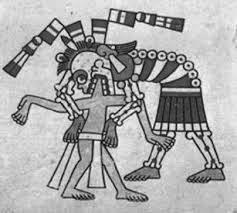
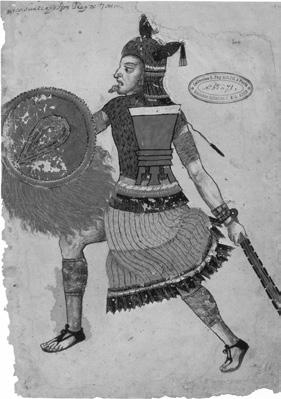
• We are only here for a short time
• To enjoy life, to celebrate, to laugh
• Death accompanies us throughout our life
• To take the time to honor our ancestors by creating an altar or a space for them
• To connect with our ancestors and remember the moments of our journey with them
• Death and conversations about death are normalized
• The circle of life and the reality of death is acknowledged
• We are all on the same journey, do not be afraid of death
• Young and old have opportunities to learn more about who and where they came from
• Families feast together, set aside food for ancestors who come to visit, and share what they have with others as a way to give back to their community
Dia de los Muertos is one of many ceremonies practiced today by indigenous people throughout the Americas.
Janet White, M.A., M.B.A., CSci., F.R.S.C., President
Sarah B. Marsh-Rebelo, G.G., Chair of the Board
Barry Wellins, Executive Vice President
Stacy Kellner Rosenberg, Vice President, Finance
Candace Carroll, Secretary/Parliamentarian
Hope Carlson, CFP®, CAP®, MBA, MM
Joann Clark
David Duthu
Joan Henkelmann
Karl Hostetler, M.D. Robert Kaplan, Ph.D.
Carol Lazier
Veronica Leff, M.A.M.
Ronald Leonardi, Ph.D. Joseph Martinez
Brett McClain
Mike Novak
Clarice Perkins
General Director David Bennett
Principal Conductor Yves Abel
Chief Operations & Financial Jeannie Posner, CPA Officer, Safety Officer
Business Analyst Mario Adame
Staff Accountant Claudia Diaz-Acevedo
IT Administrator Joseph Huitzil Administrative Assistant Angelica Mondragon Senior Accountant Bill Schmalkuche
Company Photographer Karli Cadel
Chief Marketing Officer Matthew E. Graber
Group Sales Vanessa Dinning Marketing Operations Greg Watkins
Director
Media Relations Director Edward K. Wilensky
Education Director John Gabriel
Teaching Artists Bill Caballero, Karina Vanessa Flores Cabrera, Jessica Cortez, Karen Garcia, Philip Gómez, Devon Guthrie, Samira Hassan, Inocente, Shayla James, Precious Letchaw, Joey Molina, Xiomara Pastenes, Cuez G. Rodriguez, Rebeca Tamaz, Hector Villega
Coreen G. Petti
Claire Reiss
Gloria M. Shurman, Ph.D. Linda Spuck
Mary Lindenstein Walshok, Ph.D.
Teresa Fischlowitz
Lee Goldberg
Harry F. Hixson, Jr., Ph.D.
Sarah B. Marsh-Rebelo, G.G.
HONORARY DIRECTOR
Dame Zandra Rhodes
Director of Patron Services Cliff Thrasher Box Office Manager Erin Oleno Patron Services Associate Matt Kissel
Interim Chief Peter Shavitz Development Officer Development Operations Manager Kevin Boudoin Director of Special Events Darin Dietz Development Associate Elizabeth Fittro Institutional Giving Officer Joleen Guckian Director of Major Gifts Andrea Puente-Catán and Hispanic Initiatives
Production Director Joan T. Foster Technical Director Tim Wallace
Associate Production Director Linda S. Cooper Chorus Master/Cover Conductor/ Bruce Stasyna Musical Preparation Artistic Administrator Jordanna Rose
Resident Stage Director Alan E. Hicks Lighting Director Jason Bieber Stage Manager Nathan Brady Assistant Stage Managers Megan E. Coutts, Lauren Cernik-Price
Production Assistants Lucas Gomes, Giancarlo Acosta Super Captain Jesi Betancourt
Costume Director Ingrid Helton
Costume Assistants Sonja Helton, Regan McKay
Costume Shop Manager Lupita De La Mora
Drapers Anastasia Pautova, Joanna Stypulkowska
First Hand/Millinery Sharon Granieri
First Hands Laura Dillemuth Kozak, Susan Sachs
Stock Room Coordinator/Crafts Raven Winters
Asst Stock Room Coordinator Ginny McClure
Stitchers Stephanie Castro, Sadie Rothenberg, Rosa Sanchez, Veronica von Borstel, Christian Woods
Specialty Hair Crowns Megan Woodley
Wardrobe Head Mary Harris
Asst to Wardrobe Head Peggy Harrison
Wardrobe Stitchers Mary Jill Anderson, K-Joy Lehmann
Dressers
Jasz Bulan, Donna Couchman, Margaret Hagar, Robin Lemon, Pam Medhurst, Veronica Munoz, Sue Noll, Christi Stewart, Maggie Jo Turner
Scenic Studio Office Liora Naor Manager
Master Carpenter Jack Hernandez
Lead Carpenter Cory Klinge
Carpenters
Will Bender, Anthony Chambers, Rodney Foley, Ryan Monaghan, Sergio Pinales
Lead Welder Michael Moglia
Charge Artist Darin Hibi
Lead Scenic Artist Jessica Harriman Baxter
Scenic Artists Trent Greene, Samantha Leon, Courtney Ware
Master Carpenter Anthony Chambers
Flyman Michael Moglia
Assistant Flyman Thayne Greene
Property Master Antonia Hogue
Assistant Props Bradley Morrison
Master Electrician Richard Bonnin Assistant Electrician Leah Nellman
Board Operator JoAnne Stewart
Head Audio Mike Gustafson
Assistant Audio Krystin Cline Supertitles Franklin Gray
Designer
Jenn Hill Department Head Peter Herman
The mission of San Diego Opera is to deliver exceptional performances and exciting, accessible programs to diverse audiences, focusing on community partnerships, and the transformative and expressive power of the human voice.
San Diego Opera will be recognized globally as a leading example of adaptability, innovation and sustainability, promoting diversity on stage, in our repertoire, and in our staff and leadership, with a commitment to world-class and emerging talent, and innovative use of technology.
Through excellence in innovative programming and education and a commitment to equity, San Diego Opera provides a lasting cultural service to our diverse community.
• Our tradition of exceptional productions of grand opera is augmented with new expressions of opera in diverse settings.
• Our deep commitment to our community propels us to embrace inclusivity, accessibility and affordability.
• Through fiscal responsibility and nimble adaptation to changing environments, we ensure the future of San Diego Opera for our community.
OVERTURE serves young patrons of the arts who want a closer connection to the performances they love. This membership program allows young enthusiasts to engage more intimately with San Diego Opera and network with fellow art lovers during performances, receptions, and events. As an Overture Member, you will enjoy exclusive access to $45 tickets to San Diego Opera performances, and get to know other young performing art lovers in their twenties and thirties at private receptions and programs.
Overture is an important part of SDO’s philanthropic community. Your annual membership provides our artists, educators, and staff with reliable funding to meet the needs of our diverse audiences.
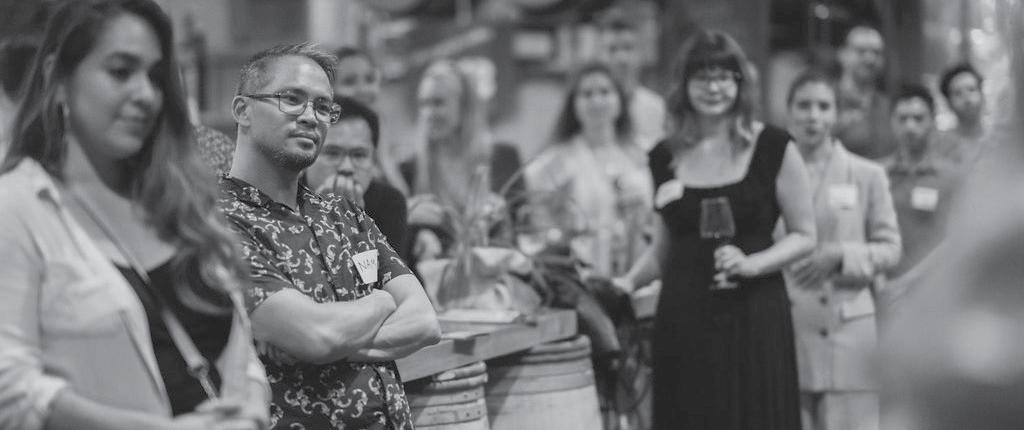
For just a $100 annual contribution, your member benefits include:
• $45 tickets for orchestra seats for any performance
• Pre-Show receptions
• Exclusive VIP bar area during intermission
• Invitations to Members-only events
• Donor Wall recognition for all Main Stage operas
Overture membership makes a great gift!
Make your $100 annual donation today to start enjoying Overture member benefits! Visit sdopera.org/overture or scan the QR code.


San Diego Opera General Director David Bennett and Chorus Master Bruce Stasyna invite you to support the San Diego Opera Chorus. The chorus and its members play an integral part of each performance and are vital to the success of the company. You can support a chorister of your choice for the season.
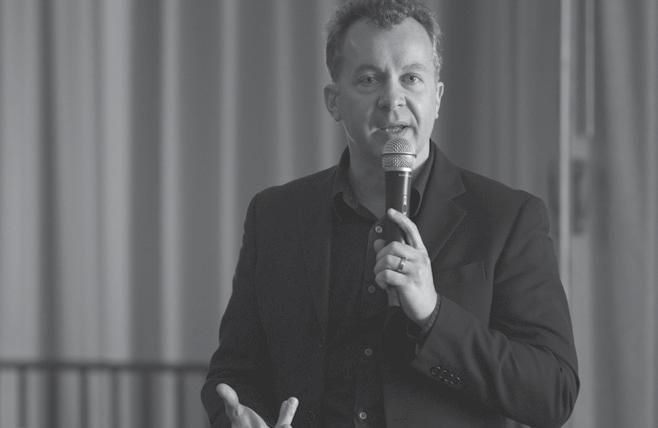

Enjoy a lunch with your chorister and, at the end of the season, a dinner with Bruce Stasyna, the chorus, and all sponsors.
For more information go to sdopera.org/support/connect-with-a-chorister/ or scan the QR code.
We each have our own unique story. And we’re ready to embrace new adventures. Wherever you’re coming from, whatever you’d like to explore next, there’s a Front Porch community to call home. A place where you can be exactly who you are. Front Porch senior living communities.

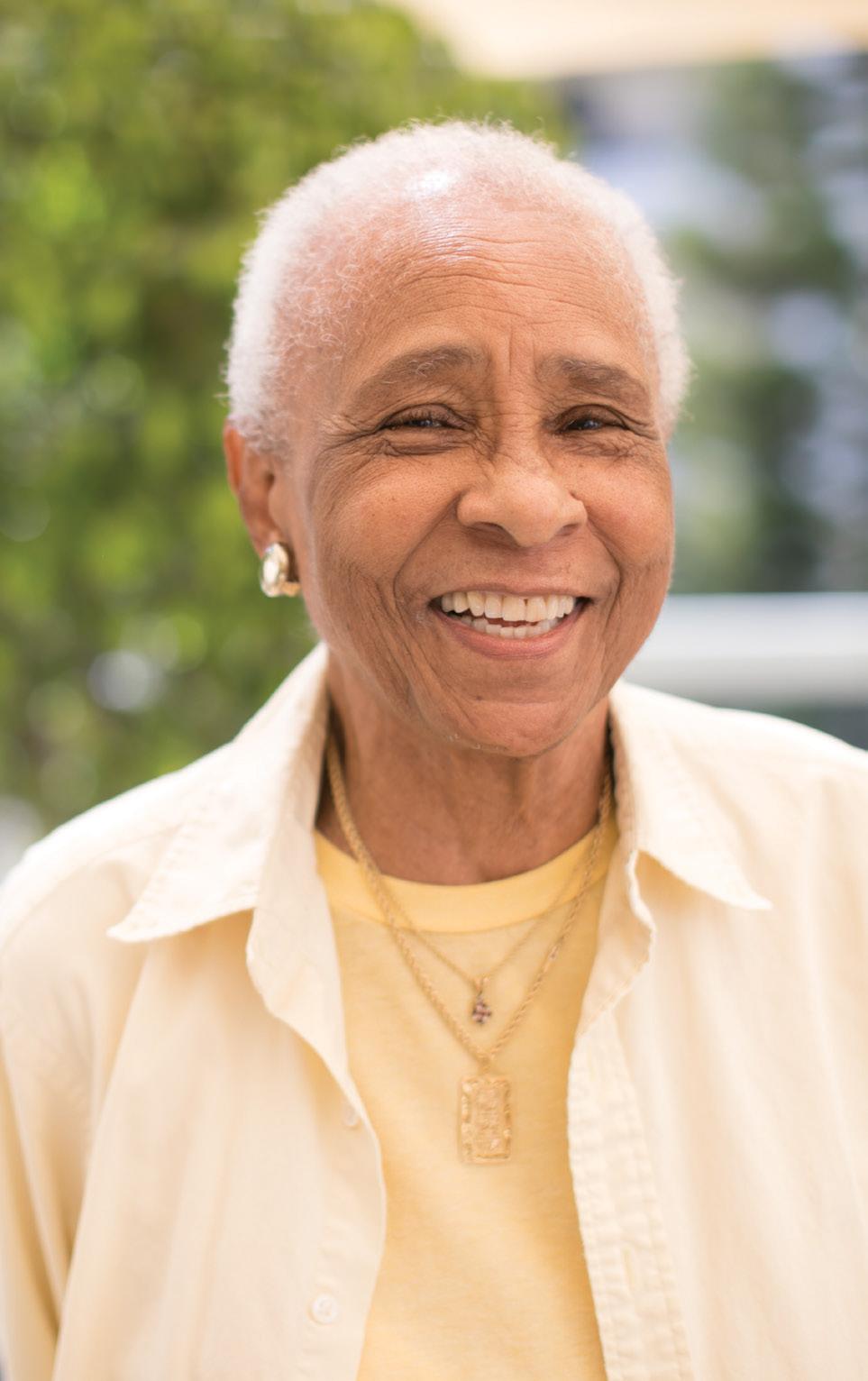
Carlsbad By The Sea Carlsbad, CA 800-255-1556 carlsbadbythesea.org
Casa de Mañana La Jolla, CA 800-959-7010 casademanana.org
Fredericka Manor Chula Vista, CA 800-310-4696
Wesley Palms San Diego, CA 858-274-4110
Meet the neighbors. Find your future Front Porch senior living community. fpretirement.net All communities are licensed in California.

From Italian hearth cooking in the heart of La Jolla, to a daily brunch cafe in Normal Heights, to an art gallery-meets-restaurant hybrid in Oceanside, San Diego is brimming with new dining and imbibing destinations across the county—from refined to casual to a “tropical space adventure” that is literally out of this world. Following are our picks for fabulous new outposts to try in November.
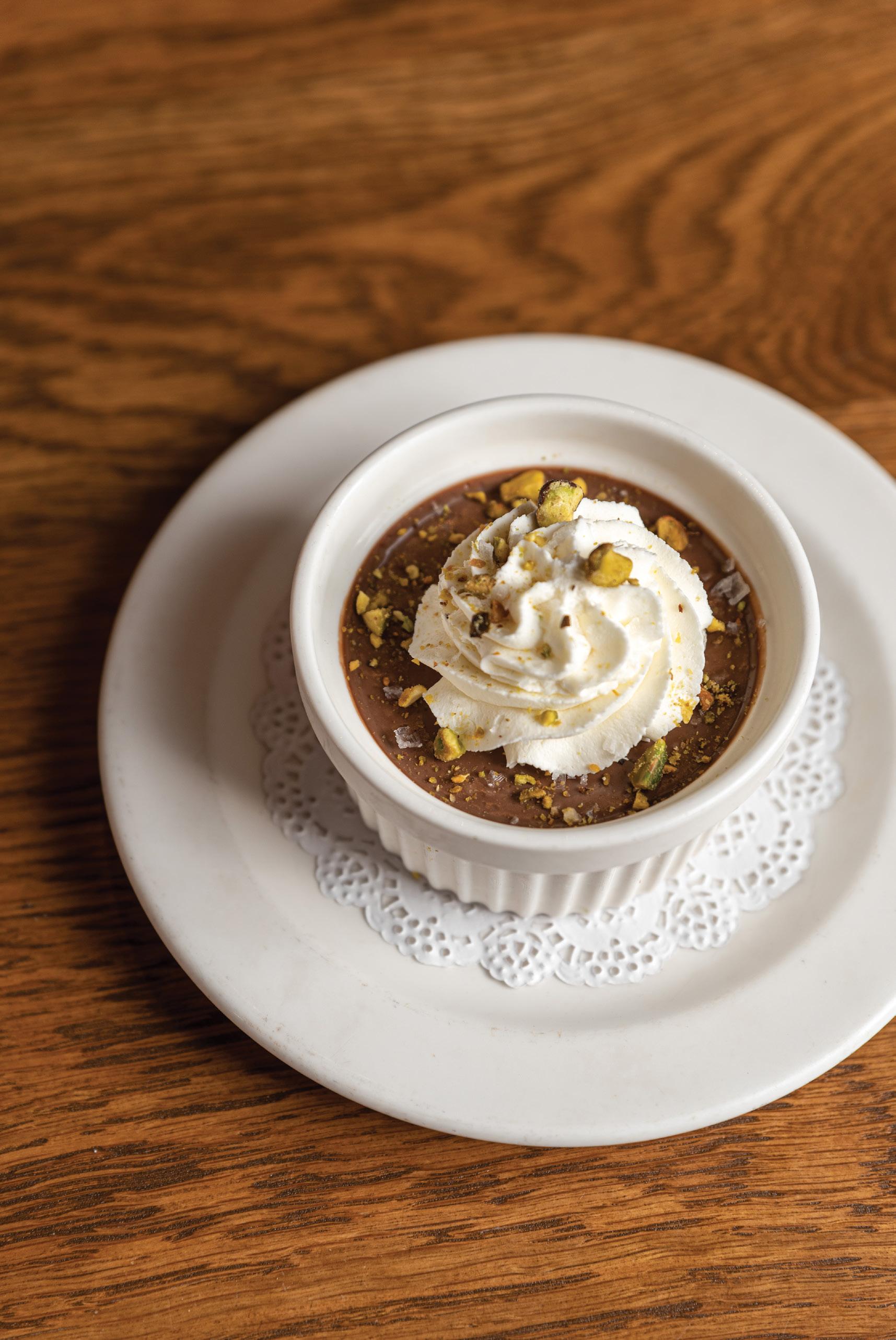 OLIVIA HAYO
OLIVIA HAYO
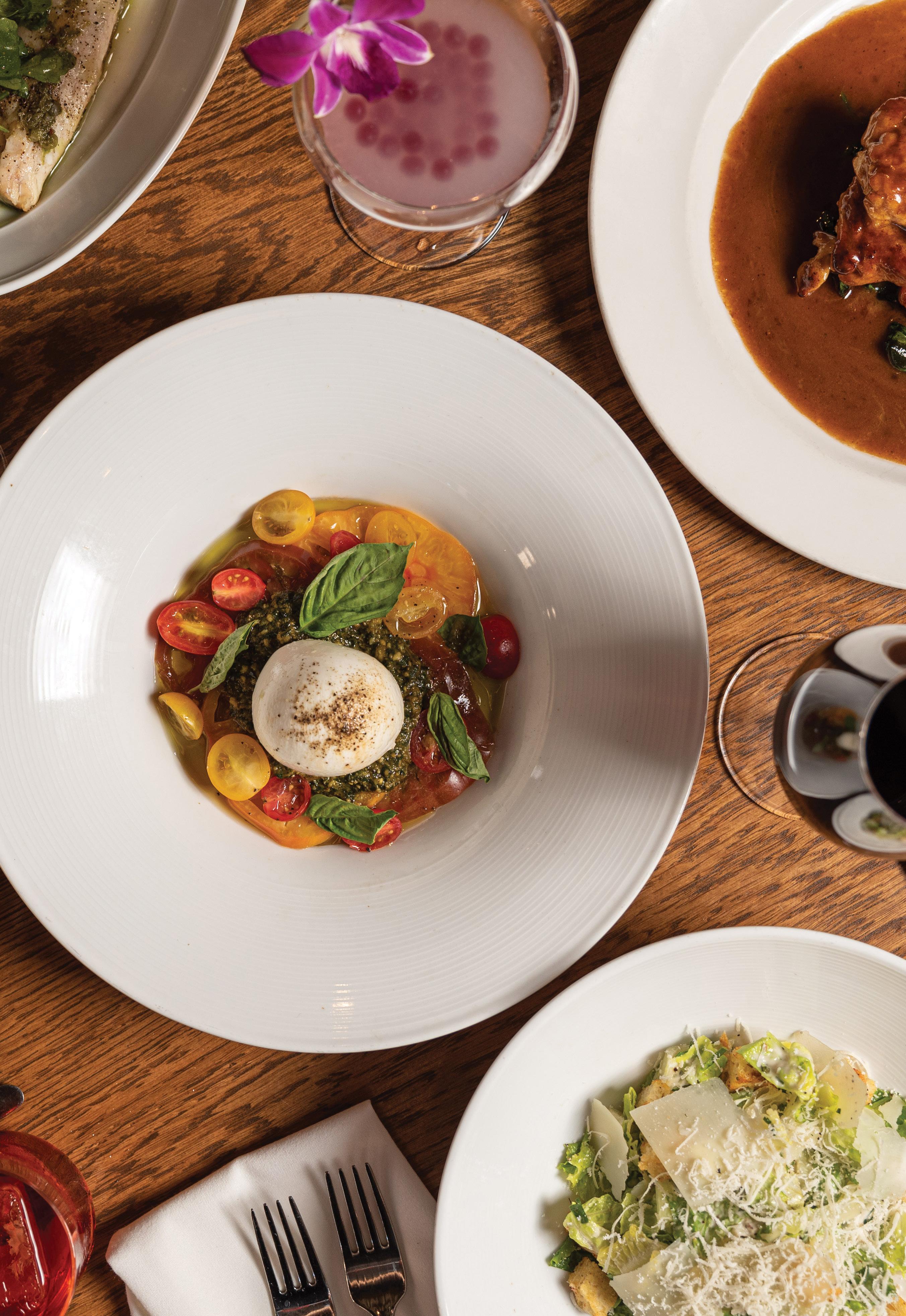 Nutella budino (opposite) and savory Italian dishes at LAVO.
Nutella budino (opposite) and savory Italian dishes at LAVO.
former Searsucker space, Tao Group Hospitality invites you to LAVO—a stylish restaurant and bar serving Cali-Italian cuisine (think: traditional recipes with local, seasonal ingredients). The lofty, light-filled restaurant boasts an open kitchen,
a wraparound bar, olive trees, antique wood floors, luxe banquettes, artwork by Peter Tunney and a sidewalk dining patio. The menu—created by Tao’s chief culinary officer Ralph Scamardella—offers brick-oven pizzas, housemade pastas, old-world wines, inventive cocktails

and a one-pound meat ball. 611 Fifth Ave., Gaslamp Quarter, 619.762.5286
Centered on Italian hearth cooking and chan neling flavors and vibes of the Amalfi coast, Marisi has opened in the former Whisknladle space in the heart of La Jolla Village. The striking indoor/out
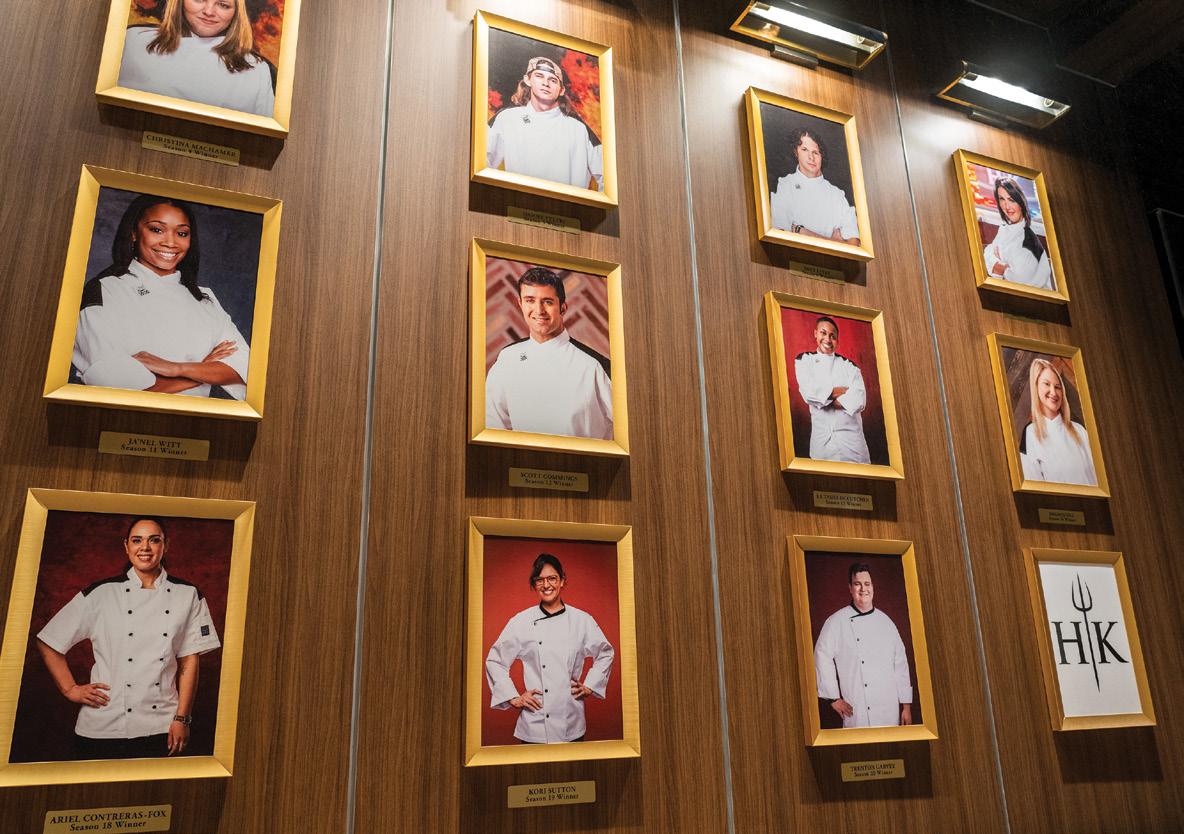
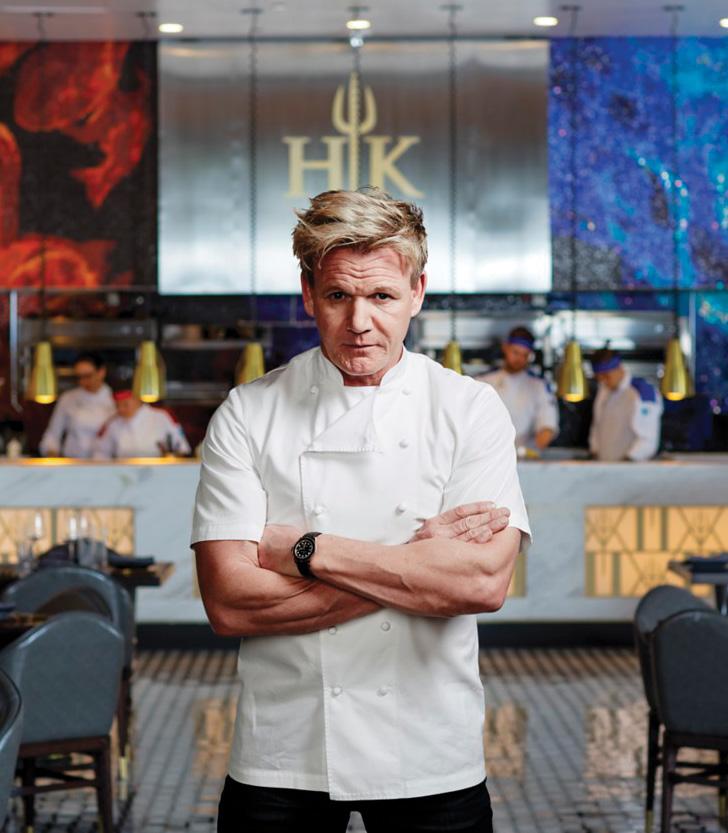
door restaurant features trellis-covered patio dining; an open kitchen anchored by a 10-foot hearth; and intricate, colorful floor tiling. On executive chef Chad Huff's menu: antipasti, handmade pastas, elegant seafood dishes, dry-aged beef and refined desserts.
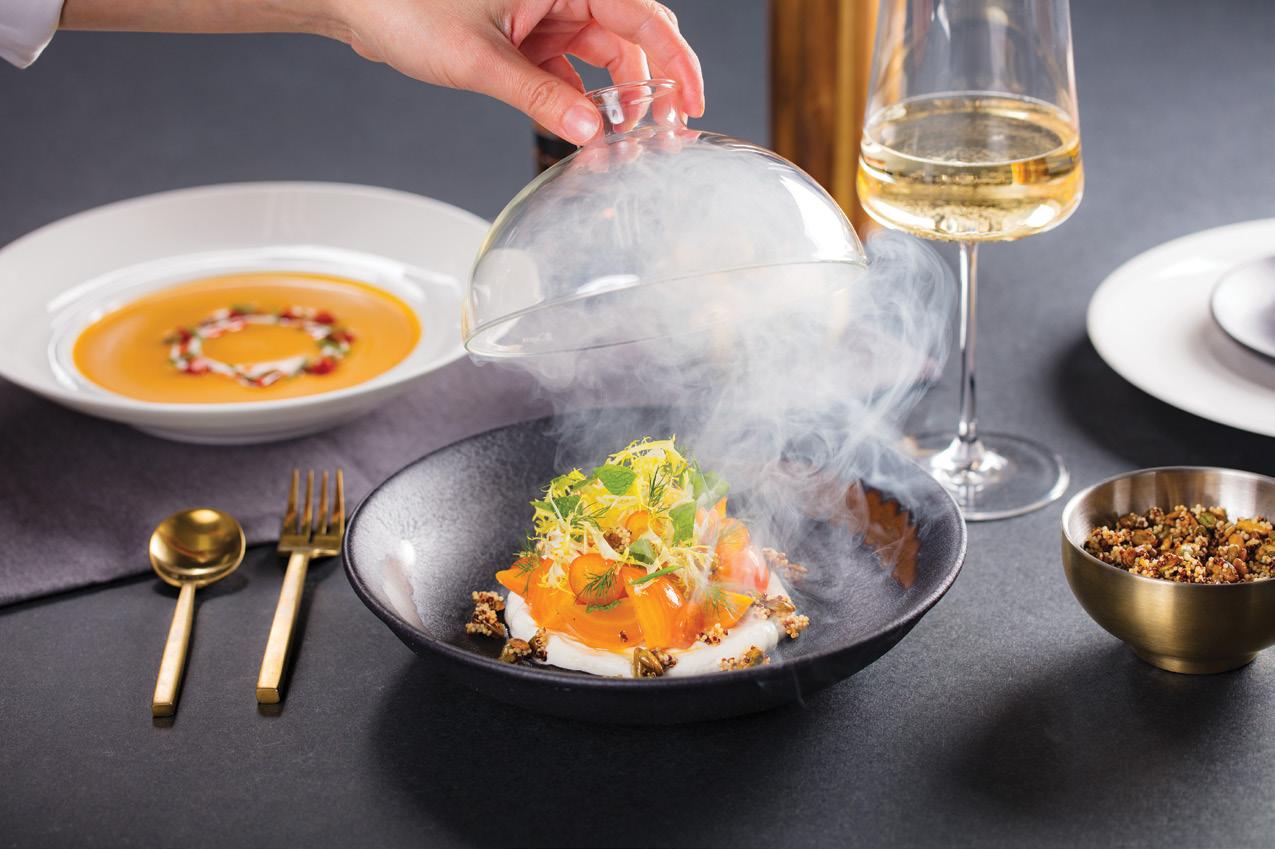 CLOCKWISE FROM TOP LEFT: ZACH CORDNER, COURTESY HELL'S KITCHEN (3)
CLOCKWISE FROM TOP LEFT: ZACH CORDNER, COURTESY HELL'S KITCHEN (3)
Taking over the
Brazilian composer Marcos Balter’s spectacular setting of texts by 20th-Century literary giant Fernando Pessoa. Commissioned for the SD Master Chorale’s 60th Anniversary. Also hear Brahms, Lauridsen, more.
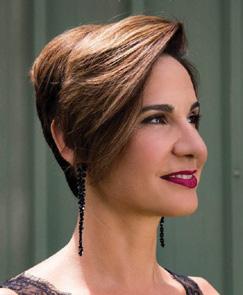
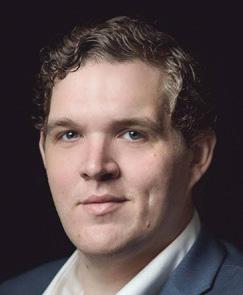
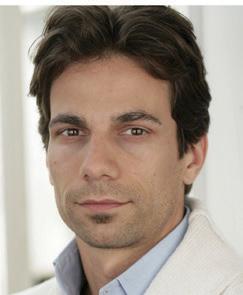
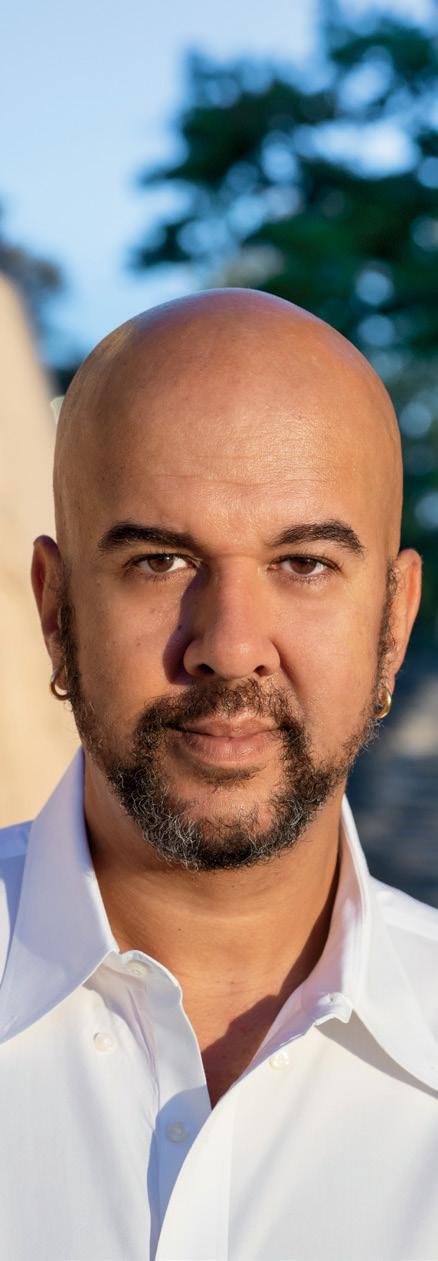
PHAME Performing Arts Center at Patrick Henry High School Sunday, November 6, 2022 Pre-talk 4pm, Concert 5pm
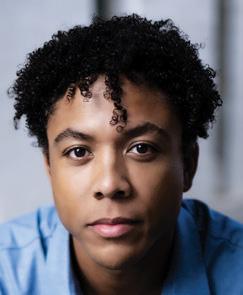
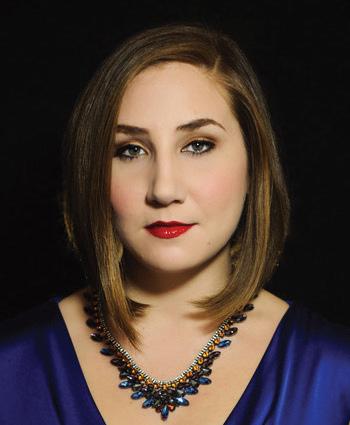

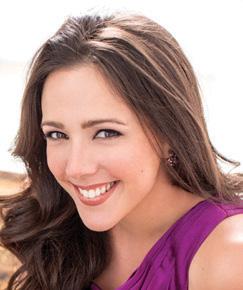
Last year’s sold out! Buy Tickets Now! St. Paul’s Episcopal Cathedral Sunday, December 4, 2022 Festive Refreshments 3pm, Concert 4pm
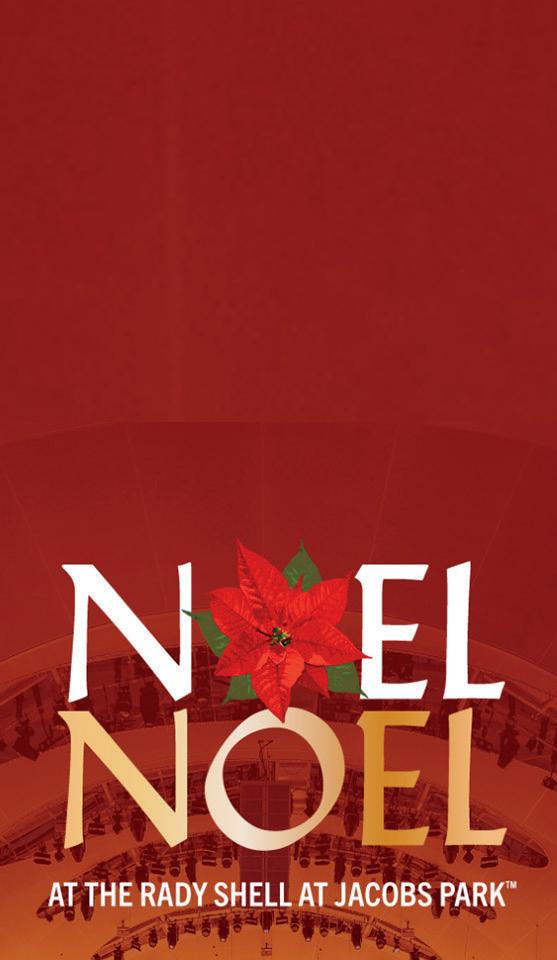
Tickets for these: sdmasterchorale.org Discounts for seniors, students, and active military. Free admission for children 12 and under.
Financial support is provided by the City of San Diego.

Tickets & info:
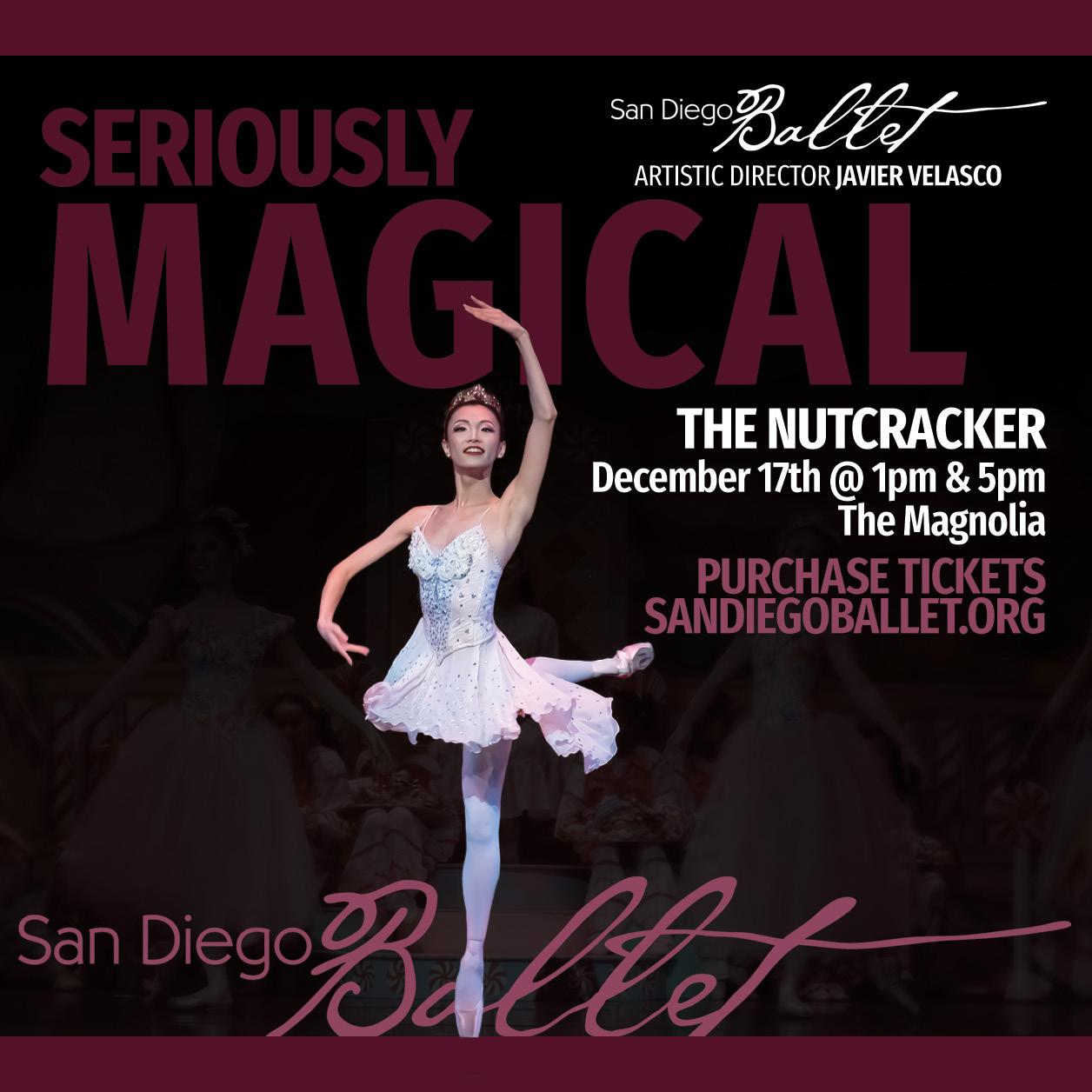
Blow & Henry Purcell October 21-22, 2022
PRAETORIUS CHRISTMAS MASS with Tesserae Baroque December 9-10, 2022
J.S. BACH: ST MATTHEW PASSION March 24-25, 2023
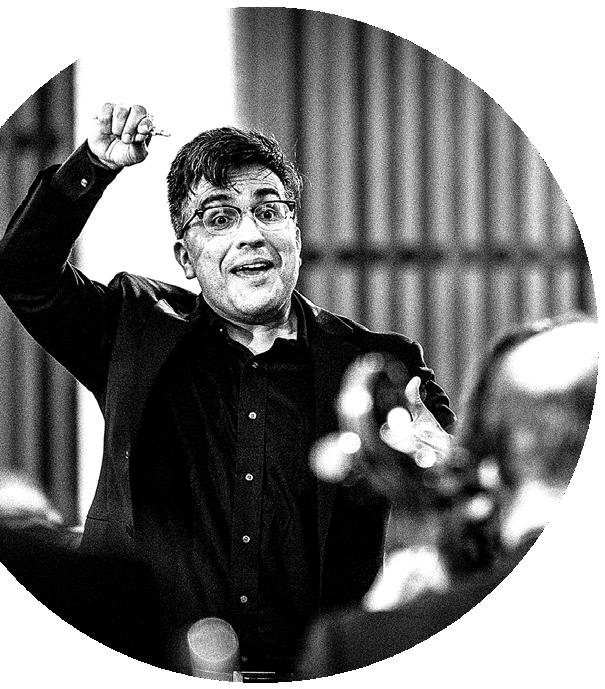
THE ORIGINAL GOLDEN OLDIES May 5-6, 2023
www.bachcollegiumsd.org
Wash it all down with the house-made limoncello or a classic Italian cocktail. (The white negroni is excellent.) 1044 Wall St., La Jolla, 858.401.6787
Uptown hotspot Madison on Park has a new little sister. Welcome to Madi, an adorable all-day cafe with offerings for every speed—from business meetings and quick refuels to leisurely meals. The light, bright neighborhood hangout serves brunch daily; plus lunch, wine and mimosas; and a counter serving pastries and grab-n-go coffee drinks. The menu features griddled carbs (including a 60-year-old family pancake recipe); “Madi Faves” breakfast plates; build-your-own bowls; and lunch fare like the chicken-pesto sando and albacore tuna melt. 3737 Adams Ave., Normal Heights, 619.915.5522
Crown Point is home to a new playground for all things brunch and boozy:
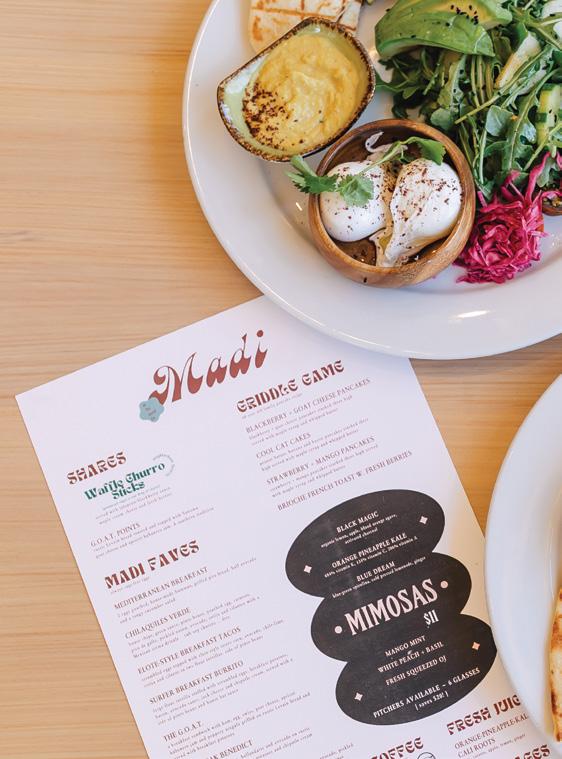
The Hen House. The casual “brunch bar” offers a fun menu of seafood starters, Benedicts, chick en ‘n’ waffles, chilaquiles, wagyu steak ‘n’ eggs, and loco moco. Or indulge in the decadent 24K Omelet with lobster, American wagyu, gruyere and cavi ar; or the pork belly entree with a poached egg, charro beans and chichar ron. To drink, choose from mimosas, bloody marys, punch bowls and specialty cocktails such as the Cap pelletti Creamsicle. 3801 Ingraham St., Pacific Beach, 858.687.5599
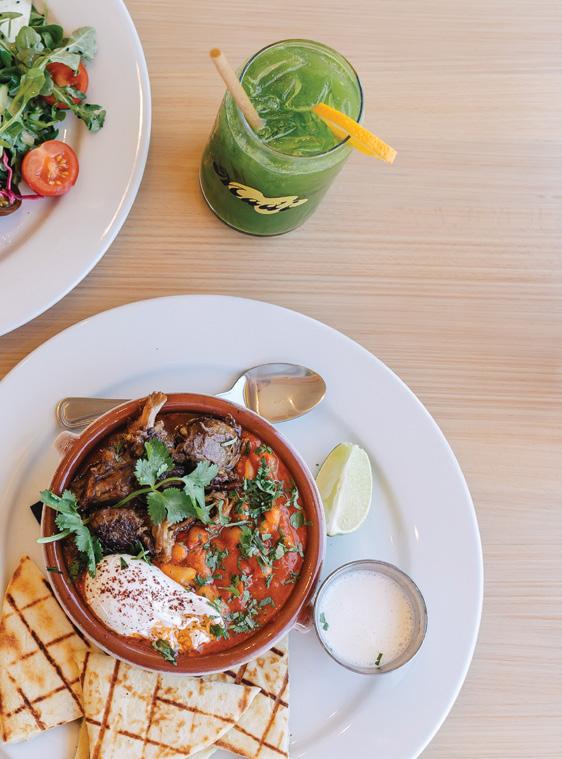
Art and cuisine collide at KNVS (pronounced “canvas”)—an ambitious concept by Kevin Shin. It’s one part art gallery and one part restau rant—where guests can dine on beautifully plated, chef-driven cuisine reflec tive of the artsy space around them. Oceanside local Margaret Alexis Chiaro is the premiere KNVS artist, debuting her

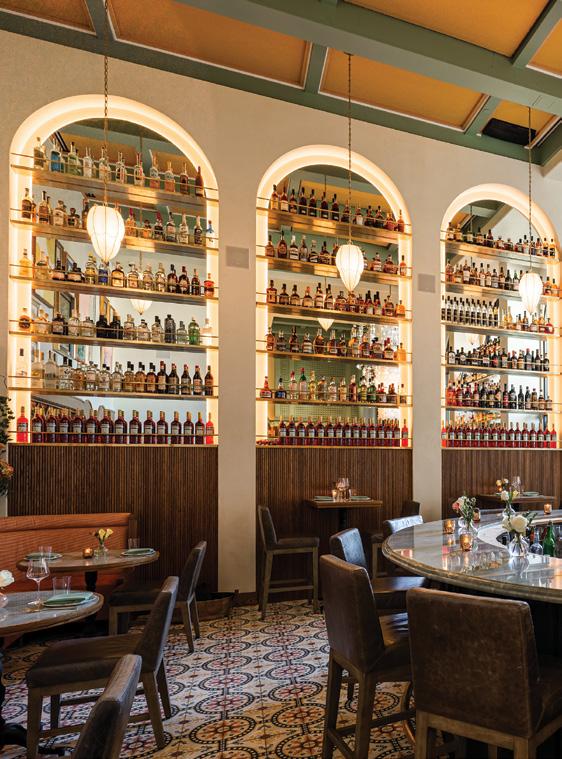
collection: The Floral Guild The menu complements her work with feminine, floral dishes such as the vegan Ratatouille Bouquet and berry-cured salmon; and cocktails like the Love Bush with Jamaican rum. 127 S. Coast Hwy., Oceanside, 442.266.8245
The former Galaxy Taco space in La Jolla Shores has been transformed into Sandpiper Wood-Fired Grill & Oysters—a casualcool oyster bar with benefits. This means a shareable menu of oysters (of course); plus other sea fare such as albacore crudo, steamed mussels and grilled octopus. It also means wood-fire-grilled proteins like the doublecut pork chop, prime rib and squab; small plates that include grilled bone marrow with onion jam; mains such as the houseground burger and sweetpotato gnocchi; and ba nana pudding for dessert.
2259 Avenida de la Playa, La Jolla, 858.228.5655


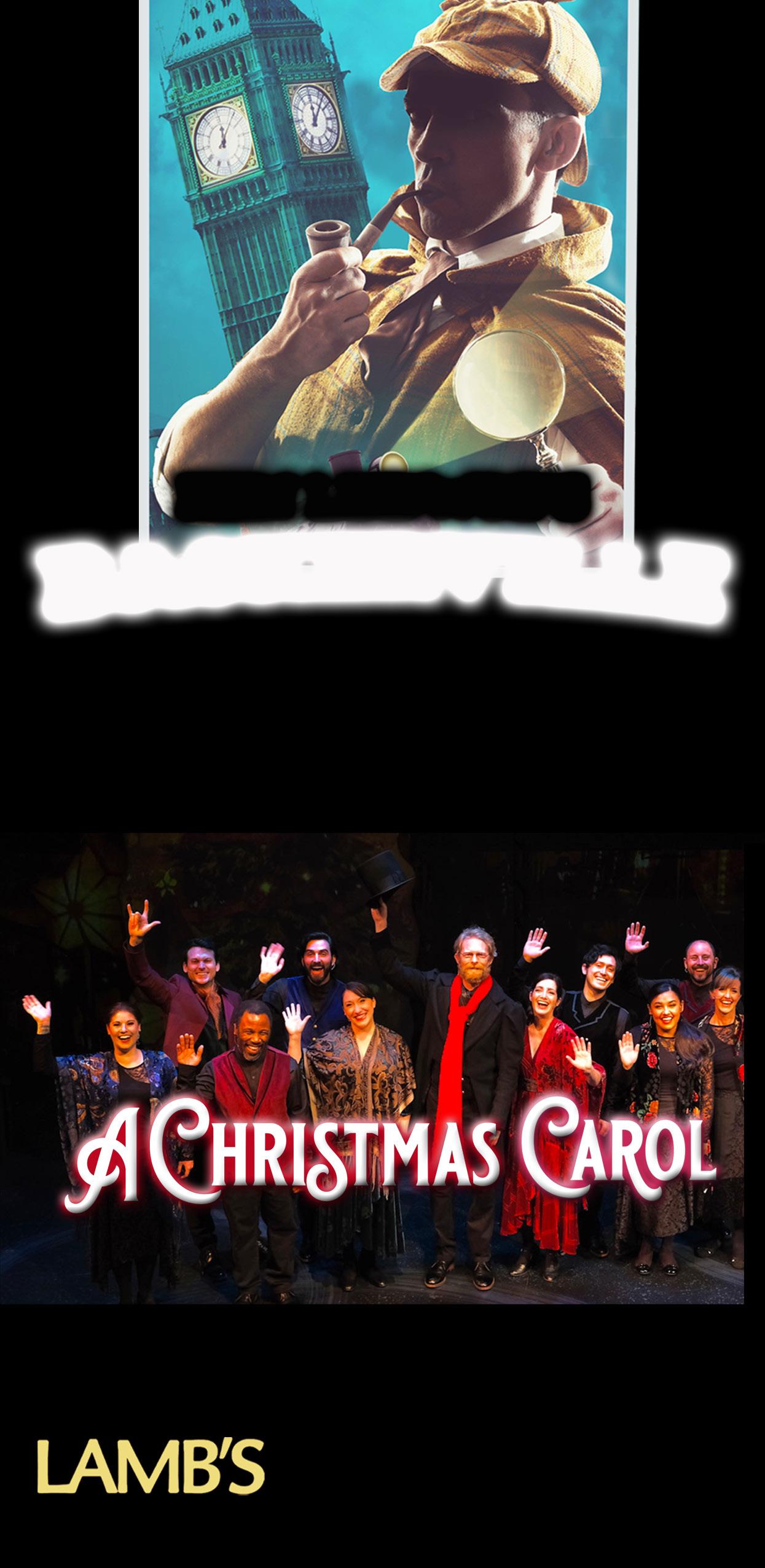
When the same minds behind Kindred—South Park’s den of stellar cocktails, vegan fare and death-metal tunes—open a new watering hole, you just know it’s going to be weird in the coolest way. And Mothership doesn’t disappoint. The “tropical space adventure” feels like an ‘80s rocket ship voyage to an alien planet—complete with shooting stars and outof-this-world cocktails. The “Base Camp Protocol of Food & Drink” (i.e., the menu) features liba tions named Forbidden Frequency and Away Mission; plus creative vegan dishes with simple names like "Noodle" and "Potato." 2310 30th St., South Park, 619.630.2187


In Carlsbad Village, sushi bar Sushi Taisho invites diners to “Seas the Day.” Owned by husbandand-wife duo, Misun Yoon and chef Brian Yoon, the eatery—a modern, green-accented space
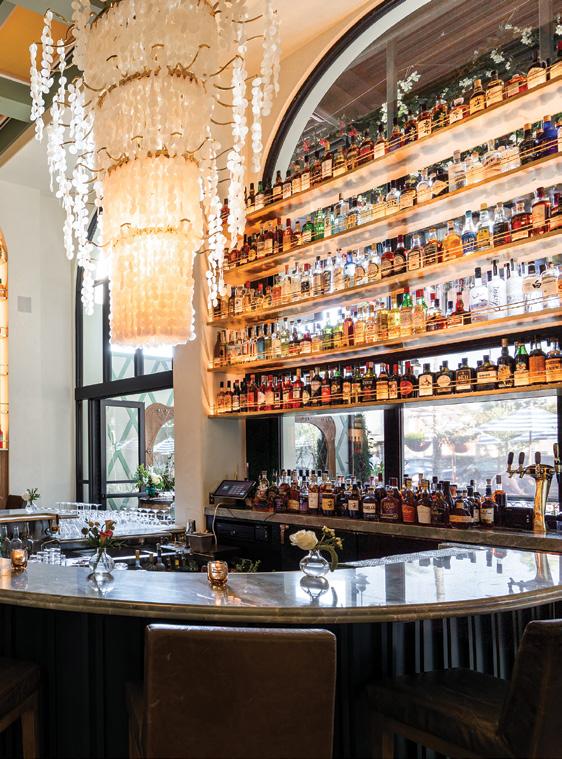
with a summer cottagestyle exterior—offers both classic sushi and creative Japanese-fusion fare. Choose from traditional nigiri, sashimi and hand rolls; signature rolls like the Marilyn Mon-Roll and Super Mario Roll; plus contemporary dishes such as the five-piece Albacore Temptation and Hello-Tail Carpaccio. To drink: sake, wine and beer. 300 Carls bad Village Drive, Suite 214, Carlsbad, 760.994.0095


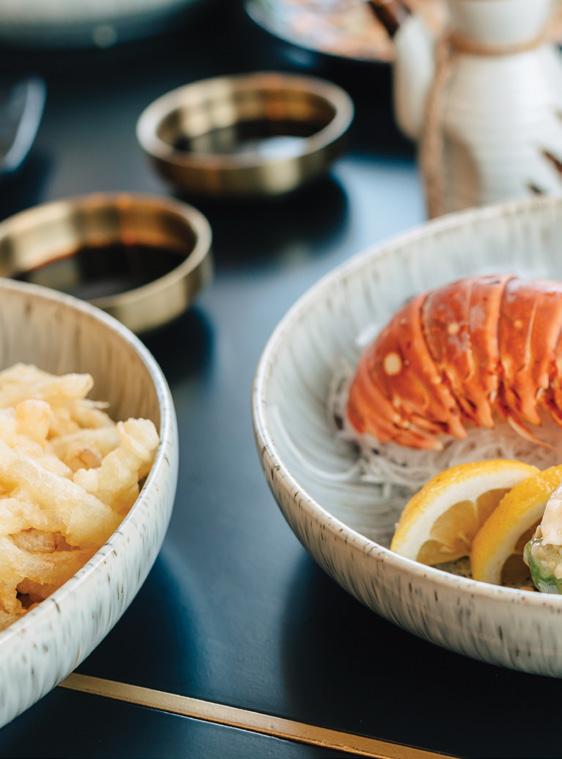
Inspired by the TV series of the same name, Hell’s Kitchen has opened its first California loca tion at Harrah’s Resort Southern California. Helmed by celebrity chef Gordon Ramsay—the notoriously tough host of the competitive cooking show—the 11,360-squarefoot restaurant and bar is stunning. Features include an exhibition kitchen, a posh lounge, a wine wall and two private dining rooms. On the menu: Ramsay’s famous Beef











































































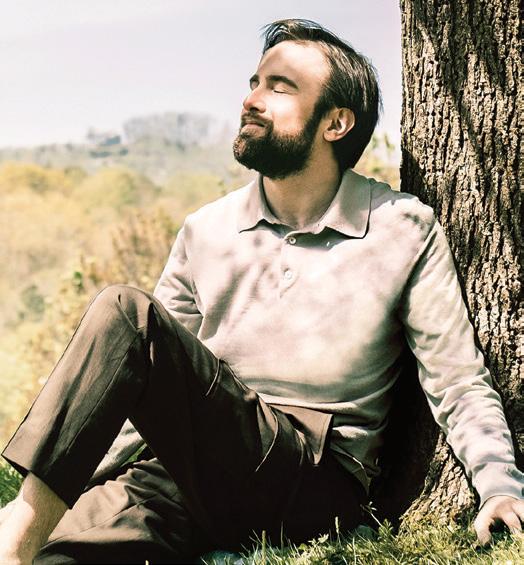
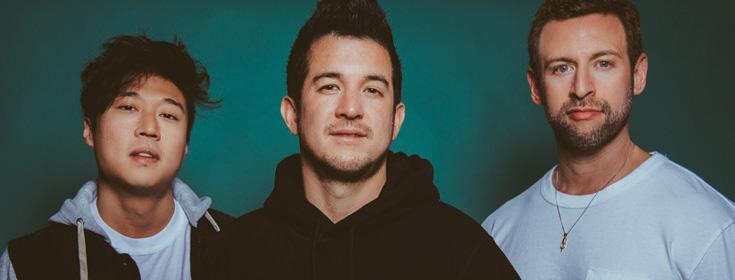
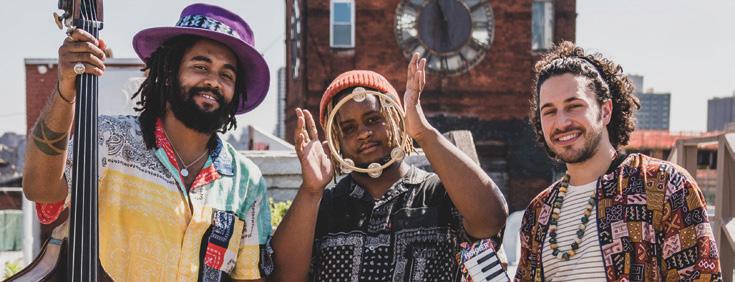
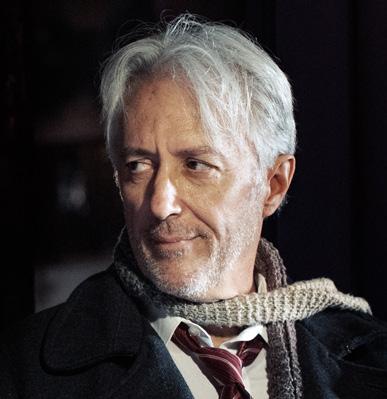
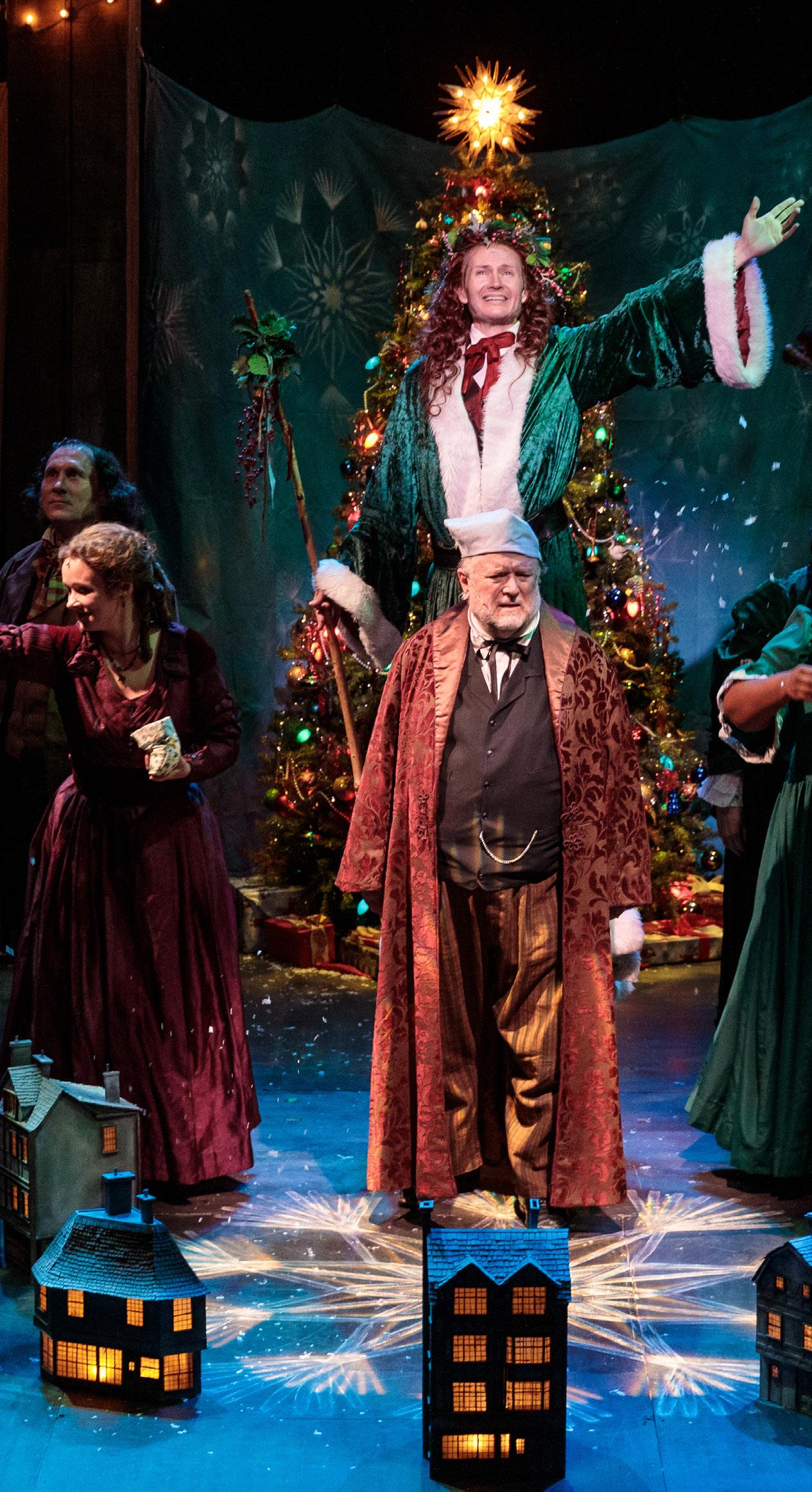
Wellington and sticky tof fee pudding; plus wagyu meatballs, lobster risotto, crispy-skin salmon and specialty cocktails. 777 S. Resort Drive, Valley Center, 760.751.3100
Nestled in Carlsbad Village, Fresco Cocina is a casual-chic outpost that pays homage to modern Latin cuisine. Executive chef Chris Idso’s eclectic menu features roasted poblano cornbread; Peruvian ceviche; braisedshort-rib empanadas; street tacos; roasted Chilean seabass pibil; Brazilian churrasco (prime skirt steak); a Uruguayan chivito sandwich with braised pork shoulder and Black Forest ham; and much more. To imbibe, choose from an extensive inventory of rums, tequilas and Latin Americaninspired specialty cock tails. Grab a seat at the marbled-jade bar or on the quaint dining porch. 2858 Carlsbad Blvd., Carlsbad, 442.333.9321
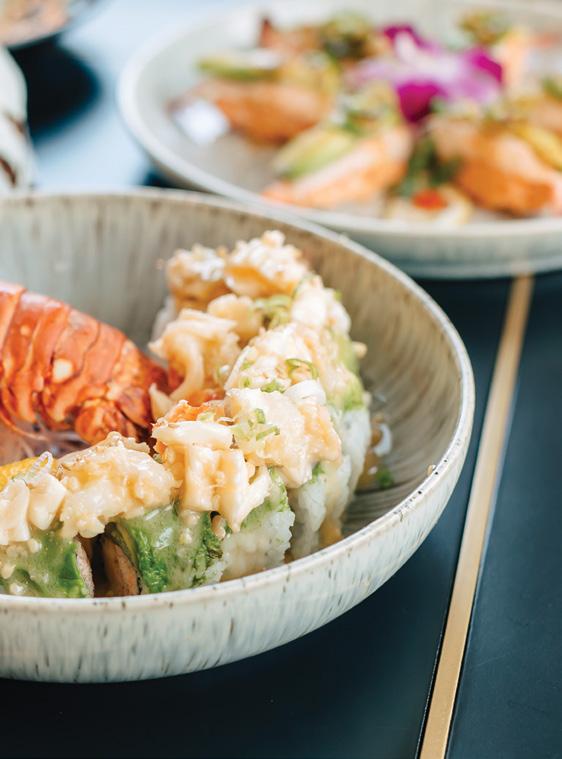
“This beautiful and mov ing work was introduced to me by my longtime collaborator and friend, Diana DuMelle, co-founder of Bodhi Tree Concerts. NYCO is excited to be able to include several members of the Bodhi Tree production in our new production in New York.”
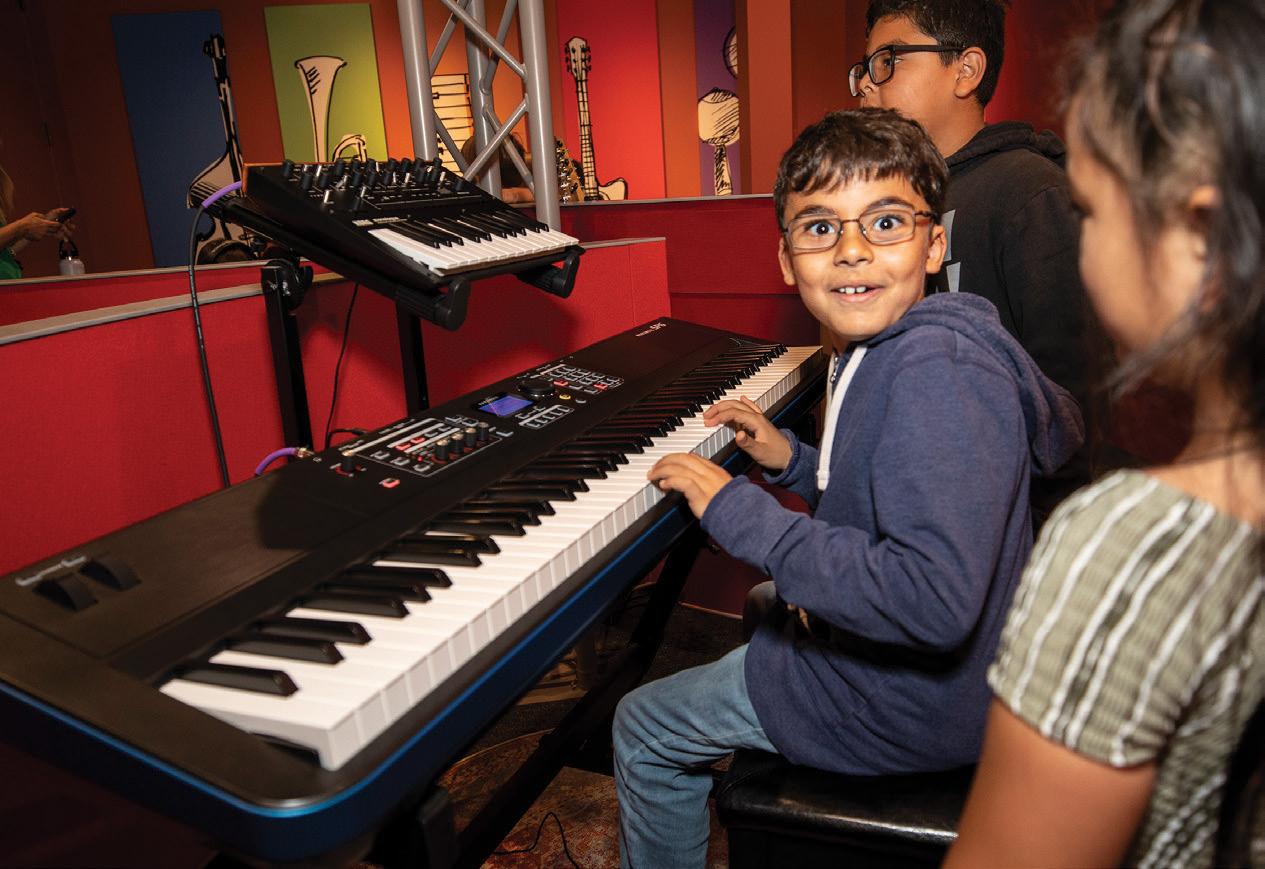

war is powerful; and news of soldiers fraternizing across enemy lines would put a human face on the Germans, and readily undermine public support for the war.”
“All Is Calm tells a story in which sworn enemies found common human ity,” says Diana DuMelle. “Despite orders from above, the combatants called their own unofficial truce, decided to stop fighting, tried to under stand one another, and in the process learned they were more alike than they were different. Truly a story for our time.”
Rothstein says he is interested in creating performances where the content dictates the form.
“In the creative process, I continually ask myself: ‘If the characters were left to their own devices, how would they tell their story? What language, what tools were avail able to them?’ The music
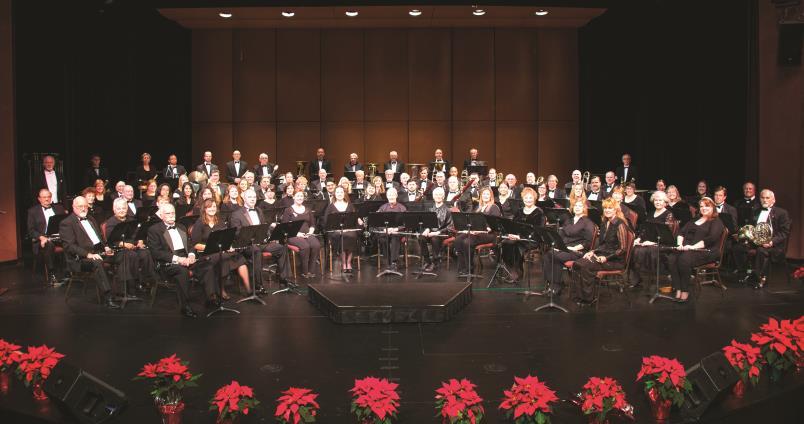
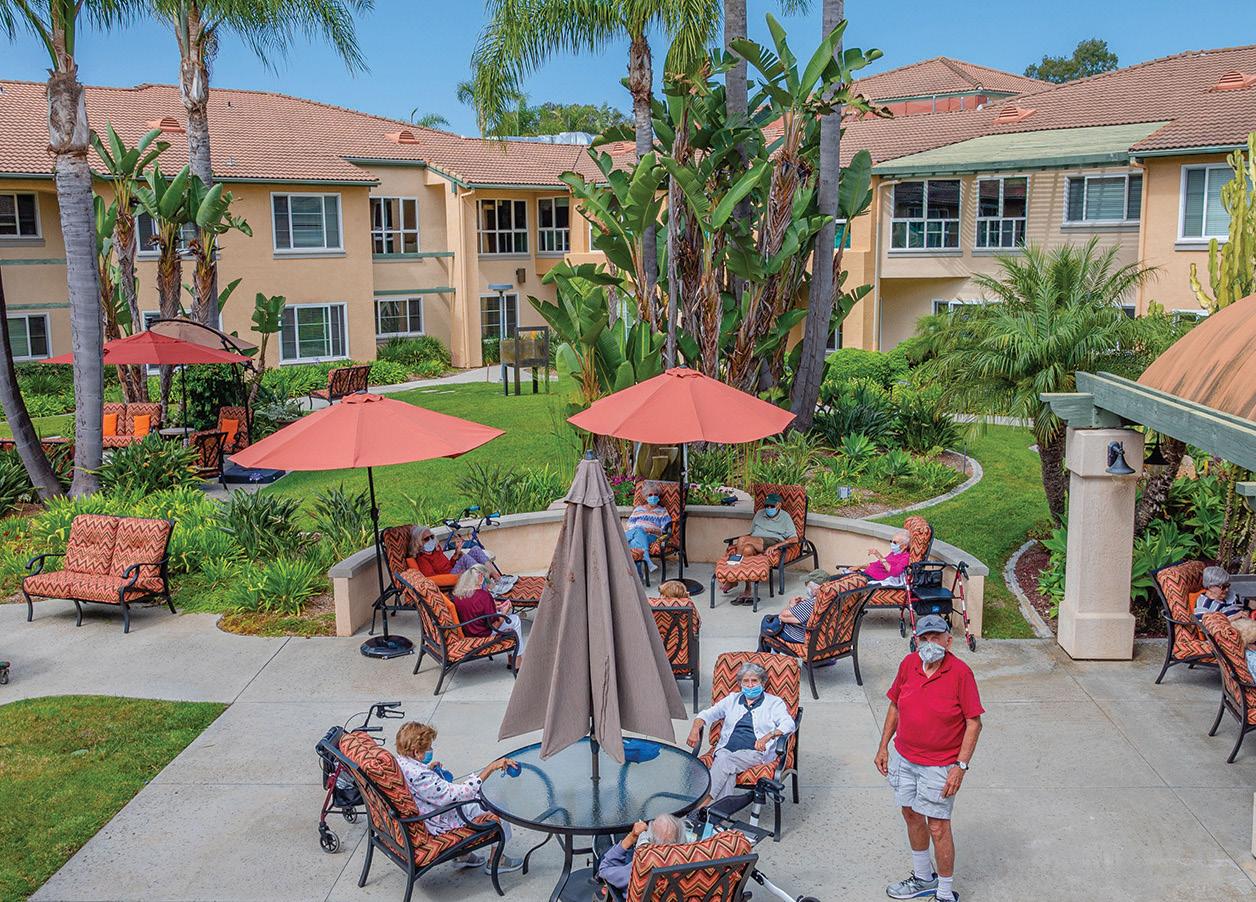
ranges from trench songs to sentimental and patriotic tunes; as well as Christmas music from the participating countries. The text is taken from a wide range of sources, including letters, journals, official war documents, poetry, gravestone inscrip tions … even an old radio broadcast.”
The DuMelles, who previously lived and worked in New York City for a decade, have a long standing relationship with Michael Capasso, general director of New York City Opera (NYCO). Both have performed with NYCO before, Walter onstage as a bass in La traviata and Diana as stage manager— including for NYCO’s recent world premiere of American composer Ricky Ian Gordon’s opera: The Garden of the Finzi-Continis Capasso heard about All Is Calm’s success in San Diego and asked to see a video of it. The result? An NYC run this December.
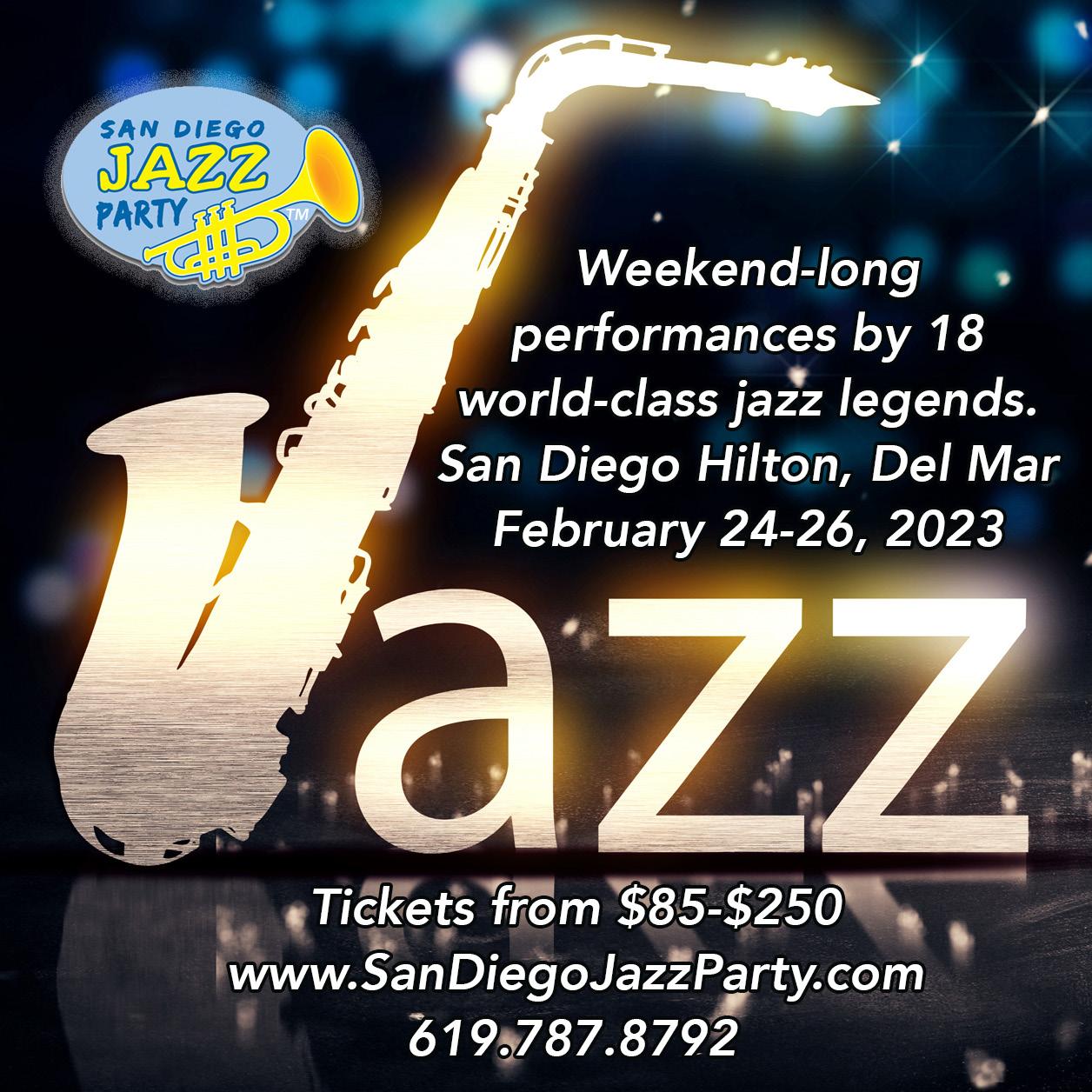
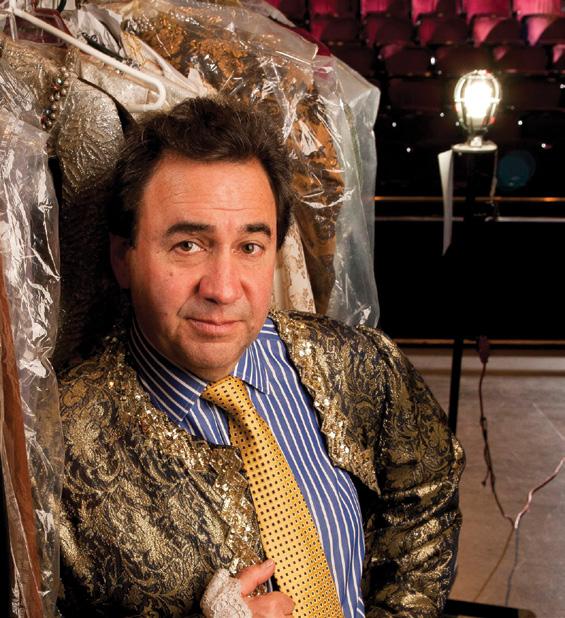
“New York City Opera is thrilled to be presenting the [NYCO] premiere of All Is Calm beginning Dec. 7,” Capasso says. “This beautiful and moving work was introduced to me by my longtime collaborator and friend, Diana DuMelle, co-founder of Bodhi Tree Concerts. NYCO is excited to be able to include several members of the Bodhi Tree production in our new production in New York.”

In fact, in a real trib ute to the quality of San Diego’s talent pool, five singers and three artistic staffers—who have been involved with Bodhi Tree Concerts’ All Is Calm since its first performances— will travel to New York for the production. Joining Juan Carlos Acosta, con ductor and music director, along with stage manager Diana DuMelle, are dialect coach Vanessa Dinning; tenor Timmy Simpson; baritones Michael Sokol and Andrew Konopak; and
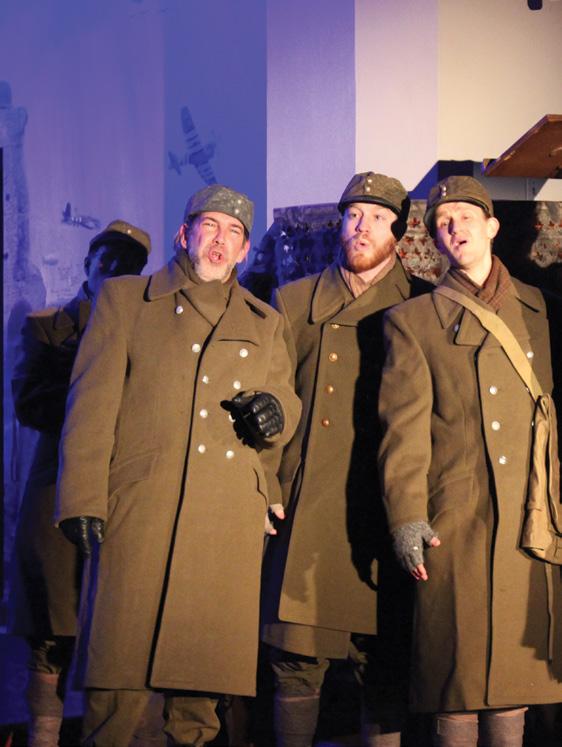
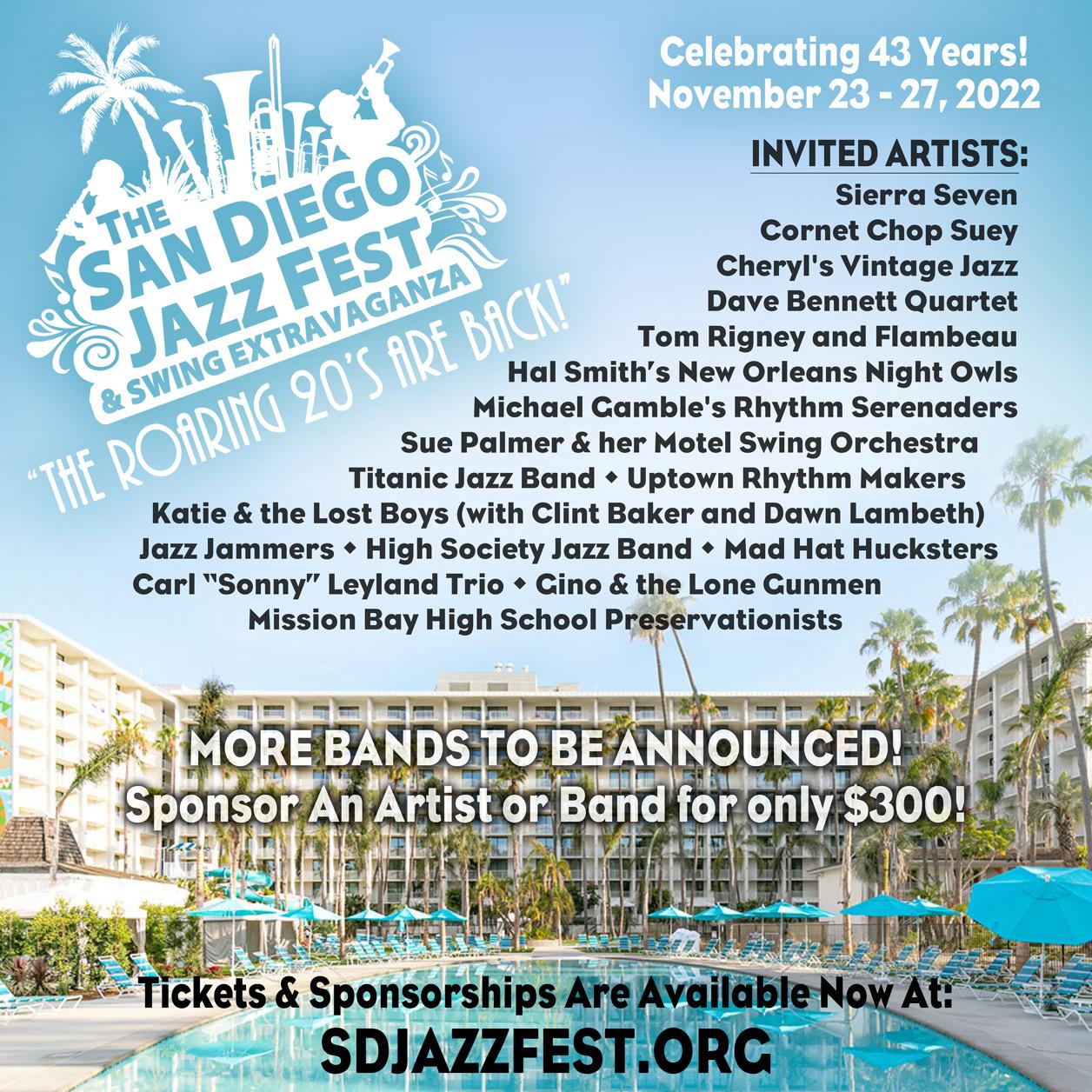
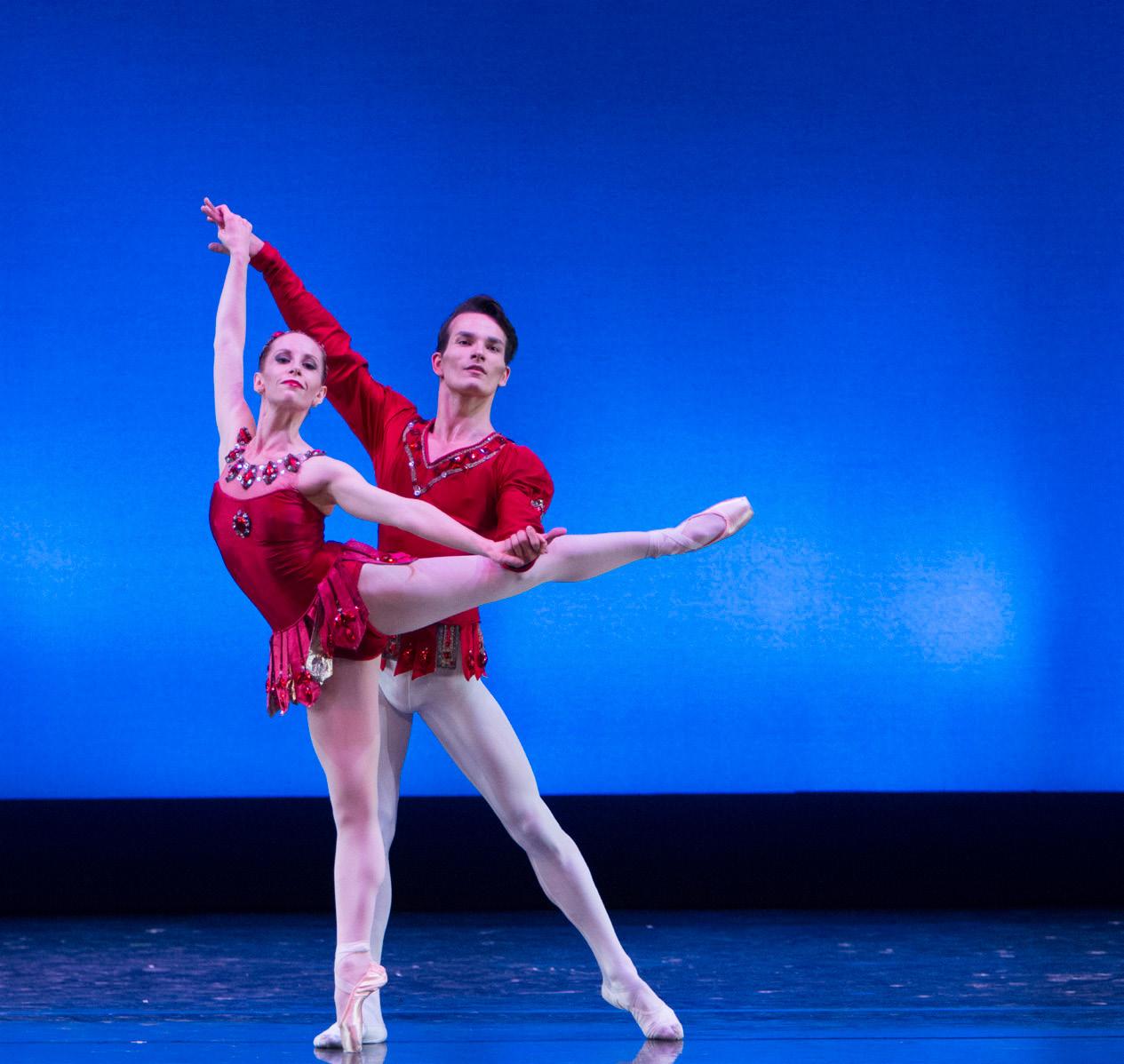
basses Walter DuMelle and Shelby Condray. Stage directing will be veteran Broadway director and choreographer Richard Stafford. The NYCO per formances are on Dec. 7, 10 (two shows) and 11.
“Walter and I are excited and proud to bring members of our own Bodhi Tree Concerts pro duction to New York City Opera,” Diana DuMelle says. “Introducing a whole new audience to the powerful true story of Is Calm is an honor, and creating this opportunity for our local artists is a true manifestation of our mission to serve San Diego-based artists.”

Before its NYCO premiere, The Christmas Truce of 1914 will be performed in San Diego, Nov. 11-13, at St. James by-the-Sea Episcopal Church (743 Prospect St., La Jolla).
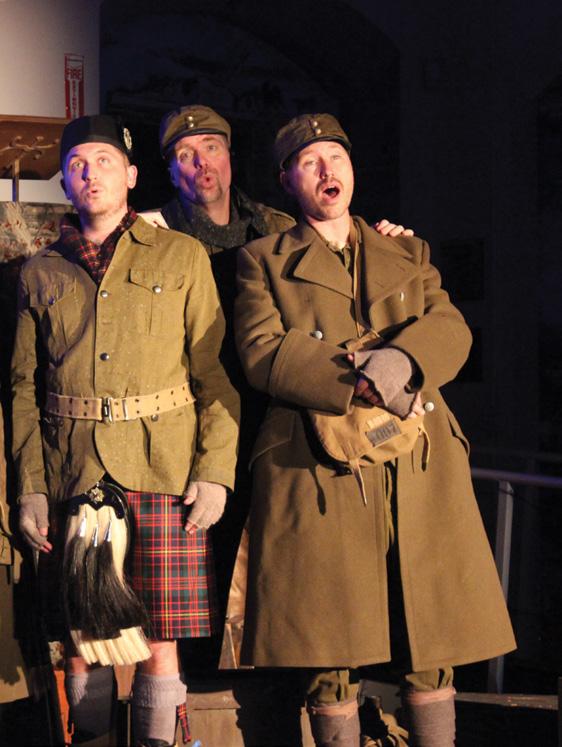







For tickets and more info: bodhitreeconcerts.org






B Y L U C Y K I R K W O O D
R O M B R O A D W A Y T O S A N D I E G O M O X I E T H E A T R E P R E S
N T S
C O M P L E T
Y S U C C
S S
C O
T H R
R
G
H
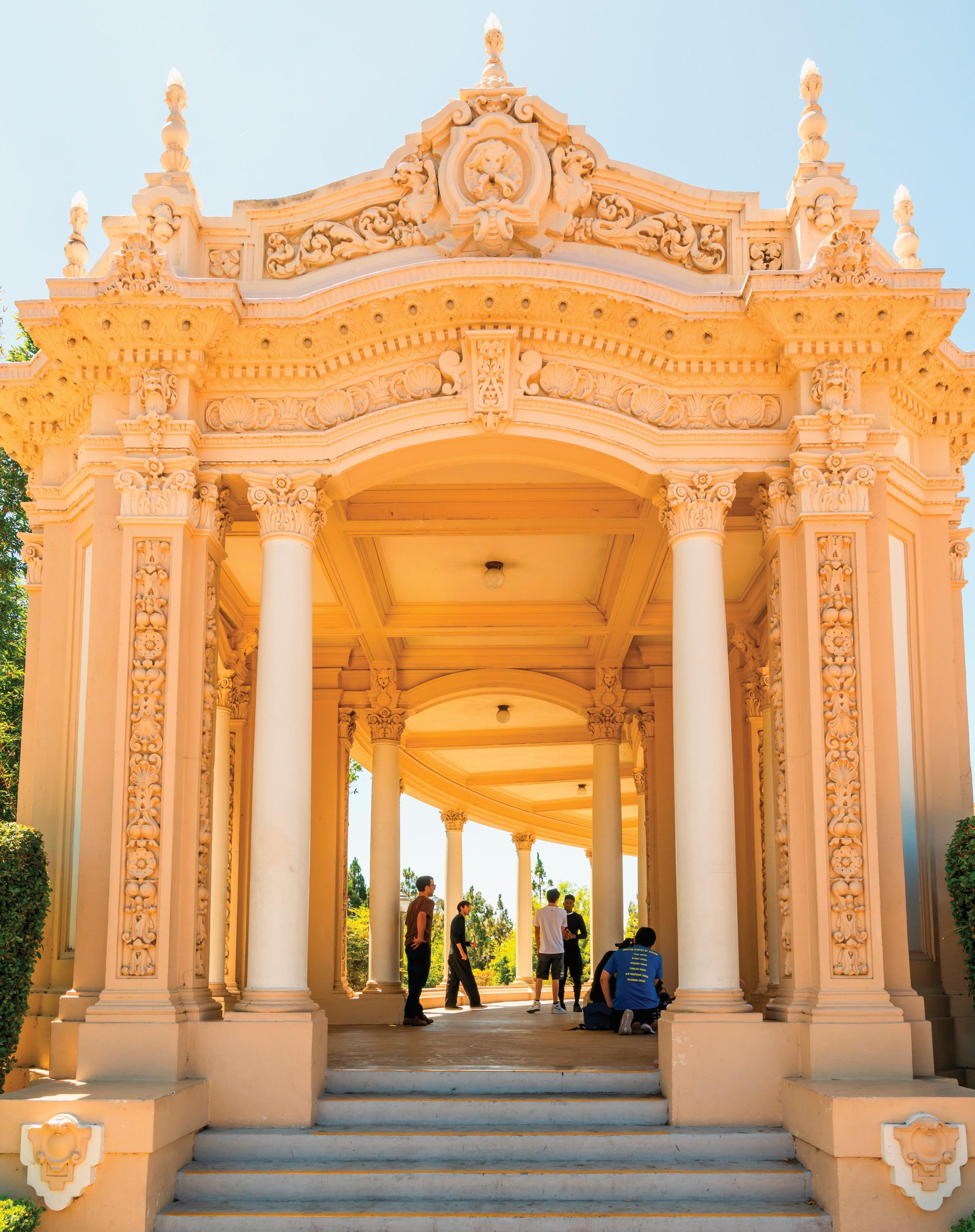 ©
©
